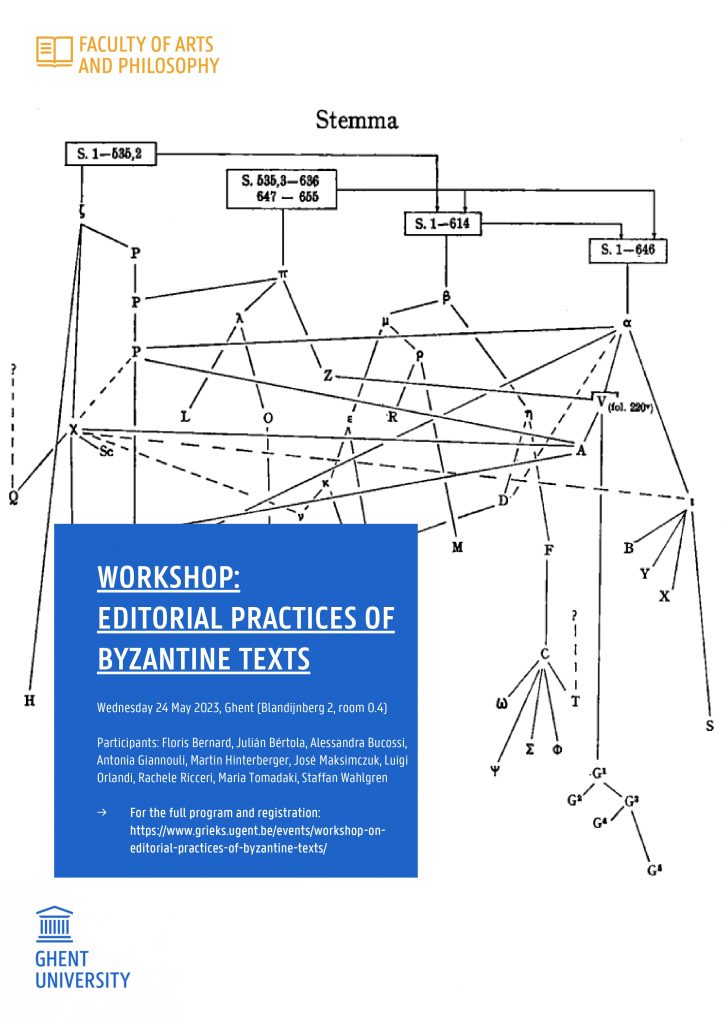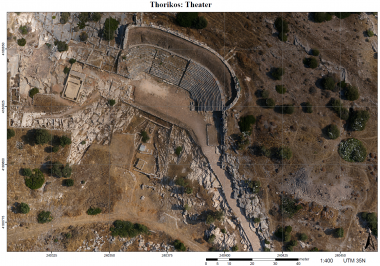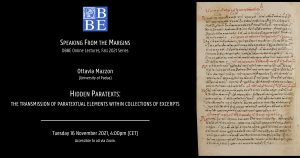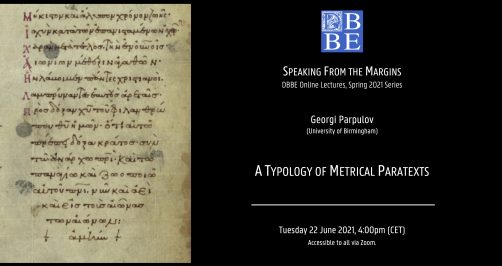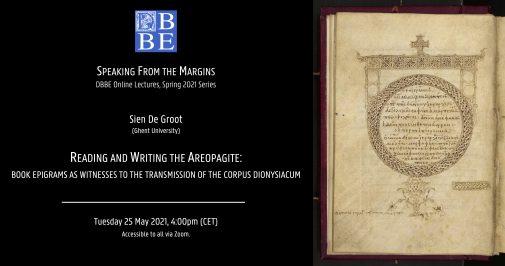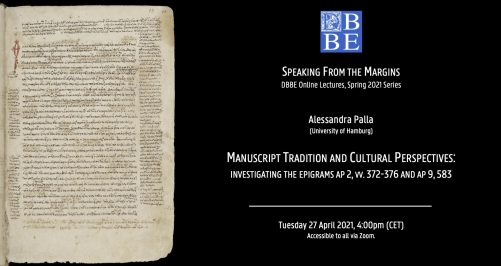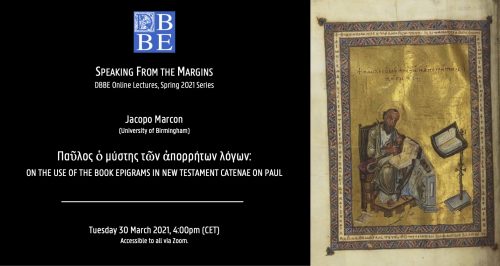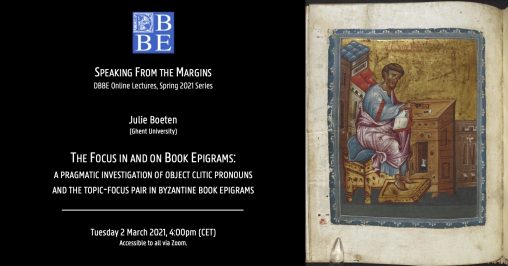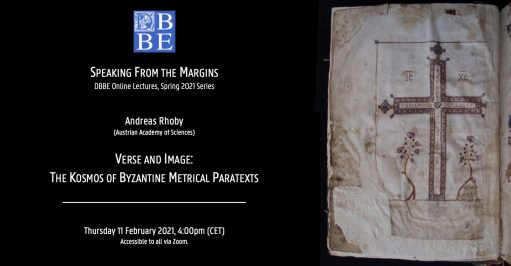-
Woe04Jun202519:30zaal FORUM in het GUM (Ledeganckstraat 35, Gent)
Boekvoorstelling: ‘Leidraad door het labyrint: de macht van klassieke mythen in onzekere tijden’ (Evelien Bracke)
Boekvoorstelling, Griekenlandcentrum, publiek evenementToon detailsEvelien Bracke, Academia Press en het Griekenlandcentrum nodigen u van harte uit voor de boekvoorstelling van 'Leidraad door het labyrint' op 4 juni in GUM & Plantentuin.
Programma
19u00 Welkom
19u30 Boekvoorstelling
- Voorwoord & overhandiging eerste exemplaar, Beatrice De Keyzer (uitgever)
- Verwelkoming door decaan Gita Deneckere
- Intro door Jacqueline Klooster (Rijksuniversiteit Groningen)
- Gesprek Evelien Bracke & Patrick De Rynck (Hic et Nunc)
20u30 Receptie + mogelijkheid om boek te kopen
21u30 Einde
Over het boek
Oude verhalen, nieuwe inzichten: klassieke mythen als gids voor de maatschappelijke uitdagingen van vandaag
Klassieke mythen zoals die van Achilles, Medea en Persephone zijn alomtegenwoordig, van films en boeken tot sociale media en games. Maar wat maakt deze eeuwenoude verhalen zo tijdloos? Waarom blijven ze zo fascineren, ook nu, in een tijd van razendsnelle technologische vooruitgang, geopolitieke chaos en een klimaatcrisis?
Leidraad door het labyrint onderzoekt hoe klassieke mythen, ondanks hun eeuwenoude oorsprong, verrassend relevant blijven in onzekere tijden. Ze bieden houvast bij hedendaagse politieke, technologische en ecologische vraagstukken en helpen de complexe uitdagingen van onze tijd begrijpen. Ze wijzen de weg door het labyrint van deze debatten en laten zien hoe je inspiratie kunt halen uit het verleden voor een betere toekomst.
'Mythen zijn tijdloos, hoor je wel eens beweren. Nee, mythen zijn van onze tijd, ook de Griekse. Ze zorgen mee voor zingeving in wankele tijden. Dat is wat Evelien Bracke in dit fascinerende, rijk gedocumenteerde, verrassend actuele en zeer overtuigende boek laat zien.' (Patrick De Rynck, classicus en auteur)
'In dit helder opgezette boek onthult Evelien Bracke de volle rijkdom van een zowel gekoesterde als verguisde mythologische traditie. De verhalen bestaan in vele versies, maar blijken een onuitputtelijk betekenispotentieel te hebben. Daarom worden existentiële en politieke dilemma's tot op vandaag geïllustreerd met Griekse mythen, die in Brackes subtiele interpretaties vaak meer vragen oproepen dan op het eerste gezicht lijkt.' (Piet Gerbrandy, dichter, classicus en docent)
Praktische informatie
Wanneer? woensdag 4 juni 2025, om 19u30
Waar? zaal FORUM in het GUM (Karel Lodewijk Ledeganckstraat 35, Gent)
Inschrijven? Vooraf registreren is verplicht via deze link.
i.s.m. Academia Press
-
Din27Mei2025Woe28Mei202509:30Ghent & Brussels (Belgium)
Crash Course in Greek Palaeography
OIKOS, workshopToon detailsThe Greek section of Ghent University, in collaboration with the Research School OIKOS and the Royal Library of Belgium, offers a two-day crash course in Greek palaeography. The course will take place on 27-28 May 2025 in Ghent and Brussels. It is intended for MA, ResMA and doctoral students in Classics, Ancient History, Ancient Civilizations, Byzantine studies, Medieval studies and related fields. Students must have a good command of Greek. The course offers an introduction into Greek palaeography from the Hellenistic period to the end of the Middle Ages and is specifically aimed at acquiring practical skills for research involving literary and documentary papyri and/or manuscripts. Participants will gain hands-on experience with original papyri housed at Ghent University Library and with manuscripts from the Royal Library of Belgium in Brussels.
Programme
The course will take place over two full days, with one session in Ghent on Tuesday, 27 May, and the other in Brussels on Wednesday, 28 May. Specialists in Greek palaeography will deliver lectures providing a chronological overview of the evolution of Greek handwriting, accompanied by introductions into the material features of both papyri and codices. The lectures will be followed by practical sessions, consisting of supervised reading of selected extracts from papyri and manuscripts in small groups. There will be guided exhibitions of selected papyri (in Ghent) and medieval manuscripts (in Brussels).
Tuesday, 27 May 2025
09:30-10:00 Introduction to the Crash Course
10:00-10:30 Introduction to papyrology and the materiality of papyri – Dr. Serena Causo
10:30-11:45 Papyri of the Ptolemaic and Roman period – Dr. Joanne Stolk
11:45-13:00 Practice with papyri of the Ptolemaic and Roman period
13:00-14:00 Lunch break
14:00-14:30 Presentation of papyri from the collection of the Ghent University Library – Dr. Serena Causo
14:30-15:45 Papyri of the Byzantine period – Dr. Yasmine Amory
15:45-17:00 Practice with papyri of the Byzantine period
18:30 Dinner in Ghent (optional)Wednesday, 28 May 2025
09:30-10:00 Introduction to the codicology of the Byzantine book – Dr. Grigory Vorobyev
10:00-10:30 Display moment 1
10:30-10:45 Coffee break
10:45-12:00 Byzantine book scripts 1: From the first codices to the eleventh century – Prof. dr. Floris Bernard
12:00-13:00 Reading practice 1
13:00-14:00 Lunch break
14:00-15:15 Byzantine book scripts 2: The Comnenian and Palaeologan periods – Prof. dr. Andrea Cuomo
15:15-15:45 Display moment 2
15:45-16:45 Reading practice 2The teaching staff also includes Kyriaki Giannikou, Dr. Juan Bautista Juan-López, Eleonora Lauro, Dr. Divna Manolova and Dr. Chiara Monaco.
Practical information
The study load is equivalent to 2 ECTS credits (2×28 hours). In preparation for the course, participants will be required to read secondary literature which will be distributed several weeks in advance. Additional materials will be provided in order to help develop further reading skills after the course.
There is no participation fee for this course. Lunches will be provided on both days free of charge. Travel and accommodation expenses are the responsibility of the participants. The train connection between Ghent Sint-Pieters Station and Brussels Central Station is frequent, with a travel time of less than 40 minutes. Participants may choose to lodge in either city.
The course will take place at the following venues:
Registration
Prospective participants should register by sending an e-mail to grigory.vorobyev@ugent.be with a short motivation letter (approximately 300 words), detailing their academic background, research interests and motivation for attending the course. Priority will be given to MA and doctoral students associated with OIKOS and those who have not previously had the opportunity to study palaeography. The deadline for registration is 1 March 2025. Applicants will be notified of the outcome shortly thereafter.
-
Vrij09Mei202519:30Auditorium 1 Jan Broeckx (Blandijnberg 2, 9000 Gent)
Filmvoorstelling: 'Where are you, Adam?'
Griekenlandcentrum, publiek evenementToon detailsDeze film - Grieks gesproken met Nederlandse ondertiteling - vertelt het verhaal van het eeuwenoude Grieks-orthodoxe kloosterleven op de ‘Heilige Berg’. Als kijker word je ondergedompeld in het afgezonderde, authentieke leven van de monniken van het Docheiariou-klooster.
Collega Kristoffel Demoen, die onlangs een bezoek bracht aan de Athos, zal de film inleiden met een verhaal over het verleden en heden van de monnikenrepubliek.
Synopsis
"Where are you, Adam?" speelt zich af in het oude Dochiariou-klooster aan de westkust van de berg Athos, het schiereiland in de Egeïsche Zee dat uitsluitend aan het oosters-christelijke monnikendom is gewijd. Beelden van de natuur worden afgewisseld met de bijna onophoudelijke ronde van werk en gebed van de monniken, waardoor een ritmische band ontstaat tussen de mens en de natuurlijke wereld die zinspeelt op een paradijs waarnaar we allemaal stilletjes verlangen.
Het juweel van deze rijke Byzantijnse omgeving zijn echter de monniken zelf, wier warmte en authenticiteit is gevangen door middel van een openbaring van hun dagelijks leven, elk met zijn vreugden, hoop en kwetsbaarheden. Door de filmmakers in hun midden uit te nodigen, hopen de monniken elke kijker aan te moedigen tot het ontwaken voor zijn eigen wederopstanding. Een centrale figuur in de film is de Kloosteroudste, Abt Gregory, wiens decennialange leiderschap hem een scherp begrip heeft gegeven van de zielen onder zijn hoede en hun verlangen om voor zichzelf een toestand te herwinnen die verwant is aan de menselijkheid van Adam vóór de zondeval.
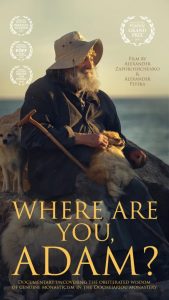
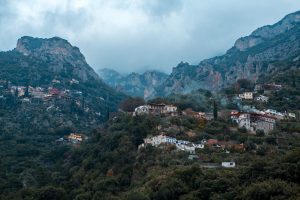
Praktische informatie
Wanneer? vrijdag 9 mei 2025, om 19u30
Waar? Auditorium 1 Jan Broeckx (Blandijnberg 2, Gent)
Talen? Grieks gesproken met Nederlandse ondertiteling
Prijs? €10 voor leden, studenten (m.u.v. PhD-studenten) en scholieren. Anderen betalen €13.
Inschrijven? Schrijf je in via dit formulier en schrijf het bedrag (€10/€13 per ticket) over op het rekeningnummer BE69 8803 2505 0178 (bevestiging volgt nadien). Let op: je inschrijving is pas definitief, wanneer het bedrag op bovenstaand rekeningnummer staat!
- meer info over deze film op de officiële website
- bekijk hier de Nederlandse trailer
Deze filmvoorstelling wordt georganiseerd i.s.m. de orthodoxe parochie Heilige Apostel Andreas van Gent.
-
Woe23Apr202519:30Leslokaal 0.4 (Blandijnberg 2, 9000 Gent)
Emma Huig - Fabels, demonen en heiligen: Griekse literatuur op middeleeuws Sicilië
Griekenlandcentrum, lezing, publiek evenementToon detailsVoorsmaakje
Het eiland Sicilië was door zijn strategische positie eeuwenlang een ontmoetingsplaats van verschillende culturen, wat bijvoorbeeld te zien is aan de lokale architectuur en literatuur, die invloeden van verschillende culturen in zich dragen. De Griekse invloed op het eiland begon in de 8e eeuw v. Chr. en is zelfs vandaag de dag nog merkbaar. In het eerste deel van de lezing geef ik eerst een chronologisch overzicht van de Griekse aanwezigheid op Sicilië, met een bijzondere focus op de laatantieke en middeleeuwse perioden. Daarna geef ik enkele voorbeelden van Siciliaans-Griekse literatuur uit de late oudheid en middeleeuwen waarin specifieke Siciliaanse kenmerken duidelijk zichtbaar zijn.
In het tweede deel bespreek ik enkele Heiligenlevens van Siciliaans-Griekse heiligen, geschreven in de late oudheid en middeleeuwen. Deze teksten vormen een interessante collectie omdat zowel hun Siciliaanse als Byzantijnse achtergronden duidelijk zichtbaar zijn, met referenties aan historische figuren, plaatsen en gebeurtenissen. Daarnaast worden ze gekenmerkt door een opmerkelijk groot aantal creatieve en imaginaire elementen. Deze aspecten van de Heiligenlevens zullen in de lezing aan bod komen en in hun Siciliaanse context worden geplaatst.
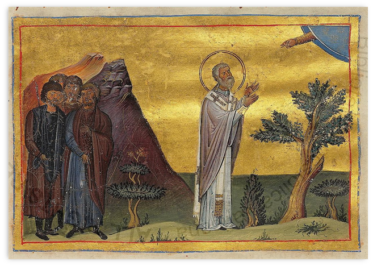
Over de spreker
Emma Huig is doctoraatsstudent aan de Universiteit Gent. Haar onderzoek gaat over Italo-Griekse hagiografie en de manier waarop geloofwaardigheid wordt geconstrueerd in deze teksten.
Praktische informatie
Wanneer? woensdag 23 april 2025, om 19u30
Waar? leslokaal 0.4 (Blandijnberg 2, 9000 Gent)
Prijs? gratis voor leden van het Griekenlandcentrum, UGent studenten (m.u.v. PhD-studenten) en scholieren. Anderen betalen €5 aan de kassa.
-
Do27Mar202519:30Liberas (Kramersplein 23, Gent)
Boekvoorstelling: ‘Nieuwgriekse geschiedenis. De Griekse wereld van de late middeleeuwen tot vandaag’ (Pieter Borghart)
Boekvoorstelling, Griekenlandcentrum, publiek evenementToon detailsVoorsmaakje
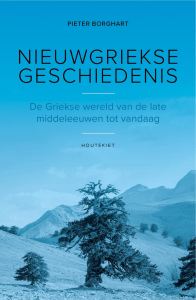
Op donderdag 27 maart stelt Pieter Borghart zijn nieuwe boek ‘Nieuwgriekse geschiedenis’ voor. Het boek, dat op 25 maart verschijnt – niet toevallig de Griekse nationale feestdag - vertelt het van de Nieuwgriekse geschiedenis, dat heel wat minder bekend is dan de Oudheid. Dat verhaal begint in de late middeleeuwen en neemt je mee op een fascinerende reis doorheen de laat-Byzantijnse, Frankische, Venetiaanse en Ottomaanse periode. Daarna komen de Griekse onafhankelijkheid in de negentiende eeuw en de uitbouw van de moderne natiestaat tot vandaag in beeld, tot en met de Europese integratie en de recente economische crisis.
Dit overzichtswerk beperkt zich niet tot geopolitieke en staatkundige ontwikkelingen, maar staat ook stil bij de evolutie van de Griekse taal en literatuur en de rol van de orthodoxe godsdienst. Het duidt hoe Griekstaligen in het verleden naar zichzelf keken en gaat in op de moeizame omgang van de moderne Grieken met de zware culturele erfenis uit de klassieke oudheid.
In zijn lezing zal Pieter Borghart vooral ingaan op de vraag wat het etiket ‘Nieuwgrieks’ precies inhoudt. De Griekse taal en cultuur kent een ononderbroken geschreven traditie van bijna 3000 jaar, maar vanaf wanneer kunnen we van ‘Nieuwgriekse’ geschiedenis spreken? En hoe verhoudt deze ‘Nieuwgriekse’ ontwikkelingsfase zich tot de Byzantijnse en Oudgriekse geschiedenis? Welke evoluties van geopolitieke, godsdienstige, taalkundige en cultuurhistorische aard in het eerste millennium van onze tijdrekening rechtvaardigen de keuze om de Nieuwgriekse geschiedenis in de twaalfde eeuw te laten beginnen?
Met een muzikaal intermezzo door To Schima en de mogelijkheid om het boek te laten signeren tijdens de receptie achteraf.
Over de spreker
Pieter Borghart is neograecus en classicus. In 2005 promoveerde hij met een studie over het naturalisme in de Nieuwgriekse literatuur, tussen 2007 en 2013 doceerde hij Nieuwgriekse letterkunde aan de Universiteit Gent. Naast heel wat (populair-)wetenschappelijke artikelen is hij ook de auteur van een boek over het Europese naturalisme (2006) en van ‘Inleiding in de Nieuwgriekse literatuur’ (2012, 2018).
Praktische informatie
Wanneer? donderdag 27 maart 2025, om 19u30
- 19u00 deuren open
- 19u30 start boekvoorstelling
- 21u00 mogelijkheid tot laten signeren
Waar? Liberas (Kramersplein 23, Gent)
Prijs? gratis, maar inschrijven is verplicht via deze link: https://houtekiet.be/blogs/evenementen/boekvoorstelling-nieuwgriekse-geschiedenis-pieter-borghart
i.s.m. uitgeverij Houtekiet en VBK België
-
Woe19Feb202519:30Auditorium 1 Jan Broeckx (Blandijnberg 2, 9000 Gent)
Pieter Hendriks - Mikis Theodorakis, meer dan de sirtaki
Griekenlandcentrum, lezing, publiek evenementToon detailsVoorsmaakje
De lezing zal gaan over het leven van de Griekse componist en fenomeen Mikis Theodorakis (1925-2021).
Theodorakis was het symbool van het linkse verzet tegen de Griekse Kolonels die van 1967 tot 1974 aan de macht waren in Griekenland. Gedurende die jaren reisde hij de hele wereld over om met concerten, interviews en geschriften deze strijd onder de aandacht te krijgen en te houden.
De van oorsprong klassieke componist had aan het begin van de jaren 60 in Griekenland een muzikale revolutie ontketend door hoogwaardige teksten te gebruiken voor liederen die in hun ogenschijnlijke eenvoud een groot publiek bere ikten. Vanwege zijn linkse signatuur werd vanaf april 1967 zijn muziek in Griekenland verboden en werd hij na een aantal jaar opgesloten en geïsoleerd te zijn geweest verbannen uit Griekenland.
Pieter Hendriks zal vooral ingaan op de muzikale kant van het leven van Theodorakis maar aangezien deze onlosmakelijk verbonden is met zijn leven en het Griekenland van zijn tijd zullen ook deze zaken niet onbelicht blijven.

Over de spreker
Pieter Hendriks is als bas-bariton werkzaam als solist bij concerten en operavoorstellingen en maakt deel uit van het Groot Omroepkoor. Zijn fascinatie met de muziek van Theodorakis begon op zeer jonge leeftijd en heeft zich over de jaren uitgebreid tot andere Griekse muziekstijlen en componisten. Hij heeft naast muziek van Bach, Mozart, Orff en anderen verschillende werken van Theodorakis gezongen.
Hij is te horen op verschillende cd’s waaronder de King Arthur van Purcell door Barokopera Amsterdam waarvan een door hem gezongen aria te horen was in de Ridley Scott film over Napoleon.
Praktische informatie
Wanneer? woensdag 19 februari 2025, om 19u30
Waar? Auditorium 1 Jan Broeckx (Blandijnberg 2, 9000 Gent)
Prijs? gratis voor leden van het Griekenlandcentrum, UGent studenten (m.u.v. PhD-studenten) en scholieren. Anderen betalen €5 aan de kassa.
-
Woe05Feb202519:00Auditorium 5 Jeanne Wiemer (Blandijnberg 2, Gent)
Griekse avond met lezingen, poëzie en muziek ter ere van de Griekse taal
Griekenlandcentrum, publiek evenementToon detailsDit jaar viert de Griekse ambassade in België de Internationale dag van het Grieks in Gent, in samenwerking met het Griekenlandcentrum. Op het programma staan een lezing over over 3000 jaar Grieks in Klein-Azië en een hommage aan de grote dichter Giannis Ritsos. Er zullen gedichten worden voorgedragen en het Griekse koor van Brussel (Ελληνική Χορωδία Βρυξελλών) zorgt voor zang en muziek.
Na afloop volgt een receptie.
Praktische informatie
Wanneer? woensdag 5 februari, om 19u00
Waar? auditorium 5 Jeanne Wiemer (Blandijnberg 2, Gent)
Prijs? gratis, ook voor niet-leden. Inschrijven (voor 3 februari) is verplicht, via deze link: https://event.ugent.be/registration/EllinikiGlossa2025
-
Woe11Dec.202419:30Leslokaal 0.4 (Blandijnberg 2, 9000 Gent)
Patrick Gouw, Het verdeelde eiland van Aphrodite: de 'Cyprus-kwestie' in historisch perspectief
Griekenlandcentrum, lezing, publiek evenementToon detailsVoorsmaakje
Cyprus gedenkt dit jaar 50 jaar opdeling van het eiland. Het zuiden en noorden worden sinds de zomer van 1974 fysiek gescheiden door een demarcatiezone (de zgn. ‘Green Line)’, maar de wortels van het versteende (en onoplosbaar lijkende) conflict gaan veel verder terug. Vanaf het begin van de 20e eeuw was de Grieks-Cypriotische bevolking in de ban geraakt van enosis, het streven tot aansluiting bij het 'moederland' Griekenland. Maar het Britse koloniale bestuur (sinds 1878) liet hiervoor geen ruimte. Toenemende etnische spanningen met de Turks-Cyprioten, die het eiland liever opgedeeld zagen (taksim) in een Turks en een Grieks deel, leidden in de jaren ’50 tot een explosieve situatie.
Met de onafhankelijkheid van de Republiek Cyprus in 1960 hoopten Groot-Brittannië, Griekenland en Turkije het probleem op te lossen, maar tevergeefs. Etnisch geweld bleef het eiland teisteren. Toen het kolonelsregime in Griekenland in 1974 de Cypriotische president en aartsbisschop Makarios middels een coup trachtte af te zetten – en zo effectief alsnog enosis probeerde te bewerkstelligen) greep het andere 'moederland' Turkije in. Na twee opeenvolgende militaire interventies bezette het een derde van het eiland, een situatie die nog altijd voortbestaat. Een VN-vredesmissie is nog steeds actief op Cyprus en Nicosia blijft de laatste verdeelde hoofdstad van Europa. Een oplossing voor het conflict lijkt verder weg dan ooit, mede vanwege de grote geopolitieke belangen.
In deze lezing doet Patrick Gouw het ontstaan, verloop én de toekomst van de ‘Cyprus-kwestie’ uit de doeken.
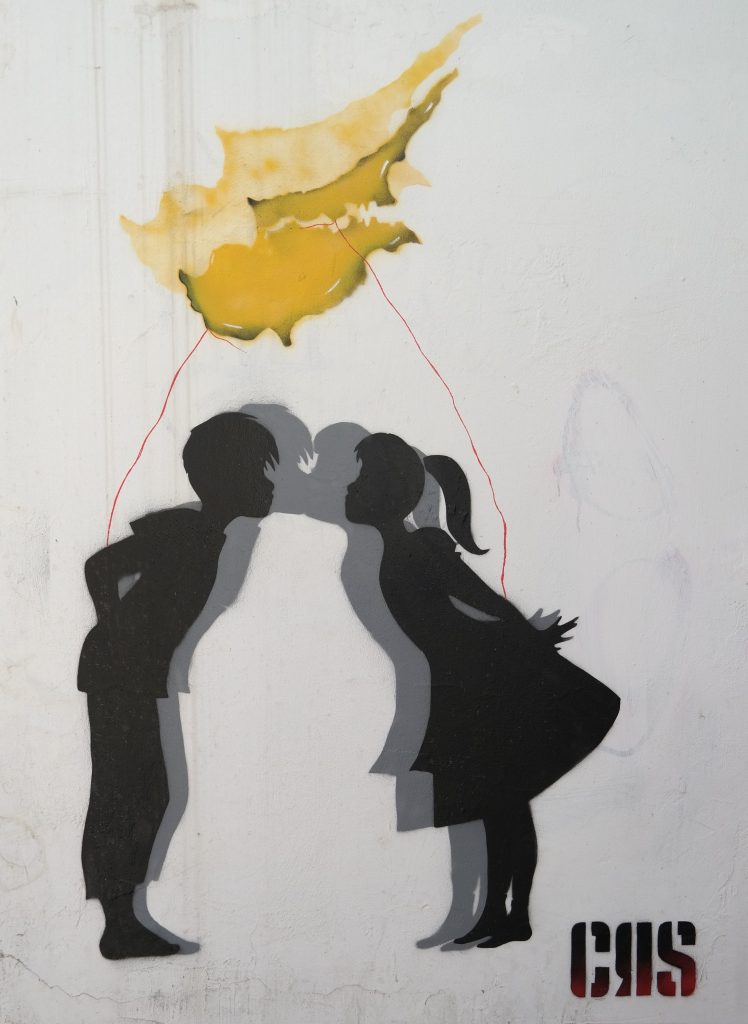
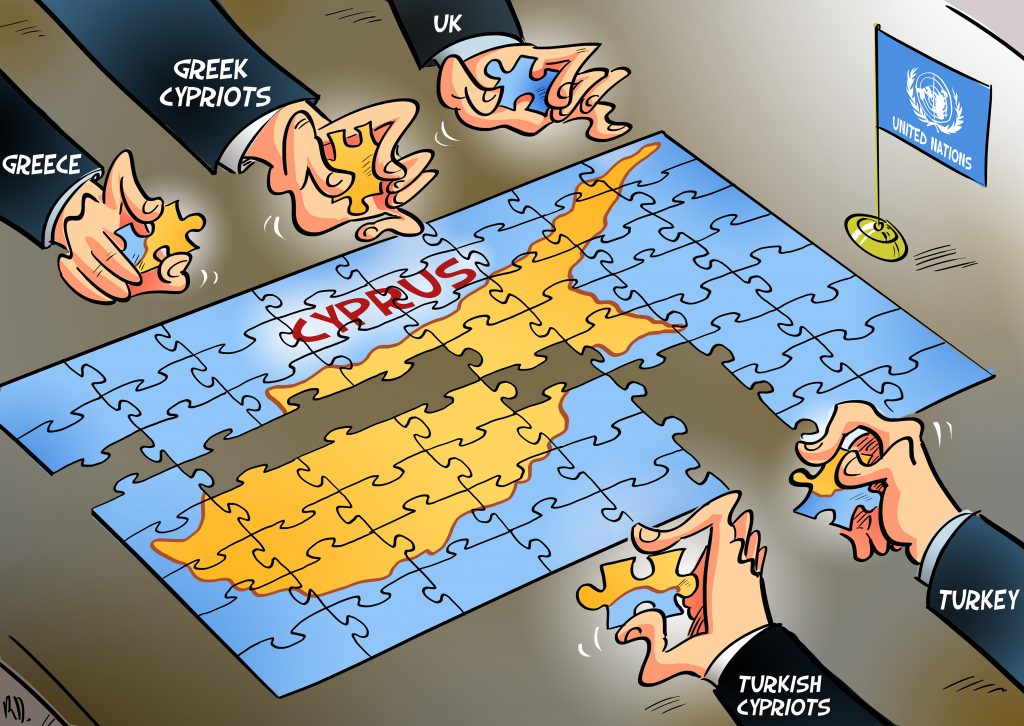
Over de spreker
Dr. Patrick Gouw is historicus en verbonden aan de Universiteit Leiden. Hij is gespecialiseerd in de Klassieke Oudheid, maar ook in de (vroeg)moderne geschiedenis van Griekenland en Cyprus. Daarnaast begeleidt hij jaarlijks diverse culturele groepsreizen naar het Middellandse Zeegebied en is hij redacteur van het tijdschrift Lychnari. Verkenningen in het Griekenland van nu.
Praktische informatie
Wanneer? woensdag 11 december 2024, om 19u30
Waar? leslokaal 0.4 (Blandijnberg 2, 9000 Gent)
Prijs? gratis voor leden van het Griekenlandcentrum, UGent studenten (m.u.v. PhD-studenten) en scholieren. Anderen betalen €5 aan de kassa.
-
Woe06Nov.202419:30Leslokaal 0.4 (Blandijnberg 2, 9000 Gent)
Dalia Pratali Maffei, A Thousand Years of Dialects in Ancient Crete
Griekenlandcentrum, lezing, publiek evenementToon detailsVoorsmaakje
Crete, the largest of the Greek islands, has brought to us invaluable evidence on Ancient Greek language and its dialectal diversity. In Crete, we found clay tables with the Linear B script, which provide the oldest written evidence of the Greek language. They date back approximately to the time of the Trojan war, 1200 BC. There, we also found the so-called “Queen of Inscriptions”, the biggest Ancient Greek inscription ever found, dated roughly around 500 BC.
What can these inscriptions tell us about the Ancient Greek dialects spoken in Crete and how they changed, over the thousand years before the arrival of the Romans? And what can these dialects tell us about the speakers’ identity? Cretans had an ambivalent and liminal identity, as islanders often do, also reflected in the resilience of their dialect to external influence. They were indeed viewed with a certain suspicion by other Greeks – Homer himself called Cretans a bunch of thieves and liars, and this fame lasted for a thousand years.
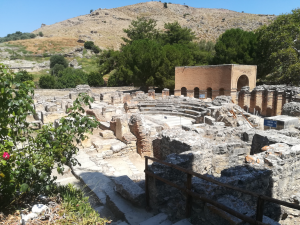
Over de spreker
Dalia Pratali Maffei obtained her BA (2016) and MA (2018) in Classics at Ca’ Foscari University of Venice and later received her PhD title at the University of Cambridge (2023), with a thesis on the dialect of inscribed epigrams, i.e. short poems written on inscriptions. She joined the University of Gent in 2023 as an FWO post-doctoral researcher, with a project on dialect contact between Doric and Koine Greek in the Hellenistic age.
Praktische informatie
Wanneer? woensdag 6 november 2024, om 19u30
Waar? leslokaal 0.4 (Blandijnberg 2, 9000 Gent)
Prijs? gratis voor leden van het Griekenlandcentrum, UGent studenten (m.u.v. PhD-studenten) en scholieren. Anderen betalen €5 aan de kassa.
! Opgelet: deze lezing wordt in het Engels gegeven !
-
Woe16Okt202419:30Leslokaal 0.4 (Blandijnberg 2, 9000 Gent)
Ruard Wallis de Vries, Tussen toerist en vluchteling: twee Griekse eilanden nader bekeken
Griekenlandcentrum, lezing, publiek evenementToon detailsVoorsmaakje
Samos en Leros zijn twee eilanden die, hoewel ze op een heldere dag in elkaars gezichtsveld liggen, een totaal verschillend karakter hebben: Samos is groot, groen, toeristisch, heeft ontelbaar veel stranden maar heeft ook een bevolking die – en dat is uitzonderlijk voor een Grieks eiland – veel meer met landbouw dan met zeevaart bezig is. Leros is klein, tamelijk volgebouwd, vol mannen die de zeven zeeën bevaren hebben, maar ook is het eiland getekend door een bijzondere geschiedenis, waardoor het toerisme nooit een vlucht heeft genomen. Ondertussen zijn er wel veel niet-Griekse expats neergestreken, die het straatbeeld in hoge mate bepalen.
Samos en Leros zijn ook de twee eilanden waar ik bloed zweet en tranen heb gelaten, en echt niet alleen omdat ik op beide eilanden een aantal ruïneuze huisjes heb opgeknapt. Het zijn eilanden waarop ik op alle mogelijke manieren geleefd heb, en waar ik me diep verbonden mee voel. Naast mijn eigen perikelen bij de renovatie van de huisjes, maakte ik er ook de economische crisis mee, die al snel werd verdrongen door een grote toestroom aan vluchtelingen uit Syrië, Afghanistan en andere landen. Waarna in de laatste twee jaar een ongekende toestroom aan met name Westeuropese toeristen volgde.
Deze eilanden lijken het vermogen te hebben ontwikkeld om (meestal tijdelijk, en soms letterlijk) als opvangkamp te fungeren voor bepaalde bevolkingsgroepen. Want eerder, ver voor het huidige vluchtelingen-issue, waren er politieke gevangenen die op beide eilanden werden vastgezet tijdens de Griekse burgeroorlog (met name op Samos), en in de decennia die daaraan vooraf gingen bouwde Mussolini Leros om tot een imposante marinebasis, waarna de Griekse regering besloot om er de grootste psychiatrische instelling van Griekenland neer te zetten. Maar veruit de grootste demografische verandering vond ruim 100 jaar geleden plaats, toen deze eilanden een enorme hoeveelheid aan Griekse vluchtelingen moest zien te verstouwen – na de Kleinaziatische katastrofi.
Hoe verschillend de eilanden ook zijn, ze lijken elke nieuwe invasie met glans te overleven. Of is dat maar schijn? En wat te denken van de meest recente invasie, die van de toeristen, met name de Turkse jachten en cruiseboten op Leros, en de groeiende aanwas aan Nederlanders die zomers de sfeer bepalen in menig Samiotisch dorp ?
Hoe Grieks zijn deze eilanden eigenlijk nog? En waren ze eigenlijk ooit wel authentiek? Hoe zit het bij voorbeeld met het verhaal dat Samos tijdens de Ottomaanse tijd een eeuw lang vrijwel leeg heeft gestaan? Of dat Erdogan zo zijn redenen heft om deze zo voor het grijpen liggende eilanden niet te bezetten? Waarom noemen de Grieken deze eilanden “akritika” – zoiets als “on the edge”?
In mijn lezing besteed ik aandacht aan hoe deze eilanden zich als kameleons door de eeuwen heen bewegen – behoedzaam, en dan ineens in sneltreinvaart en van kleur verschietend. Ik wil in het verhaal ook de socio-economische veranderingen proberen te benoemen die deze invasies met zich brengen, en zal daarbij, net als in mijn boeken en artikelen, het anekdotisch element niet schuwen.
Over de spreker
Ruard Wallis de Vries (Amsterdam, 1967) publiceert geregeld artikelen en boeken over Griekenland. Hij verdeelt zijn tijd tussen Oslo, Brussel en de Griekse eilanden.
Zijn eerste bezoek aan Griekenland dateert van de zomer van 1985, als Interrailer van 17 jaar oud. Hij was meteen verkocht en verknocht aan Hellas. Vervolgens was hij Erasmus-student in Athene, reisleider op Chios en Lesbos, freelance-journalist in Athene en opkoper/opknapper van een half dozijn Griekse bouwvallen op Samos en Leros. Ook vertaalde hij verschillende korte verhalen van het Grieks naar het Nederlands, en instigeerde een zomers filmfestival op Samos, waarop sinds 2012 Griekse kortfilms centraal staan. Sinds 2023 vormt hij de helft van het op Leros actieve muzikale duo ‘Déjà Ru’.
Naast diverse artikelen in NRC Handelsblad, Vrij Nederland en Lychnari publiceerde Ruard recentelijk twee boeken over Griekenland: ‘Misguided’ (Uitgeverij Ishin-Denshin, 2021) en ‘Griekse Toestanden’ (Uitgeverij Boudewijn Boer, 2022). In het voorjaar van 2025 staat het boek ‘Reislijder’ (werktitel) gepland (Uitgeverij Houtekiet).
Praktische informatie
Wanneer? woensdag 16 oktober 2024, om 19u30
Waar? leslokaal 0.4 (Blandijnberg 2, 9000 Gent)
Prijs? gratis voor leden van het Griekenlandcentrum, UGent studenten (m.u.v. PhD-studenten) en scholieren. Anderen betalen €5 aan de kassa.
-
Ma24Jun2024Woe26Jun2024St Peter's Abbey (Sint-Pietersplein 9, 9000 Gent)
Paratexts in Premodern Writing Cultures
congres, Database of Byzantine Book EpigramsToon detailsThe Database of Byzantine Book Epigrams project (DBBE) will organize a conference on “Paratexts in Premodern Writing Cultures”, which will take place in Ghent on 24-26 June 2024.
With this conference we aim to bring together scholars engaged in the exploration of premodern paratexts transmitted in a variety of languages (such as Arabic, Armenian, Greek, Coptic, Hebrew, Latin, Slavonic, Syriac). It is our aim to discuss the nature of paratextuality in medieval manuscripts, to reveal similarities and peculiarities of paratexts across language borders, and to understand the broader cultural and historical ramifications of paratexts. We are interested both in the textual evidence of medieval paratexts and in their material transmission.
For all further information, please visit the conference website: https://www.dbbe2024.ugent.be/.
For any additional questions you may have, please contact the organisers at dbbe@ugent.be. -
Ma27Mei2024Din28Mei202410:00Vossius Room, Leiden University Library
Crash Course in Greek Palaeography
OIKOS, workshopToon detailsThe Leiden University Centre for the Arts in Society, Leiden University Library and the Greek department of Ghent University offer a two-day course in Greek palaeography in collaboration with the Research School OIKOS. The course is intended for MA, ResMA and doctoral students in the areas of Classics, Ancient History, Ancient Civilizations and Medieval studies with a good command of Greek. It offers a chronological introduction into Greek palaeography from the Hellenistic period until the end of the Middle Ages and is specifically aimed at acquiring practical skills for research involving literary and documentary papyri and/or manuscripts. This course gives the unique opportunity to practice reading on original papyri and manuscripts from the collection of the Leiden Papyrological Institute and the special collections of the Leiden University Library.
Programme
The course is set up as an intensive two-day seminar. Five lectures by specialists in the field will give a chronological overview of the development of Greek handwriting, each followed by a practice session reading relevant extracts from papyri and manuscripts in smaller groups under the supervision of young researchers.
Monday, May 27
- 10:00 Introduction
- 10:15-11:15 Papyri of the Ptolemaic and Roman period (3rd cent. BCE – 3rd cent. CE) (Dr. Joanne Stolk)
- 11:15-12:30 Practice with papyri of the Ptolemaic and Roman period
- 12:30-13:30 Lunch break
- 13:30-14:30 Papyri of the Byzantine period (4th-8th centuries) (Dr. Yasmine Amory)
- 14:30-15:45 Practice papyri of the Byzantine period
- 15:45-16:15 Coffee break
- 16:15-17:00 Presentation of Greek manuscripts from the Leiden University Library
- 17:00-17:45 Presentation of Greek papyri from the Leiden Papyrological Institute
- 19:00 Dinner
Tuesday, May 28
- 9:00-10:00 Majuscule and early minuscule bookhands (4th-9th centuries) (Dr. Rachele Ricceri)
- 10:00-11:15 Practice majuscule and early minuscule bookhands
- 11:15-11:45 Coffee break
- 11:45-12:45 The development of minuscule script (10th-12th centuries) (Prof. dr. Floris Bernard)
- 12:45-13:45 Lunch break
- 13:45-15:00 Practice minuscule script of the 10th-12th centuries
- 15:00-15:30 Coffee break
- 15:30-16:30 Manuscripts and scholars of the Palaeologan period (13th-15th centuries) (Prof. dr. Andrea Cuomo)
- 16:30-17:45 Practice manuscripts of the Palaeologan period
The teaching staff also includes Antonia Apostolakou, Serena Causo, Kyriaki Giannikou, Eleonora Lauro, Anne-Sophie Rouckhout, Ricarda Schier, Nina Vanhoutte and dr. Grigory Vorobyev.
Practical information
The study load is the equivalent of 2 ECTS (2x28 hours). Participants will be asked to read up on secondary literature in preparation for the seminar (distributed several weeks before the course). Extra material will be handed out during the course in order to continue to improve your reading skills afterwards.
There are no fees for participation in this course. Lunches on both days and dinner on the first day are provided free of charge. Travel costs and accommodation in Leiden are at your own expense.
Registration
Please register by sending an e-mail with a short motivation (ca. 300 words, including your background, research interests and why you would like to follow this course) to yasmine.amory@ugent.be. Priority is given to OIKOS doctoral students and those who did not have the opportunity to follow course(s) on palaeography before. Registration closes by the final deadline of February 15th, 2024. Successful applicants will be notified soon afterwards.
-
Vrij24Mei202420:00NTGent Schouwburg (Sint-Baafsplein 17, 9000 Gent)
'Women in Troy, as told by our mothers’: theatervoorstelling met inleiding
Griekenlandcentrum, publiek evenementToon detailsmeer informatie volgt later
-
Woe22Mei202419:30Leslokaal 0.4 (Blandijnberg 2, 9000 Gent)
Evelien Bracke, Tussen Flair en Filosofie: in gesprek met de Oudgriekse filosofe Theano
Griekenlandcentrum, lezing, publiek evenementToon detailsVoorsmaakje
In de oudheid en de middeleeuwen stond de Pythagoreïsche filosofe Theano bekend als een toonbeeld van intelligente vrouwelijke deugdzaamheid – maar haar naam is in de loop der eeuwen (helaas) in de vergetelheid geraakt. In deze lezing bekijken we enkele brieven die aan haar zijn toegeschreven over belangrijke huishoudelijke thema’s. Theano – of eerder, zoals we zullen zien, Pseudo-Theano – buigt zich over vragen zoals: hoe om te gaan met overspelige echtgenoten, hoe kinderen correct op te voeden, en hoe burn-out bij tot-slaaf-gemaakten te vermijden. We zullen in deze brieven een fascinerende spanning vinden tussen de ons bekende misogyne Oudgriekse ideologie en de Pythagoreïsche harmonieleer.
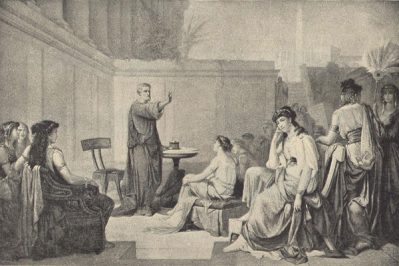
Over de spreker
Evelien Bracke is taallector Oudgriekse Letterkunde in de Afdeling Grieks aan de UGent. Eén van haar onderzoeksinteresses is gender in de oudheid en in receptieliteratuur. Ze doceert het mastervak Bijzondere Vraagstukken over het thema Gender en de oudheid.
Praktische informatie
Wanneer? woensdag 22 mei 2024, om 19u30
Waar? leslokaal 0.4 (Blandijnberg 2, 9000 Gent)
Prijs? gratis voor leden van het Griekenlandcentrum, UGent studenten (m.u.v. PhD-studenten) en scholieren. Anderen betalen €5 aan de kassa.
-
Din30Apr202419:30Leslokaal 0.4 (Blandijnberg 2, 9000 Gent)
Helle Hochscheid, Werken in de marges: vrouwen, werk en eigendom in antiek Athene
Griekenlandcentrum, lezing, publiek evenementToon detailsVoorsmaakje
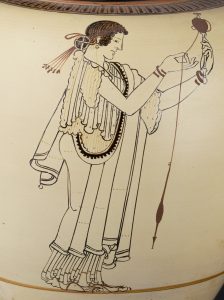
Witgrondige oinochoë, 490-470 v.C., detail van een vrouw die aan het spinnen is Het werk van vrouwen in de oudheid is lang op de achtergrond gebleven in de wetenschap, maar is daarom niet minder belangrijk in de antieke economie. Deze lezing vertelt het verhaal van de aard en bandbreedte van het werk van vrouwen in archaïsch en klassiek Athene. Daarvoor zijn drie aspecten belangrijk. Het eerste is het idee dat ‘nette’ vrouwen zich niet buitenshuis begaven en dus ook niet buitenshuis werkten. Als tweede kijken we naar de mate waarin de Atheense wetgeving werk en eigendom van vrouwen beperkte dan wel toestond, en hoe dit lijkt te veranderen door de eeuwen heen. Tenslotte wordt ingegaan op werk en handwerk dat vrouwen binnenshuis verrichtten, tegenover de mogelijkheden om vergelijkbare producten buitenshuis te kopen, van professionele handwerkers of verkopers. Door deze drie voorwaarden – nodig om het werk van vrouwen mogelijk te maken – extra te belichten, betoogt de auteur dat de mate van arbeidsparticipatie van vrouwen in de Atheense maatschappij allesbehalve te verwaarlozen was.
Over de spreker
Helle Hochscheid doceert archeologie en oudheid aan University College Roosevelt, een honours college van de Universiteit Utrecht in Middelburg. In het universitair onderwijs werkt ze regelmatig met studenten aan erfgoed- en archeologie-gerelateerde projecten in de lokale gemeenschap in Zeeland. Voor deze projecten won ze tweemaal een financiële bijdrage. Daarnaast werkt ze aan een methode wereldarcheologie voor het basisonderwijs, waarvoor ze in 2021 de Zenobia onderwijsprijs won met partners in het primair en universitair onderwijs.
Haar wetenschappelijke onderzoek richt zich op ambacht in de Griekse oudheid, de sociale status van handwerkers, en het werk van vrouwelijke handwerkers. De ambachten variëren van sculptuur tot textiel, en van leerproductie tot fluitmaken. Onder haar publicaties zijn Networks of Stone. Sculpture and Society in Archaic and Classical Athens (Peter Lang, 2015), en de bundel The Value of Making: Theory and Practice in Ancient Craft Production (Brepols Publishers, 2021) die ze met Ben Russell redigeerde. Haar meest recente publicatie is het hoofdstuk “Foreign Labour, Common Ground: The Value of Craftspeople in Early Democratic Athens”, in de bundel Valuing of Labour in Graeco-Roman Antiquity (Brill, 2024).
Praktische informatie
Wanneer? dinsdag 30 april 2024, om 19u30
Waar? leslokaal 0.4 (Blandijnberg 2, 9000 Gent)
Prijs? gratis voor leden van het Griekenlandcentrum, UGent studenten (m.u.v. PhD-studenten) en scholieren. Anderen betalen €5 aan de kassa.
-
Woe20Mar202409:30Auditorium P Jozef Plateau (Jozef Plateaustraat 22, 9000 Gent)
Bloemlezing van Aristophanes' Vrouwenparlement: #GenderBlender naar de stembus
Festival européen latin grec, publiek evenement, scholenevenement, workshopToon details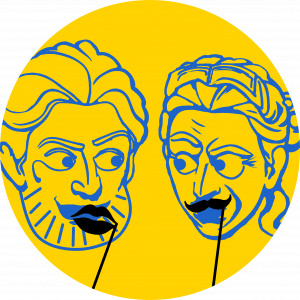 Elk jaar nodigt het Festival Européen Latin-Grec ons uit om een meesterwerk uit de klassieke literatuur te (her)ontdekken. Dit jaar, op woensdag 20 maart, lezen we samen de komedie Vrouwenparlement (Ἐκκλησιάζουσαι) van Aristophanes, in het kader van het huidige genderdebat in onze samenleving. We nodigen jullie hiervoor graag uit. Alle geïnteresseerden zijn welkom op de bloemlezing. Leerlingen van het 4de tot 6de middelbaar zijn ook welkom voor de daaropvolgende werkwinkel.
Elk jaar nodigt het Festival Européen Latin-Grec ons uit om een meesterwerk uit de klassieke literatuur te (her)ontdekken. Dit jaar, op woensdag 20 maart, lezen we samen de komedie Vrouwenparlement (Ἐκκλησιάζουσαι) van Aristophanes, in het kader van het huidige genderdebat in onze samenleving. We nodigen jullie hiervoor graag uit. Alle geïnteresseerden zijn welkom op de bloemlezing. Leerlingen van het 4de tot 6de middelbaar zijn ook welkom voor de daaropvolgende werkwinkel.Programma
- 9u30-11u: bloemlezing (live of online; open voor alle geïnteresseerden)
Gastsprekers, leerlingen, leerkrachten en studenten lezen passages voor uit de komedie, in vertaling van Arthur Oosthout (KU Leuven). Gastsprekers Tine Laureyns (actrice), Liesbet Vertriest (waarnemend Algemeen Directeur bij Stad Gent), Dirk Crommelinck (theatermaker en acteur NTGent) en Gita Deneckere (Historica en Decaan van de Faculteit Letteren en Wijsbegeerte), geven vanuit hun respectievelijke achtergronden als theatermakers, bestuurslid en historica een persoonlijke duiding van de tekst. - 11u-12u: werkwinkel (live; enkel voor leerlingen en hun leerkrachten)
Leerlingen gaan actief met de komedie aan de slag, onder de begeleiding van lesgevers van onze afdeling.
Doe mee!
Oproep 1: voorlezers!
We zijn op zoek naar enthousiastelingen die tijdens ons festival een stukje tekst in vertaling willen voorlezen (enkel voor leerlingen en leerkrachten die naar de Blandijn komen). Wij bezorgen je een vlotte vertaling van de tekst en komen op voorhand al eens (online) met je samen.
Oproep 2: creatievelingen!
We verbinden ook een wedstrijd aan dit festival: wie zorgt voor de meest creatieve weergave van het langste Griekse woord (Λοπαδοτεμαχοσελαχογαλεοκρανιολειψανοδριμυποτριμματοσιλφιοκαραβομελιτοκατακεχυμενοκιχλεπικοσσυφοφαττοπεριστεραλεκτρυονοπτοκεφαλλιοκιγκλοπελειολαγῳοσιραιοβαφητραγανοπτερύγων: 171 letters) uit deze komedie? Tekening, audio-opname, filmpje, …: alle mogelijke herwerkingen of interpretaties zijn welkom! De drie meest succesvolle inzendingen winnen elk een cultuurbon voor een Vlaams toneelhuis ter waarde van €100.
Inschrijven
Schrijf je hier in voor:
- live of online deelname aan de bloemlezing en/of de werkwinkel
- het voorlezen van een stukje tekst uit de komedie tijdens de bloemlezing
- de wedstrijd van het langste Griekse woord (enkel voor scholen)
Leerkrachten kunnen zichzelf én hun leerlingen inschrijven.
Deadline: 11 maart 2024
Praktische informatie
- Wanneer: woensdag 20 maart 2024 van 9u30 tot 12u
- Waar: Auditorium P Jozef Plateau (Plateaustraat 22, 9000 Gent) en online
- Toegang is gratis - iedereen welkom!
- Contact: grieks@ugent.be
Deel je graag een poster van het evenement? Die kan je hier downloaden.
- 9u30-11u: bloemlezing (live of online; open voor alle geïnteresseerden)
-
Woe20Mar202419:30Leslokaal 0.4 (Blandijnberg 2, 9000 Gent)
Berenice Verhelst, Van Penelope tot Eva en Maria. Een vrouwelijk perspectief in de Homerocentones van keizerin Eudocia
Griekenlandcentrum, lezing, publiek evenementToon detailsVoorsmaakje
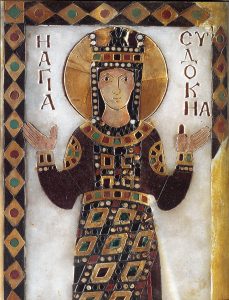
Icoon van de heilige Eudokia Een cento is een literaire tekst die is samengesteld uit citaten, zoals een mozaïek of een collage. In christelijke cento poëzie worden Bijbelse verhalen herverteld met verzen van Homerus en Vergilius. Deze teksten brengen twee tradities, christelijk en klassiek, samen op een unieke en niet on-controversiële manier. Wat het extra interessant maakt is dat de belangrijkste christelijke cento’s door vrouwen zijn geschreven. Vrouwelijke auteurs uit de oudheid, wiens werk we bovendien nog steeds kunnen lezen, zijn een absolute zeldzaamheid. En toch zijn Proba, auteur van de Latijnse Cento Vergilianus, en Eudocia, auteur van Homerocentones, bij het grote publiek nobele onbekenden. Aelia Eudocia (5de eeuw n. Chr.) was naast dichteres ook keizerin. Als vrouw van Theodosius II, Oost-Romeins keizer, was ze een invloedrijk figuur. Hoewel haar cento exclusief verzen van Homerus citeert, is het mogelijk een vrouwelijk perspectief te ontwaren in haar selectie van Bijbelse verhalen en de Homerische verzen die ze kiest om er vorm aan te geven. Maria als moeder Gods is bij Eudocia een opvallend sterk uitgewerkt en “moederlijk” personage. Eva’s noodlottige misstap en de gevolgen ervan voor de reputatie van de vrouw, worden met veel nuance geanalyseerd. De figuur van de Homerische Penelope biedt Eudocia een rode draad…
Over de spreker
Berenice Verhelst is Universitair Docent aan de Universiteit van Amsterdam. Ze doceert er voornamelijk Oudgrieks en receptiegeschiedenis. Haar onderzoek richt zich op de poëzie uit de Late Oudheid en de epische traditie als geheel. Ze is vooral bekend voor haar werk over Nonnus van Panopolis.
Praktische informatie
Wanneer? woensdag 20 maart 2024, om 19u30
Waar? leslokaal 0.4 (Blandijnberg 2, 9000 Gent)
Prijs? gratis voor leden van het Griekenlandcentrum, UGent studenten (m.u.v. PhD-studenten) en scholieren. Anderen betalen €5 aan de kassa.
-
Woe21Feb202419:30Leslokaal 0.4 (Blandijnberg 2, 9000 Gent)
! GEANNULEERD ! Tineke Melkebeek, “Een gemutileerde man”: Aristoteles over de vrouw
Griekenlandcentrum, lezing, publiek evenementToon detailsOPGELET! Door omstandigheden zal deze lezing jammer genoeg niet kunnen plaatsvinden.
Voorsmaakje
meer informatie volgt later
Praktische informatie
Wanneer? woensdag 21 februari 2024, om 19u30
Waar? leslokaal 0.4 (Blandijnberg 2, 9000 Gent)
Prijs? gratis voor leden van het Griekenlandcentrum, UGent studenten (m.u.v. PhD-studenten) en scholieren. Anderen betalen €5 aan de kassa.
-
Woe13Dec.202319:30Leslokaal 0.4 (Blandijnberg 2, 9000 Gent)
Ewan Short, Gender en macht: keizerinnen in elfde-eeuws Byzantium vanuit historisch perspectief
Griekenlandcentrum, lezing, publiek evenementToon detailsVoorsmaakje
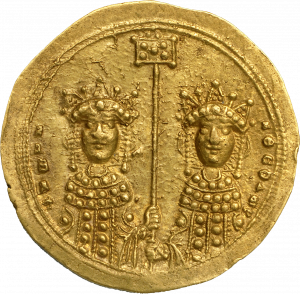
Histamenon van Zoë en Theodora De politieke geschiedenis van het elfde-eeuwse Byzantijnse rijk wordt gedomineerd door twee vrouwen: de keizerinnen Zoë en Theodora. Deze zusters waren de laatste afstammelingen van de Macedonische dynastie van Byzantijnse heersers. Op verschillende momenten tussen 1028 en 1056 regeerden zowel Zoë als Theodora alleen en ook naast vier mannelijke keizers wiens macht zij legitimeerden door adoptie of huwelijk. Deze lezing bespreekt hoe Zoë en Theodora invloed hadden op gendernormen die de rol van elitevrouwen in de Byzantijnse samenleving bepaalden. De geschiedenis van Zoë en Theodora wordt onder andere besproken naast die van hun opvolgers, zoals de machtige keizerin Eudokia Makrembolitissa (r.1060-1072).
Over de spreker
Ewan Short is docent Oude Geschiedenis aan de Universiteit van Amsterdam. Hij promoveerde in 2022 aan de Universiteit van Cardiff op een proefschrift over de elfde-eeuwse in Bulgarije geboren Byzantijnse keizerin Aikaterine. In dit onderzoek maakte hij gebruik van theorieën uit de womens- en genderstudies. Momenteel ontwikkelt hij het proefschrift tot een monografie die zal worden gepubliceerd bij Liverpool University Press. Ewan is ook geïnteresseerd in de geschiedenis van de topografie van Istanbul, met name de relatie tussen het stedelijke gebied en de zee.
Praktische informatie
Wanneer? woensdag 13 december 2023, om 19u30
Waar? leslokaal 0.4 (Blandijnberg 2, 9000 Gent)
Prijs? gratis voor leden van het Griekenlandcentrum, UGent studenten (m.u.v. PhD-studenten) en scholieren. Anderen betalen €5 aan de kassa.
-
Woe22Nov.202319:30Leslokaal 0.4 (Blandijnberg 2, 9000 Gent)
Nicolò D'Alconzo, Women of fiction. The heroines of the ancient Greek novels and their Byzantine readers
Griekenlandcentrum, lezing, publiek evenementToon detailsVoorsmaakje
The world of the ancient Greek novels rotates around its excellent heroines: Callirhoe, Anthia, Leukippe, Chloe, Charikleia. The stories often revolve around their stunning beauty, the suffering that comes as a consequence of it, and the virtue with which they endure it. Outside the fiction, in the real ancient world, they were the construct of male authors, and, concerning them, antiquity has preserved only the opinions of male commentators. It is in this context of production and reception that the fame of the novels’ heroines lasted throughout Late Antiquity, the Byzantine era, and beyond.
For a while, the real world of 2023 too has seemed to rotate around one fictional heroine: Barbie, the plastic doll brought to life by Margot Robbie in Greta Gerwig’s film. Thanks to an all-out advertising campaign spreading its fame everywhere, Barbie became a global cultural phenomenon which sparked global debates. In this talk I explore how Barbie’s messages, and especially its contradictions, can help us understand some important aspects of the heroines of the Greek novels, like their objectification and centrality to the story. Moreover, Barbie can also help us look into the few real ancient women who are known to have read the novels, the nun Kassia and the princess Anna Komnene.

Barbie (2023) Over de spreker
Praktische informatie
Wanneer? woensdag 22 november 2023, om 19u30
Waar? leslokaal 0.4 (Blandijnberg 2, 9000 Gent)
Prijs? gratis voor leden van het Griekenlandcentrum, UGent studenten (m.u.v. PhD-studenten) en scholieren. Anderen betalen €5 aan de kassa.
! Opgelet: deze lezing wordt in het Engels gegeven !
-
Woe18Okt202319:30Auditorium 1 Jan Broeckx (Blandijnberg 2, 9000 Gent)
Jacqueline Klooster, Het vrouwelijk perspectief; de oudheid door de ogen van vrouwen
Griekenlandcentrum, lezing, publiek evenementToon detailsVoorsmaakje
Als eerste in een reeks lezingen over Griekse vrouw van de oudheid tot heden, gaat deze lezing in op de alleroudste, mythische, Griekse vrouwen, maar bekijkt ze door de lens van een extreem actueel gegeven. Het gaat om de enorme explosie van populaire fictie (Madeline Miller, Natalie Haynes, Jennifer Saint e.v.a.) die vanuit een vrouwelijk perspectief en veelal met een feministische insteek, de oudste Griekse (en in mindere mate Romeinse) verhalen opnieuw vertelt. Wat is het dat deze hervertellingen kennelijk op dit moment zo urgent maakt? Zijn ze anders dan de golf van literaire hervertellingen van Griekse mythen die we in de jaren 70 en 80 konden zien (Wolf, Maitland, Atwood)? In deze lezing probeer ik te komen tot een antwoord op zowel de vraag wat deze moderne hervertellingen beogen te bewerkstelligen en hoe ze dat doen. Met andere woorden: ik tracht elementen vast te stellen van een poëtica van de populaire hervertelling vanuit het vrouwelijk perspectief anno 2023.
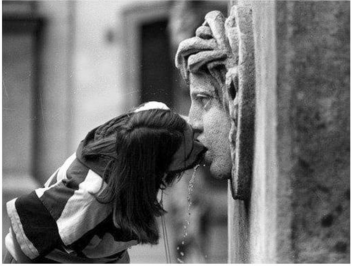
Henri Cartier Bresson Over de spreker
Jacqueline Klooster is universitair docent Griekse Letterkunde aan de Rijksuniversiteit Groningen. Zij heeft gepubliceerd op het gebied van Hellenistische poëzie en rond het thema schrijvende machthebbers in de oudheid. Begin dit jaar verscheen ook een nieuwe literatuurgeschiedenis die zij samen met vier collega's op touw zette, getiteld Muze, vertel. Momenteel werkt zij met een beurs van het Lirafonds aan een boek over de explosie aan populaire hervertellingen van mythen vanuit een vrouwelijk perspectief.
Praktische informatie
Wanneer? woensdag 18 oktober 2023, om 19u30
Waar? auditorium 1 Jan Broeckx (Blandijnberg 2, 9000 Gent)
Prijs? gratis voor leden van het Griekenlandcentrum, UGent studenten (m.u.v. PhD-studenten) en scholieren. Anderen betalen €5 aan de kassa.
-
Ma28Aug2023Vrij01Sep20239u-13uleslokaal 2.21 en 2.22 (Blandijnberg 2, 9000 Gent)
Zomercursus Oudgrieks
zomercursusToon detailsGedurende vijf voormiddagen dompelen we je onder in de Oudgriekse taal. De lessen zijn een voorproefje van het vak Oudgriekse Taalbeheersing dat in eerste Bachelor wordt onderwezen. We differentiëren tussen leerlingen met en zonder voorkennis Grieks. Elke voormiddag maak je via een korte gastles ook kennis met telkens een ander aspect van ons programma Grieks. In de namiddag organiseert de Klassieke Kring, onze studentenvereniging, vrijblijvend middagactiviteiten.
-
Vrij09Jun202320:00NTGent Schouwburg (Sint-Baafsplein 17, 9000 Gent)
'Antigone in de Amazone': theatervoorstelling
Griekenlandcentrum, publiek evenementToon detailsMilo Rau maakt een politieke Antigone voor de 21ste eeuw, samen met inheemse mensen, activisten en acteurs uit Brazilië en Europa.
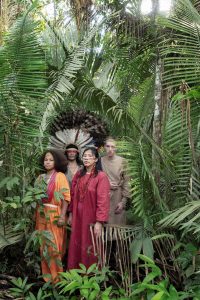
De rol van Antigone wordt vertolkt door de inheemse actrice Kay Sara. Het koor door overlevenden van het grootste bloedbad dat de politie aanrichtte tegen landloze boeren.
Voor Antigone in de Amazone reisden Milo Rau en zijn team naar de Braziliaanse staat Pará waar de bossen branden om plaats te maken voor de sojateelt en waar het kapitalisme de natuur verslindt. Op een bezet stuk land creëert het team in samenwerking met deMovimento dos Trabalhadores Sem Terra, ’s werelds grootste organisatie van ‘landlozen’, een allegorisch stuk over de gewelddadige verwoestingen en ontheemding door de moderne staat, die privébezit belangrijker acht dan het traditionele recht op land.
Het creatieproces voor Antigone in de Amazone werd in 2020 onderbroken: het team moest terugkeren uit Brazilië door de coronapandemie. In de herfst van 2022 reizen de makers terug om de voorstelling eindelijk af te werken en tijdens seizoen 2022-2023 de première te presenteren.
Nadat hij voor Orestes in Mosul naar de voormalige hoofdstad van de Islamitische Staat trok en de voor de Jezusfilm The New Gospel naar de vluchtelingenkampen in Zuid-Italië, reist Milo Rau nu met zijn team naar het Amazonewoud in Brazilië om er zijn Trilogie van Klassieke Mythen te voltooien.
Praktische informatie
- vrijdag 9 juni 2023, om 20u00
- NTGent Schouwburg (Sint-Baafsplein 17, 9000 Gent)
- EN, PT, TUCANO gesproken; NL, EN boventiteld
- meer info op de website van NTGent
Het Griekenlandcentrum heeft voor jullie 30 tickets ter beschikking, voor een gereduceerde prijs van 13 euro.
Geïnteresseerd? Stuur vóór 21 mei een mailtje naar griekenlandcentrum@ugent.be en schrijf het bedrag over op het rekeningnummer BE69 8803 2505 0178 (bevestiging volgt nadien).
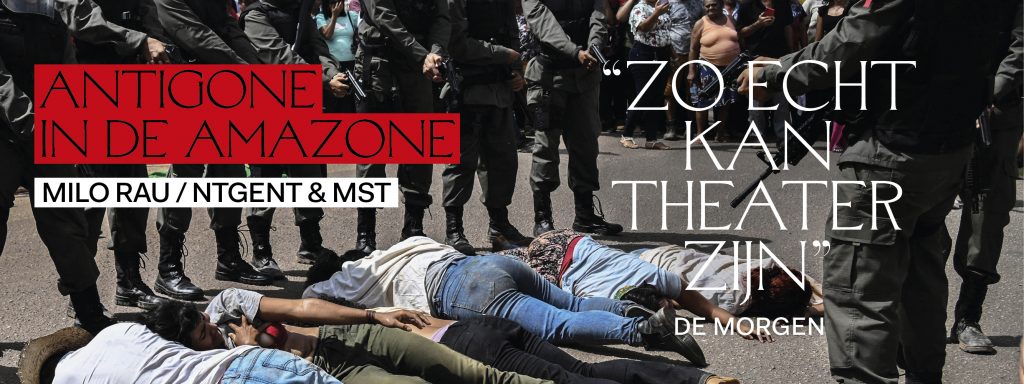
-
Woe24Mei202309:00Blandijnberg 2, 9000 Gent
Workshop on Editorial Practices of Byzantine Texts
workshopToon detailsDuring the past few decades, scholars have initiated debates about the methodologies of editing Byzantine texts. Several questions that had not been asked before, especially in relation to the specificity of Byzantine texts and manuscripts, have finally come to the forefront.
The intellectual authorship of a Byzantine text and its physical materialization often overlap and interact with each other. Many manuscripts, if not literally autographs, stand very close to the original version of texts. Sometimes, there is not even one single original, but the different versions are the reflection of authorial drafts or later elaborations. Manuscripts are often nonuniform and unstable, and present a complex and multilayered hierarchy of texts. Also, the changing linguistic reality of the Middle Ages in tension with a strong school tradition of grammar produces texts that invite the interventions of editors.
This workshop gathers together a group of scholars willing to share their reflections and experiences with editing medieval Byzantine texts. The workshop will address these and other similar questions:
- How should editors deal with punctuation and accentuation? Which are the meaningful practices in manuscripts? And how do these relate to the oral performance and visual layout of texts?
- How should editors reproduce unconventional orthography, linguistic flexibility and the fluctuation of registers? Which role does “school grammar” play in this respect?
- Which is the role of literary genres and textual types? How should editions mark intertextuality and parallels? And what about the case of metaphrasis and rewriting?
- What is the best way to edit texts that depend on other texts, such as commentaries and marginal scholia? And how can editors synoptically display the layers of successive annotations and textual expansions?
- Why and how should we edit unfinished and preliminary texts, especially when a more accomplished version is preserved? Similarly, how should we treat apographa, especially the late copies of pre-Byzantine texts?
Programme
Date: Wednesday 24 May 2023
Location: leslokaal 0.4 (Blandijnberg 2, 9000 Gent)
9-9.30: Introduction (Floris Bernard - Julián Bértola)
9.30-10.10: “The challenges of editing rhetorical texts” (Antonia Giannouli)
10.10-10.50: “The complexities of editing florilegia” (Alessandra Bucossi)
10.50-11.10: Coffee break
11.10-11.50: “Editing Andronikos Kallistos’ works: Problems, remarks, solutions” (Luigi Orlandi)
11.50-12.30: “Editing Aristotle's Organon in 1495: The models for Aldus Manutius's Editio princeps of the First Analytics” (José Maksimczuk)
12.30-14: Lunch break
14-14.40: “A liturgical poem on the passion of Christ (BHG 413m) and its editorial challenges” (Maria Tomadaki)
14.40-15.20:
“Open traditions: Use and reuse of book epigrams” (Rachele Ricceri)
15.20-15.40: Coffee break
15.40-16.20: “Between Symeon the Logothete and Theophanes Continuatus: How to edit the intermediary versions (Logothete B)” (Staffan Wahlgren)
16.20-17: “Byzantine linguistic reality and the edition of texts” (Martin Hinterberger)
17-17.30: Wrap-up session
Registration
This event is open for anyone who is interested to attend in person or online (a link will be sent the day before the conference).
To attend the conference, please register here.
-
Ma22Mei2023Din23Mei202309:30Campus Boekentoren (UGent)
Crash Course in Greek Palaeography
OIKOS, workshopToon detailsThe Greek department of Ghent University offers a two-day course in Greek palaeography in collaboration with the Research School OIKOS. The course is intended for MA, ResMA and doctoral students in the areas of Classics, Ancient History, Ancient Civilizations and Medieval studies with a good command of Greek. It offers a chronological introduction into Greek palaeography from the Hellenistic period until the end of the Middle Ages and is specifically aimed at acquiring practical skills for research involving literary and documentary papyri and/or manuscripts. We will also provide the unique opportunity to read from original papyri in the papyrus collection of the Ghent University Library and become familiar with the ongoing research projects at Ghent University.
Programme
The course is set up as an intensive two-day seminar. Five lectures by specialists in the field will give a chronological overview of the development of Greek handwriting, each followed by a practice session reading relevant extracts from papyri and manuscripts in smaller groups under the supervision of young researchers.
Monday, May 22
9:30 Welcome with coffee
10:00 Introduction
10:30-11:45 Papyri of the Ptolemaic and Roman period (Dr. Joanne Stolk)
11:45-13:00 Practice with papyri of the Ptolemaic and Roman period
13:00-14:00 Lunch break
14:00-14:30 Presentation of papyri from the collection of the Ghent University Library (Serena Causo)
14:30-15:45 Papyri of the Byzantine period (Dr. Yasmine Amory)
15:45-17:00 Practice papyri of the Byzantine period
19:00 Dinner (optional)
Tuesday, May 23
9:00-10:15 Majuscule and early minuscule bookhands (4th-9th centuries) (Dr. Rachele Ricceri)
10:15-11:30 Practice majuscule and early minuscule bookhands
11:30-12:00 Coffee break
12:00-13:15 The development of minuscule script (10th-12th centuries) (Prof. dr. Floris Bernard)
13:15-14:15 Lunch break
14:15-15:30 Practice minuscule script of the 10th-12th centuries
15:30-16:00 Coffee break
16:00-17:15 Manuscripts and scholars of the Palaeologan period (13th-15th centuries) (Prof. dr. Andrea Cuomo)
17:15-18:30 Practice manuscripts of the Palaeologan period
The teaching staff also includes Antonia Apostolakou, dr. Julián Bértola, Serena Causo, Anne-Sophie Rouckhout, Ricarda Schier, Nina Vanhoutte and dr. Grigory Vorobyev.
Practical information
The study load is the equivalent of 2 ECTS (2x28 hours). Participants will be asked to read up on secondary literature in preparation for the seminar (distributed several weeks before the course). Extra material will be handed out during the course in order to continue to improve your reading skills afterwards.
There are no fees for participation in this course. Lunches and coffee on both days are provided free of charge. There is an optional dinner on Monday at your own expense. Travel costs and accommodation in Ghent are also at your own expense.
Registration
Please register by sending an e-mail with a short motivation (including your background, research interests and why you would like to follow this course) to yasmine.amory@ugent.be. Priority is given to OIKOS doctoral students and those who did not have the opportunity to follow course(s) on palaeography before. Registration closes by the final deadline of March 1st, 2023. Successful applicants will be notified soon afterwards.
Workshop on Editorial Practices of Byzantine texts
We would like to draw your attention to a scientific workshop which will be organized in tandem with the Crash Course. This one-day workshop will take place in Ghent immediately following after the Crash Course (Wednesday May 24th) and will be devoted to editorial practices of Byzantine texts. It is organized by Julián Bértola and Floris Bernard (who are also teachers at the Crash Course). Experts will share experiences and insights concerning critical editions of Byzantine texts and manuscripts. The program will be circulated soon. Crash Course participants are warmly invited to stay one day longer in Gent and make use of this opportunity to attend this scholarly conference.
-
Din16Mei202319:30Auditorium 1 Jan Broeckx (Blandijnberg 2, 9000 Gent)
Gonda Van Steen, Child Adoption from Cold War Greece: Research and Activism
Griekenlandcentrum, lezing, publiek evenementToon details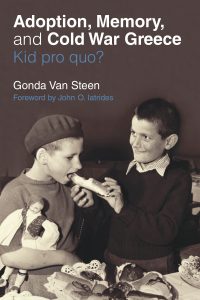 Voorsmaakje
VoorsmaakjeGreece facilitated the migration of some 4,000 of its children for adoption overseas. Between 1950 and 1970, the vast majority of these Greek-born children went to couples in the USA, but some 600 Greek infants and toddlers were sent to the Netherlands. These countries were the largest recipients of Greek “orphans,” who are more appropriately called “adoptees”, because, in many cases, one or both parents were still alive but did not have the means or family support to keep their child. I have recently documented the history of the postwar and Cold War Greek adoption movement in my book Adoption, Memory, and Cold War Greece (U Michigan Press, 2019). From that study came numerous meetings with the Greek-born adoptees and now also a campaign of activism for what they hope Greece will still grant them: their records, their restored citizenship, and further research on this sensitive topic.
Over de spreker
Gonda Van Steen holds the Koraes Chair of Modern Greek and Byzantine History, Language and Literature in the Department of Classics at King’s College London. She is the author of five books: Venom in Verse: Aristophanes in Modern Greece; Liberating Hellenism from the Ottoman Empire; Theatre of the Condemned: Classical Tragedy on Greek Prison Islands; and Stage of Emergency: Theater and Public Performance under the Greek Military Dictatorship of 1967-1974. Her latest book, Adoption, Memory, and Cold War Greece (2019), takes the reader into the uncharted terrain of Greek adoption stories that become paradigmatic of Cold War politics and history.
Praktische informatie
Wanneer? dinsdag 16 mei 2023, om 19u30
Waar? auditorium 1 Jan Broeckx (Blandijnberg 2, 9000 Gent)
Prijs? gratis voor leden van het Griekenlandcentrum, UGent studenten (m.u.v. PhD-studenten) en scholieren. Anderen betalen €5.
Vooraf inschrijven via https://humanitiesacademie.ugent.be/grenzeloos-grieks is verplicht voor zowel leden als niet-leden.
- registreer je eenmalig op https://humanitiesacademie.ugent.be/
- klik op de knop “toevoegen aan mijn winkelmandje”
- afrekenen doe je door rechts bovenaan op het winkelkarretje te klikken
- duid bij het afrekenen aan welk tarief op jou van toepassing is
- volg de instructies die je krijgt in de bevestigingsmail
-
Woe19Apr202319:30leslokaal 0.4 (Blandijnberg 2, 9000 Gent)
Hero Hokwerda, De grote Griekse wereld van Kavafis
Griekenlandcentrum, lezingToon details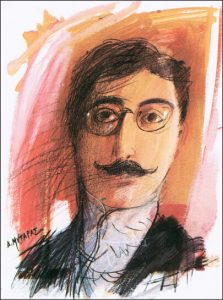
Voorsmaakje
‘Kijk... Zelf ben ik ook Helleens. Denk erom, niet Helleen en ook niet helleniserend, maar Helleens’, zo heeft de dichter Kavafis eens gezegd. Wat wilde hij daarmee zeggen? En wat is ‘hellenisme’ bij Kavafis? Wij gebruiken die term doorgaans voor de paar eeuwen na Alexander de Grote, vóór de Romeinse overheersing van het Oosten, maar daarmee kom je er niet bij Kavafis.
Een beschouwing naar aanleiding van de samenstelling, vertaling en becommentariëring van een uitvoerige bloemlezing uit al het proza van Kavafis (voor de zomer van 2023 te verschijnen) en van een nieuwe vertaling van zijn 154 “erkende” gedichten (najaar 2023), beide bij de Historische Uitgeverij te Groningen.
Over de spreker
Hero Hokwerda (Noordhorn, 1949) heeft in Groningen en Thessaloníki klassieke talen en Middel- en Nieuwgrieks gestudeerd. Van 1979-2014 was hij voor de helft universitair docent Nieuwgriekse taal- en letterkunde, tot 2002 aan de Rijksuniversiteit Groningen en daarna aan de Universiteit van Amsterdam (vanaf 2007 als ‘plaatsvervangend leerstoelgroephouder’), voor de andere helft vertaler van Nieuwgriekse literatuur. Dat laatste is hij nog steeds (zie https://literairvertalen.org/vertalersbestand/hero-hokwerda). Verder is hij redacteur van uitgeverij Ta Grammata (reeksen Obolos, met Griekse poëzie, en Grieks Proza, met in totaal ca. zestig titels, zie www.tagrammata.nl).
Praktische informatie
Wanneer? woensdag 19 april 2023, om 19u30
Waar? leslokaal 0.4 (Blandijnberg 2, 9000 Gent)
Prijs? gratis voor leden van het Griekenlandcentrum, UGent studenten (m.u.v. PhD-studenten) en scholieren. Anderen betalen €5.
Vooraf inschrijven via https://humanitiesacademie.ugent.be/grenzeloos-grieks is verplicht voor zowel leden als niet-leden.
- registreer je eenmalig op https://humanitiesacademie.ugent.be/
- klik op de knop “toevoegen aan mijn winkelmandje”
- afrekenen doe je door rechts bovenaan op het winkelkarretje te klikken
- duid bij het afrekenen aan welk tarief op jou van toepassing is
- volg de instructies die je krijgt in de bevestigingsmail
-
Zat15Apr202315:00Standaard Boekhandel Gent Kouter (Kouter 31, 9000 Gent)
Gunnar De Boel, Nikos Kachtitsis en het mythologische Gent
BoekvoorstellingToon detailsDe Griekse auteur Nikos Kachtitsis publiceerde in 1967 zijn modernistische roman « O íroas tis Gándhis », Nederlandse vertaling « De held van Gent » door professor-emeritus Gunnar De Boel (UGent). « Uniek werk, belangrijke vertaling », beoordeelde criticus Willem Nijssen deze vreemde detectiveroman, die een mengsel is van mystery, fantasy en symbolisme, met goed merkbare invloeden van Maurice Maeterlinck, Edgar Allan Poe en Multatuli. Nikos Kachtitsis (1926-1970) bouwde op zijn Tolkiens rond de stad Gent een uitgebreide mythologie op, waarvan maar een klein deel de weg naar het gepubliceerde boek gevonden heeft. Roman en auteur worden door Gunnar De Boel tijdens deze boekvoorstelling uitgebreid toegelicht. Een voorproefje op https://biblio.ugent.be/publication/1251791 en op https://literairgent.be/lexicon/kachtitsis-nikos.
De boekvoorstelling gaat door in de Standaard Boekhandel, Kouter 31, Gent, op zaterdag 15 april om 15u.
Toegangsprijs: gratis.
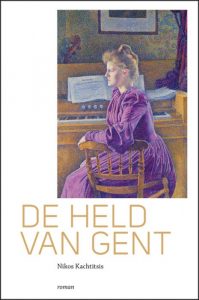
-
Woe29Mar202319:30leslokaal 0.4 (Blandijnberg 2, 9000 Gent)
Bram Fauconnier, Grieken in het oosten. Interculturele contacten in Centraal-Azië en India
Griekenlandcentrum, lezingToon detailsVoorsmaakje
De eerste vijf eeuwen voor onze jaartelling werden gekenmerkt door een toename van interculturele contacten op het Euraziatische continent. In die periode traden de Griekse en de Indische cultuur voor het eerst met elkaar in contact. In deze lezing onderzoekt Bram Fauconnier op welke manier die vroege contacten tussen West en Oost de beeldvorming over India in latere eeuwen heeft beïnvloed, en omgekeerd hoe moderne fenomenen als kolonialisme en globalisering hun stempel hebben gedrukt op het onderzoek naar Grieks-Indische contacten. Tegelijk bespreekt hij de belangrijkste kenmerken van die interculturele contacten aan de hand van literaire, archeologische, epigrafische en numismatische bronnen.
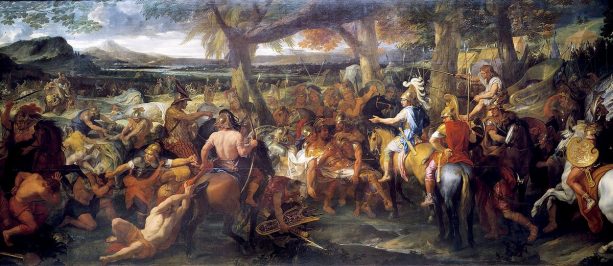
Over de spreker
Bram Fauconnier is doctor in de Oude Geschiedenis. Hij deed onderzoek aan de universiteiten van Leuven, Mannheim, Amsterdam en Gent. Tussen 2012 en 2013 studeerde hij aan de Universiteit van Delhi, India, waar hij zich toelegde op interculturele contacten tussen de Griekse en de Indische wereld in de oudheid. In 2015 doceerde hij over dat thema aan de universiteit van Mannheim. Daarnaast deed hij onderzoek naar atleten en artiesten in het Romeinse Rijk. In februari 2022 verschijnt zijn boek over dat thema bij Cambridge University Press. Vandaag werkt hij als leerkracht aan het Heilig Hartinstituut in Heverlee, maar zijn passie voor Griekse en Indische geschiedenis is gebleven.
Praktische informatie
Wanneer? woensdag 29 maart 2023, om 19u30
Waar? leslokaal 0.4 (Blandijnberg 2, 9000 Gent)
Prijs? gratis voor leden van het Griekenlandcentrum, UGent studenten (m.u.v. PhD-studenten) en scholieren. Anderen betalen €5.
Vooraf inschrijven via https://humanitiesacademie.ugent.be/grenzeloos-grieks is verplicht voor zowel leden als niet-leden.
- registreer je eenmalig op https://humanitiesacademie.ugent.be/
- klik op de knop “toevoegen aan mijn winkelmandje”
- afrekenen doe je door rechts bovenaan op het winkelkarretje te klikken
- duid bij het afrekenen aan welk tarief op jou van toepassing is
- volg de instructies die je krijgt in de bevestigingsmail
-
Woe22Feb202319:30leslokaal 0.4 (Blandijnberg 2, 9000 Gent)
Yasmine Amory, People of Aphrodite. Life and culture in a late antique Egyptian village
Griekenlandcentrum, lezingToon detailsVoorsmaakje
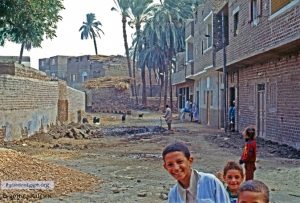 In 1905, during some restoration works in a private house in the Egyptian village of Kom Ishgaw, around seventy kilometres south of the city of Asyut, a crevice in a wall disclosed a large number of papyrus scrolls. The archaeological excavations that followed this fortuitous discovery brought to light a jar full of papyri. On top of the jar, as to secure its contents, there was a codex made of four lost comedies by Menander. The whole documentation belonged to a single family: the private archive of Dioscorus of Aphrodite was then discovered.
In 1905, during some restoration works in a private house in the Egyptian village of Kom Ishgaw, around seventy kilometres south of the city of Asyut, a crevice in a wall disclosed a large number of papyrus scrolls. The archaeological excavations that followed this fortuitous discovery brought to light a jar full of papyri. On top of the jar, as to secure its contents, there was a codex made of four lost comedies by Menander. The whole documentation belonged to a single family: the private archive of Dioscorus of Aphrodite was then discovered.The approximately 650 documents that compose the archive make it the largest one from Late Antiquity. Written in Greek and Coptic, they range from private letters to petitions, imperial rescripts, rent contracts, and tax receipts. But they also include literary pieces – some of them, from the pen of Dioscorus himself! Through a close examination of the archive, we will retrace the lives and sorrows of the inhabitants of the village of Aphrodite, as well as of its headman Dioscorus, who is today infamously known as “the worst poet of Antiquity”.
Over de spreker
Yasmine Amory was trained in Classics at the University of Florence and at the École Pratique des Hautes Études (Paris), where she received her Master's degree (2014). She obtained her PhD title at the École Pratique des Hautes Études in 2018 with a dissertation on the Greek letters of the archive of Dioscorus of Aphrodite, the richest papyrological archive from Byzantine age. After joining Ghent University as a post-doctoral research fellow within the ERC project “Everyday writing in Graeco-Roman and Late Antique Egypt (I – VIII AD). A socio-semiotic study of communicative variation”, she is now leading a project on politeness theory and multimodality in Greek documentary papyri (Special Research Fund, 2021-2024).
Praktische informatie
Wanneer? woensdag 22 februari 2023, om 19u30
Waar? leslokaal 0.4 (Blandijnberg 2, 9000 Gent)
Prijs? gratis voor leden van het Griekenlandcentrum, UGent studenten (m.u.v. PhD-studenten) en scholieren. Anderen betalen €5.
Vooraf inschrijven via https://humanitiesacademie.ugent.be/grenzeloos-grieks is verplicht voor zowel leden als niet-leden.
- registreer je eenmalig op https://humanitiesacademie.ugent.be/
- klik op de knop “toevoegen aan mijn winkelmandje”
- afrekenen doe je door rechts bovenaan op het winkelkarretje te klikken
- duid bij het afrekenen aan welk tarief op jou van toepassing is
- volg de instructies die je krijgt in de bevestigingsmail
-
Din31Jan2023
Workshop: The Reuse of Ancient and Late Antique Narratives in the Medieval Middle East and Beyond
Novel Saints, workshopToon detailsWe are delighted to invite you to a one-day workshop on The Reuse of Ancient and Late Antique Narratives in the Medieval Middle East and Beyond.
The workshop will be held in the Zaal August Vermeylen in Het Pand (Onderbergen 1, Gent, Belgium) on January 31st, 2023, and will be streamed online via Microsoft Teams.
The workshop focuses on the reception of ancient and late antique narratives across languages and cultures in the Middle Ages and brings together participants from Latin, Greek, Middle Eastern, Iranian, and Georgian studies.
Please register here by January 25th. Please email Mara Nicosia (mara.nicosia@ugent.be) if you have any queries.
For the full programme, please see https://www.novelsaints.ugent.be/event/the-reuse-of-ancient-and-late-antique-narratives/.
-
Woe25Jan202319:30UGent Filmzaal (Paddenhoek 3, 9000 Gent)
'La Rose Blanche', het laatste Griekse café van Molenbeek: filmvoorstelling met inleiding & nagesprek
Griekenlandcentrum, publiek evenementToon details'La Rose Blanche', het laatste Griekse café van Molenbeek
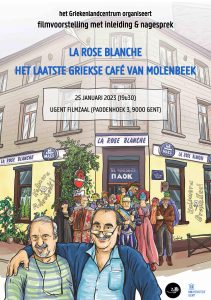 ● België - 2019
● België - 2019
● 75 min. (excl. inleiding & nagesprek)
● O.V. - ondertitels NL/FR
● Crossover Cinema door Kris Kaerts - Wilbur Lemson – Poli Roumeliotis
● Regie: Kris KaertsCafé ‘La Rose Blanche’ is het laatste Griekse volkscafé van Molenbeek. Al 50 jaar is het in handen van de familie Karassavidis die vluchtelingenroots heeft in huidig Turkije. Hun klanten vertegenwoordigen bijna elke migratiegolf die over Molenbeek heenspoelde. Op een voorbeeldige manier weten deze hardwerkende Grieken hun pappenheimers in elkaar te klikken. Hoe lang nog? Een docu-film over een donker Molenbeek in transitie. De rebetikomuziek daarbij klinkt rauw maar vrolijk.
Bekijk hier de trailer!
Het Griekenlandcentrum organiseert de Gentse première van deze film in bijzijn van de filmmakers Kris Kaerts en Poli Roumeliotis. Vier jaar lang maakten zij een reis doorheen heden en verleden in Molenbeek. Met vele vrijwilligers en sympathisanten realiseerden ze een meerlagig project waarvan deze film een onderdeel is en een samenvatting. Doordat hun zoektocht zoveel materiaal opleverde, besloten ze er ook een boek aan te wijden. Hierover willen ze graag getuigen in een nagesprek na de filmvertoning. Het boek kan ter plekke ook aangeschaft en gesigneerd worden.
Praktische informatie
Wanneer? woensdag 25 januari 2023, om 19u30
Waar? UGent Filmzaal (Paddenhoek 3, 9000 Gent)
Prijs? Leden van het Griekenlandcentrum, studenten en scholieren genieten van een kortingstarief en betalen €5. Anderen betalen €7.
Inschrijven? Schrijf je in via dit formulier en schrijf het bedrag (€5/€7 per ticket) over op het rekeningnummer BE69 8803 2505 0178 (bevestiging volgt nadien). Let op: je inschrijving is pas definitief, wanneer het bedrag op bovenstaand rekeningnummer staat!
De plaatsen zijn beperkt, dus snel zijn is de boodschap!
-
Woe07Dec.202219:30leslokaal 0.4 (Blandijnberg 2, 9000 Gent)
Raymond Detrez, Grieken op de Balkan: What's in a name?
Griekenlandcentrum, lezingToon detailsVoorsmaakje
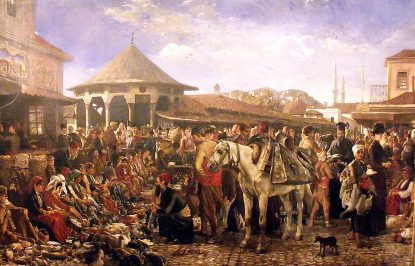 Onder de Osmanen leefden Grieken verspreid over het hele Balkanschiereiland. Buiten de gebieden met een compacte Griekse, ook rurale bevolking, die zich vandaag grotendeels binnen de grenzen van Griekenland bevinden, vormden ze van in de achttiende eeuw als handelaars en hogere clerus een belangrijk deel van de stedelijke elite. Doordat religieuze identiteit als belangrijker werd beschouwd dan etnische – wat in de hand werd gewerkt door de Osmaanse administratieve indeling van de bevolking in millets (religieuze gemeenschappen) – bestonden er voor orthodox-christelijke niet-Grieken uit de dorpen die carrière maakten in de stad geen morele obstakels om zich te identificeren met de Griekse bovenlaag. De termen Griek en Romeos sloegen bijgevolg niet alleen op etnische Grieken, maar ook op Osmaanse orthodoxe-christenen in het algemeen en op bepaalde beroepscategorieën en sociale klassen. Het onderscheid tussen etnische en andere “Grieken” was irrelevant; iedereen was immers in de eerste plaats orthodox christen. Pas met de opkomst van het nationalisme in de negentiende eeuw werden betrokkenen gedwongen om te kiezen voor een of andere nationaliteit. Wat deze situatie in de praktijk betekende wordt in de lezing geïllustreerd aan de hand van de Griekse carrière van de Bulgaarse dichter Grigor Părličev/Grigorios Stavridis uit het Macedonische Ohrid en de gudilas, vergriekste Bulgaarse immigranten in de Thracische stad Plovdiv/Filippoupolis.
Onder de Osmanen leefden Grieken verspreid over het hele Balkanschiereiland. Buiten de gebieden met een compacte Griekse, ook rurale bevolking, die zich vandaag grotendeels binnen de grenzen van Griekenland bevinden, vormden ze van in de achttiende eeuw als handelaars en hogere clerus een belangrijk deel van de stedelijke elite. Doordat religieuze identiteit als belangrijker werd beschouwd dan etnische – wat in de hand werd gewerkt door de Osmaanse administratieve indeling van de bevolking in millets (religieuze gemeenschappen) – bestonden er voor orthodox-christelijke niet-Grieken uit de dorpen die carrière maakten in de stad geen morele obstakels om zich te identificeren met de Griekse bovenlaag. De termen Griek en Romeos sloegen bijgevolg niet alleen op etnische Grieken, maar ook op Osmaanse orthodoxe-christenen in het algemeen en op bepaalde beroepscategorieën en sociale klassen. Het onderscheid tussen etnische en andere “Grieken” was irrelevant; iedereen was immers in de eerste plaats orthodox christen. Pas met de opkomst van het nationalisme in de negentiende eeuw werden betrokkenen gedwongen om te kiezen voor een of andere nationaliteit. Wat deze situatie in de praktijk betekende wordt in de lezing geïllustreerd aan de hand van de Griekse carrière van de Bulgaarse dichter Grigor Părličev/Grigorios Stavridis uit het Macedonische Ohrid en de gudilas, vergriekste Bulgaarse immigranten in de Thracische stad Plovdiv/Filippoupolis.Over de spreker
Raymond Detrez doceerde van 1997 tot 2013 Oost-Europese geschiedenis en cultuurgeschiedenis en Cultuurkunde van Griekenland aan de UGent. De jongste jaren gaat zijn belangstelling voornamelijk uit naar pre-nationale, met name religieuze gemeenschappen op de Balkan in de achttiende en de vroege negentiende eeuw.
Praktische informatie
Wanneer? woensdag 7 december 2022, om 19u30
Waar? leslokaal 0.4 (Blandijnberg 2, 9000 Gent)
Prijs? gratis voor leden van het Griekenlandcentrum, UGent studenten en scholieren. Anderen betalen €5.
Vooraf inschrijven via https://humanitiesacademie.ugent.be/grenzeloos-grieks is verplicht voor zowel leden als niet-leden.
- registreer je eenmalig op https://humanitiesacademie.ugent.be/
- klik op de knop “toevoegen aan mijn winkelmandje”
- afrekenen doe je door rechts bovenaan op het winkelkarretje te klikken
- duid bij het afrekenen aan welk tarief op jou van toepassing is
- volg de instructies die je krijgt in de bevestigingsmail
-
Woe16Nov.202219:30leslokaal 0.4 (Blandijnberg 2, 9000 Gent)
Aleksey Yudin, Griekse aanwezigheid aan de noordkust van de Zwarte Zee van de oudheid tot heden
Griekenlandcentrum, lezingToon detailsVoorsmaakje
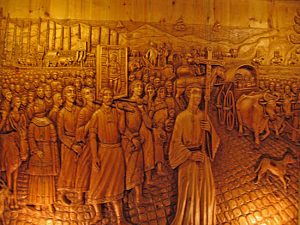 De Griekse aanwezigheid aan de noordkust van de Zwarte Zee heeft een traditie van meer dan 2500 jaar en gaat terug tot de eerste oude Griekse kolonies. Hoe komt het dat dit tegenwoordig bijna onmerkbaar is? Deze lezing zal bespreken hoe de Byzantijnse naam van het volk "Romeinen" tot op de dag van vandaag bewaard is gebleven, hoe het Russische rijk een speciale stad voor de Grieken heeft gebouwd en hoe de Russische Federatie deze heeft vernietigd, waarom in het Russisch de denigrerende naam van de Grieken nu verwijst naar de Amerikanen, waarom etnische Grieken in Oekraïne nu vaak Russische achternamen dragen, hoe Odessa het centrum van de Griekse nationale bevrijdingsbeweging werd, en hoe de Grieken op het einde van de 20e eeuw het Griekse plein in Odessa lelijk hebben gemaakt, om er vervolgens in de 21e eeuw een prachtig park aan te leggen.
De Griekse aanwezigheid aan de noordkust van de Zwarte Zee heeft een traditie van meer dan 2500 jaar en gaat terug tot de eerste oude Griekse kolonies. Hoe komt het dat dit tegenwoordig bijna onmerkbaar is? Deze lezing zal bespreken hoe de Byzantijnse naam van het volk "Romeinen" tot op de dag van vandaag bewaard is gebleven, hoe het Russische rijk een speciale stad voor de Grieken heeft gebouwd en hoe de Russische Federatie deze heeft vernietigd, waarom in het Russisch de denigrerende naam van de Grieken nu verwijst naar de Amerikanen, waarom etnische Grieken in Oekraïne nu vaak Russische achternamen dragen, hoe Odessa het centrum van de Griekse nationale bevrijdingsbeweging werd, en hoe de Grieken op het einde van de 20e eeuw het Griekse plein in Odessa lelijk hebben gemaakt, om er vervolgens in de 21e eeuw een prachtig park aan te leggen.Over de spreker
Aleksey Yudin, geboren in 1965, afgestudeerd aan de Faculteit der Filologie van de Universiteit van Odessa (Oekraïne). In 1992 verdedigde hij zijn proefschrift over "Problemen van de naamkunde van Russische bezweringen". In 1989-2000 werkte hij in verschillende instellingen voor hoger onderwijs van Odessa. Van 2000 tot heden is hij als universitair hoofddocent verbonden aan de vakgroep Talen en Culturen van de Universiteit Gent.
Praktische informatie
Wanneer? woensdag 16 november 2022, om 19u30
Waar? leslokaal 0.4 (Blandijnberg 2, 9000 Gent)
Prijs? gratis voor leden van het Griekenlandcentrum, UGent studenten en scholieren. Anderen betalen €5.
Vooraf inschrijven via https://humanitiesacademie.ugent.be/grenzeloos-grieks is verplicht voor zowel leden als niet-leden.
- registreer je eenmalig op https://humanitiesacademie.ugent.be/
- klik op de knop “toevoegen aan mijn winkelmandje”
- afrekenen doe je door rechts bovenaan op het winkelkarretje te klikken
- duid bij het afrekenen aan welk tarief op jou van toepassing is
- volg de instructies die je krijgt in de bevestigingsmail
-
Woe21Sep2022Zat24Sep2022Thagaste, 9000 Gent
International Conference on the Ancient Novel VI
congres, Novel SaintsToon detailsGhent University is delighted to announce we are organizing the sixth International Conference on the Ancient Novel in September 2022 (specific dates will be shared in early 2021). On this page, you can stay updated of our plans. A Call for Papers will be shared in Spring 2021.
-
Ma29Aug2022Vrij02Sep202209:00Blandijnberg 2
Zomercursus Oudgrieks
zomercursusToon detailsOverweeg je om volgend Taal- en Letterkunde te gaan studeren aan de Universiteit Gent? Wil je weten of Oudgrieks een taal is die bij jou past? Dan kan je deze zomer (van maandag 29 augustus tot vrijdag 2 september 2022) met de Oudgriekse taal kennismaken of je kennis van de Griekse grammatica opfrissen. De Vakgroep Oudgrieks aan de UGent biedt jou een gratis zomercursus aan met lessen Grieks, workshops en leuke activiteiten! Zowel leerlingen met als zonder voorkennis Grieks zijn bij ons welkom!
Meer informatie vind je in deze flyer zomercursus Grieks.
Inschrijven doe je via deze link.
-
Woe15Jun202220:00Auditorium 1 Jan Broeckx (Blandijnberg 2, 9000 Gent)
Arthur Bot, De tragedie ‘Erofili’ van Yeoryos Chortatsis (± 1600): een bloedig hoogtepunt van het Kretenzische renaissancetheater
Griekenlandcentrum, lezingToon detailsDeze lezing, die oorspronkelijk zou doorgaan op woensdag 15 december 2021, is uitgesteld naar het tweede semester en zal plaatsvinden op woensdag 15 juni 2022.
Voorsmaakje
In de meer dan 450 jaar van de Venetiaanse overheersing van Kreta (1211-1669), de belangrijkste koloniale Ventiaanse bezitting in het Oosten, vond er op Kreta, onder invloed van het Westen, een belangrijke opbloei van handel en economie plaats, een opbloei die samenging met de opkomst van de Kretenzische stadscultuur. Binnen deze ontwikkelingen namen de Venetianen geleidelijk de Griekse taal over, maar zorgden tevens voor een toenemende invloed van de westerse cultuur, een invloed die zich ondermeer manifesteerde in de beeldende kunst, de architectuur, de muziek en de literatuur.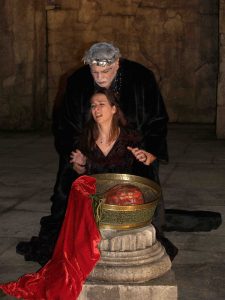
Yorgos Patsalakis en Anna Koutsaftiki als Filógonos en Erofili, Kreta 2005 Tot de tweede helft van de zestiende eeuw vertoonde de Kretenzische literatuur , naast zekere invloeden van de Italiaanse Renaissance, vooral invloeden van de Byzantijnse erfenis en van de westerse middeleeuwen. Pas na ca. 1570 zou de invloed van de westerse Renaissance van beslissende betekenis zijn voor het karakter van de Kretenzische literatuur. De periode 1570-1669 is bekend geworden als de Kretenzische Renaissance. Tijdens deze periode is een aantal literair zeer hoogstaande werken geschreven, met als coryfeeën de theaterwerken en de berijmde romance Erotókritos, waarvan overigens ook delen als een theaterstuk zijn opgevoerd. Deze werken zijn alle in een veredeld Kretenzisch dialect geschreven.
Uit het Kretenzische Renaissance-theater zijn een drietal tragedies en komedies bewaard gebleven, alsmede een religieus drama en een herdersspel. De Erofili is het bekendste en meest bestudeerde werk uit het Kretenzische theater en misschien wel de mooiste tragedie uit de Nieuwgriekse literatuur. Het werd waarschijnlijk geschreven tussen 1595 en 1600 door de Rethymnioot Yeoryos Chortatsis, de belangrijkste dramaschrijver uit de Kretenzische Renaissance en volgens de grote dichter Kostís Palamás ‘de vader van het moderne Griekse theater’. De eerste publicatie van het werk is in 1637, te Venetië.
De belangrijkste bron van het stuk is de Italiaanse tragedie Orbecche (1541) van Giambattista Giraldi Cinzio, maar de Kretenzische ‘bewerking’ overtreft in alle opzichten het oppervlakkige en uiterst bloedige origineel. De Erofili wordt nog steeds regelmatig opgevoerd en leeft ook voort in de volkscultuur en in (moderne) composities.
De lezing beoogt een eerste algemene kennismaking met het werk te bieden, waarbij een zekere nadruk op de karakterisering van de personages zal komen te liggen. Ook zullen we twee fragmenten uit monologen van de tragedie beluisteren, die door twee moderne componisten op muziek zijn gezet.
Over de spreker
Arthur Bot is vertaler en docent/onderzoeker bij de opleiding Nieuwgriekse taal en cultuur en byzantinologie van de Universiteit van Amsterdam, waar hij Nieuwgriekse taal en literatuur doceert, alsmede Byzantijnse geschiedenis. Aan de UvA heeft hij ook Italiaanse taalverwerving en moderne Nederlandse letterkunde gedoceerd. Gedurende enkele jaren heeft hij tevens Nieuwgriekse taal- en letterkunde en byzantinologie gedoceerd aan de Rijksuniversiteit Groningen en Latijn en klassiek Grieks aan Nederlandse middelbare scholen. Van zijn hand zijn diverse artikelen en wetenschappelijke publicaties op het gebied van de vroege en moderne Nieuwgriekse literatuur. Onder zijn vertalingen is de omvangrijke bloemlezing met 50 moderne Griekse verhalen, die hij samen met Anna Dekker samenstelde en vertaalde (Moderne Griekse vertellingen, Dordrecht, Liverse 2013). Onlangs heeft hij, samen met Irini Papakyriakou, een tweetalige bloemlezing samengesteld met moderne Nederlandse poëzie (Bloemlezing van jonge Nederlandse dichters, Athene, Bakchikon 2021). Arthur is sinds maart 2022 voorzitter van het Nederlands Genootschap voor Nieuwgriekse Studies (NGNS).
Praktische informatie
Wanneer? woensdag 15 juni 2022, om 20u
Waar? Auditorium 1 Jan Broeckx (Blandijnberg 2, 9000 Gent)
Prijs? gratis voor leden van het Griekenlandcentrum, UGent studenten en scholieren. Anderen betalen €5.
Vooraf inschrijven via https://humanitiesacademie.ugent.be/van-scene-tot-cinema is verplicht voor zowel leden als niet-leden.
- registreer je eenmalig op https://humanitiesacademie.ugent.be/
- klik op de knop “toevoegen aan mijn winkelmandje”
- afrekenen doe je door rechts bovenaan op het winkelkarretje te klikken
- duid bij het afrekenen aan welk tarief op jou van toepassing is
- volg de instructies die je krijgt in de bevestigingsmail
-
Din14Jun202216:00online: Zoom
Aglae Pizzone, Patrons and Heroes in the Book Epigrams of the Voss. Gr. Q1
Database of Byzantine Book Epigrams, lezingToon detailsThe last lecture in the online lecture series Speaking From the Margins. DBBE Online Lectures, Spring 2022 Series will be given by Aglae Pizzone (University of Southern Denmark).
Aglae Pizzone is a byzantinist with a training in classics. In her research she focuses on cultural history and history of the ideas. She is currently associate professor in Medieval Literature at the Danish Institute for Advanced Study, hosted by the University of Southern Denmark. She is interested in autography, self-commentaries in the Greek Middle Ages as well as in the Byzantine commentaries on Hermogenes. She has recently discovered new autograph notes by John Tzetzes in the Voss. Gr. Q1. She is PI in the MSCA Doctoral Network AntCom. From Antiquity to community: rethinking classical heritage through citizens humanities (2023-2027). Recent publications include Self-authorization and Strategies of Autography in John Tzetzes, Greek roman and Byzantine Studies, 60.4 (2020) 652-690; ‘Tzetzes and the prokatastasis: a tale of people, manuscripts, and performances’, in Prodi E. (ed.), ΤΖΕΤΖΙΚΑΙ ΕΡΕΥΝΑΙ. Bologna: Eikasmos, 2022, 49-104; and the volume, co-edited with Douglas Cairns, Martin Hinterberger and Matteo Zaccarini, Emotions through Time: From Greece to Byzantium. Heidelberg: Mohr Siebeck, 2022.
Abstract
Before the composition of the Histories, Tzetzes’ commentary on Aphthonios and Hermogenes in political verse, with its scope and sheer extension, was certainly meant to be the most representative among his mature work. It is therefore no surprise that the Vossianus Gr. Q1, a contemporary, “bespoke” witness of the commentary, is equipped with a series of metrical and prose paratexts providing details on the genesis of this specific copy. They are to be found at fol. 30r, after the end of the commentary on Aphthonios (6 hexameters), and at fols. 111v–112r after the end of the commentary on the four Hermogenian treatises and before the section of the Logismoi preserved by the manuscript (respectively 10 hexameters and 24 dodecasyllables). At fol. 112r there is also a prose note, detailing the problems encountered by Tzetzes after handing over the requested copy to its commissioners. The longer hexametric poem provides us with information about the commissioner, one Nikephoros who might be the mystikos Nikephoros Serblias mentioned in the letter-collection. It also describes Tzetzes in dialogue with the Muse, whom he persuades to dwell in the “lower regions” of poetry in political verse. The talk will walk the audience through these paratexts, illustrating their function both within the specific textual organization of the Vossianus Gr. Q1 and more broadly against Tzetzes’ poetics.
Practical information
Date & time: Tuesday 14 June 2022, 4:00pm (CET)
No registration required. The lecture is freely accessible via Zoom: https://ugent-be.zoom.us/j/92420884710?pwd=aFprM2FpamdEN0ZKK2c3ZTJSQkZMQT09.
- Meeting ID: 924 2088 4710
- Passcode: r7BFw3Bv
N.B.: A Zoom account is required to join this meeting. Please make sure to be logged in, using your Zoom credentials.
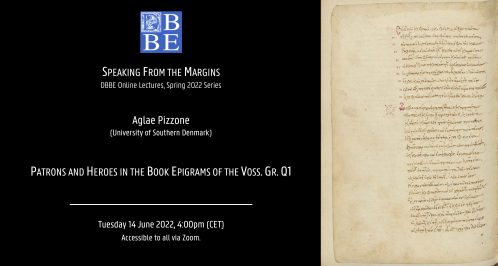
-
Ma23Mei2022Din24Mei202210:00UGent
OIKOS crash-course in Greek palaeography
congres, OIKOSToon details! UPDATE ! Due to the current COVID-19 restrictions, the Crash Course has been postponed to 23-24 May 2022.
The Greek department of Ghent University offers a two-day course in Greek palaeography in collaboration with the Research School OIKOS. The course is intended for MA, ResMA and doctoral students in the areas of Classics, Ancient History, Ancient Civilizations and Medieval studies with a good command of Greek. It offers an chronological introduction into Greek palaeography from the Hellenistic period until the end of the Middle Ages and is specifically aimed at acquiring practical skills for research involving literary and documentary papyri and/or manuscripts. We will also provide the unique opportunity to read from original papyri in the papyrus collection of the Ghent University Library and become familiar with the ongoing research projects at Ghent University.
Programme
The course is set up as an intensive two-day seminar. Five lectures by specialists in the field will give a chronological overview of the development of Greek handwriting, each followed by a practice session reading relevant extracts from papyri and manuscripts in smaller groups under the supervision of young researchers (Antonia Apostolakou, Dr. Julián Bértola, Serena Causo, Cristina Cocola, Anne-Sophie Rouckhout, Emmanuel Roumanis and Nina Vanhoutte).
Monday, may 23
10:00 Welcome
10:30-11:30 Papyri of the Ptolemaic and Roman period (Dr. Joanne Stolk)
11:30-13:00 Practice with papyri of the Ptolemaic and Roman period
13:00-14:00 Lunch break
14:00-15:00 Papyri of the Byzantine period (Dr. Yasmine Amory)
15:00-16:30 Practice papyri of the Byzantine period
16:30-17:00 Tour around the papyrus collection of the Ghent University Library
19:00 Dinner
Tuesday, may 24
9:00-10:00 Majuscule and early minuscule bookhands (4th-9th centuries) (Dr. Rachele Ricceri)
10:00-11:30 Practice majuscule and early minuscule bookhands
11:30-12:00 Coffee break
12:00-13:00 The development of minuscule script (10th-12th centuries) (Prof. dr. Floris Bernard)
13:00-14:00 Lunch break
14:00-15:30 Practice minuscule script of the 10th-12th centuries
15:30-16:00 Coffee break
16:00-17:00 Manuscripts and scholars of the Paleologan period (13th-15th centuries) (Prof. dr. Andrea Cuomo)
17:00-18:30 Practice manuscripts of the Paleologan period
Registration
Please register by sending an e-mail with a short motivation, including your background, research interests and why you would like to follow this course, to yasmine.amory@ugent.be. Priority is given to OIKOS doctoral students, beginners and those who did not have the opportunity to follow course(s) on palaeography before. Registration closes when the course is fully booked (20 participants) or by the final deadline of January 15, 2022. Participants receive 2 ECTS for completing the course.
If due to changing circumstances the course cannot take place in Ghent, the lectures will be offered online to the participants on the same dates. Practice sessions will be replaced by reading assignments with feedback by the teachers.
-
Woe18Mei202220:00Auditorium 1 Jan Broeckx (Blandijnberg 2, 9000 Gent)
Freddy Decreus, Over activisme, fictie en zwarte gaten. Milo Rau en zijn ‘Trilogie van oude mythen’
Griekenlandcentrum, lezingToon detailsVoorsmaakje
Wat hebben ‘Orestes in Mosul’ (2019), ‘Christus in Matera’ (2020) en ‘Antigone in Amazonia’ (2022) gemeen buiten hun mythische vraagstelling? Zeker verwijzen deze drie voorstellingen / films naar een narrativiteit die tot verbondenheid leidt, maar tegelijk spreken ze ook ons onvermogen aan om de leegte op te vullen die we in grote mate zelf zijn. Van bij zijn aantreden als artistiek leider van NTGent (2018) is Milo Rau in dit verband een begenadigd verteller van verhalen gebleken, van stories die mensen samenbrachten rond hun iconen (‘Lam Gods’) of koloniaal verleden (‘Compassie’), maar die ook indringende vragen stelden over de manier waarop wij omgaan met de vele ficties die wij in het Westen in het leven geroepen hebben.
De trilogie rond Orestes, Christus en Antigone vertoont een mythische, maar ook tragische dimensie die ons verontrust en tegelijk aantrekt, vooral wanneer geponeerd in gebieden die een bedreiging kunnen opleveren voor onze nachtrust en consumptiedrang (de olie van Mosul, de tomatenoogst in Zuid-Italië, de grootschalige boskap in Brazilië). Wat Milo Rau, -eredoctor aan onze universiteit sinds vorig jaar-, intrigeert zijn de trauma’s, open wonden en brandhaarden in elke samenleving, het ongehoorde, onvoorstelbare en onbegrijpelijke dat overal ter wereld zichtbaar is en door hem onder de vorm van tribunalen expliciet wordt getoond (Moskou, Zürich, Congo).
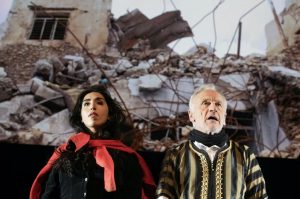
Foto: Fred Debrock Aan een publiek van klassiek geschoolde geesten stel ik dus de vraag of vormen van hedendaagse tragiek niet sterker werken dan de oud-Griekse tragedies, deze kunstvolle producten uit een classicisme waar wij heel familiair mee omgaan en vaak gereduceerd hebben tot burgerlijke dramas. Door welke tragische wonden worden wij vandaag nog echt verontrust en welk soort theater hoort thuis in een nieuwe tragische canon die ook Sarah Kane en Heiner Müller hoort in te sluiten? Durven wij in antropocene tijden ook ontdooiend permafrost, creatieve virussen en smeltende gletsjers tot de tragische dimensie rekenen waartegen wij onze zelf-definitie van mens moeten afzetten? Want zoals Kay Sara, de inheemse actrice die Antigone in het land van de Amazone speelt, zegde bij de (afgelaste) opening van de Wiener Festwochen in 2020: het probleem is niet ‘dat jullie niet weten dat onze bossen branden en onze volkeren sterven, het probleem is dat jullie je aan dit weten gewend hebben’ en dus niets doen om aan de tragedies die op ons afkomen het hoofd te bieden.
Over de spreker
Gevormd als klassieke filoloog aan de Universiteit Gent (1967-1971) startte Freddy Decreus daar een academische loopbaan op vanaf 1981 en was in de loop der jaren verantwoordelijk voor cursussen Klassiek Latijn, Literaire Theorievorming, Lerarenopleiding, Ritueel Theater, Mythologie en Receptiegeschiedenis. Publicaties handelen o.a. over theatergeschiedenis, tragedie en komedie in westers en postkoloniaal perspectief en de mythe in (post)moderne tijden. De laatste jaren publiceerde hij over het ritueel theater van Theodoros Terzopoulos (Attis, Athene), het activistische theaterwerk van Milo Rau (NTGent) en de metamorfoses in de kunst van beeldend kunstenaar Nick Ervinck. Samen met Gina D'harte gaf hij tot de recente vulkaanuitbarsting op La Palma daar jaarlijkse workshops over psychotherapie (Wilhelm Reich) en bioenergetica (Alexander Lowen). In Heusden hebben zij beiden het therapeutisch centrum ‘Huize Asclepius’ uitgebouwd. Als ‘ceremoniefluisteraar’ werkt hij thans ook mee aan ‘The House of Weddings’, waar hij alternatieve huwelijken en rituelen verzorgt.
Praktische informatie
Wanneer? woensdag 18 mei 2022, om 20u
Waar? Auditorium 1 Jan Broeckx (Blandijnberg 2, 9000 Gent)
Prijs? gratis voor leden van het Griekenlandcentrum, UGent studenten en scholieren. Anderen betalen €5.
Vooraf inschrijven via https://humanitiesacademie.ugent.be/van-scene-tot-cinema is verplicht voor zowel leden als niet-leden.
- registreer je eenmalig op https://humanitiesacademie.ugent.be/
- klik op de knop “toevoegen aan mijn winkelmandje”
- afrekenen doe je door rechts bovenaan op het winkelkarretje te klikken
- duid bij het afrekenen aan welk tarief op jou van toepassing is
- volg de instructies die je krijgt in de bevestigingsmail
-
Din17Mei202216:00online: Zoom
Manolis Patedakis, Some Aspects of Theodore Prodromos' Poetry in the Tetrasticha on Chapters From the Old and New Testament
Database of Byzantine Book Epigrams, lezingToon detailsThe fourth lecture in the online lecture series Speaking From the Margins. DBBE Online Lectures, Spring 2022 Series will be given by Manolis Patedakis (University of Crete).
Manolis S. Patedakis is Assistant Professor in Byzantine Philology. He completed his undergraduate (B.A.) and first level of postgraduate studies (M.A.) at the Department of Philology, University of Crete; he finished his dissertation for the doctoral degree (D.Phil.) at the University of Oxford in 2004, under the title “Athanasios I Patriarch of Constantinople (1289-1293, 1303-1309): A critical edition with introduction and commentary of selected unpublished works”. Between September 2007 and May 2008, he was Research Fellow at Dumbarton Oaks (Trustees for Harvard University), Washington, D.C. His special interests focus on texts and literature of the Palaeologan period, epigraphy and manuscript culture from medieval and early modern Crete, and Symeon the New Theologian. His publications include editions of Greek literary texts and inscriptions, including of the writings of Patriarch Athanasios I of Constantinople.
Abstract
The collection of poems by Theodore Prodromos known as the Tetrastichs both on the Old and the New Testament preserves certain interesting aspects as regarding the aesthetics and the spirit of his. Simple comments on biblical incidents to a more perplexed criticism addressed to sacred figures, monologues and dialogues –which sometimes become more dramatic– coloured with a sense of humour, or possible sarcastic references to the poet himself, are only a few amongst the attributes that we can mention for this group of poems. As the narration moves from the Old to the New Testament the reader wonders whether the logic slightly changes, and the new spirit of Christian art and art of speech also allows further connections between Prodromos’ poetics and other artistic and cultural means in twefth century Constantinople and Byzantium.
Practical information
Date & time: Tuesday 17 May 2022, 4:00pm (CET)
No registration required. The lecture is freely accessible via Zoom: https://ugent-be.zoom.us/j/94744052849?pwd=SndUT3NWd3FWZFBWbjNlbUJxSENaQT09.
- Meeting ID: 947 4405 2849
- Passcode: ka88aW3p
N.B.: A Zoom account is required to join this meeting. Please make sure to be logged in, using your Zoom credentials.
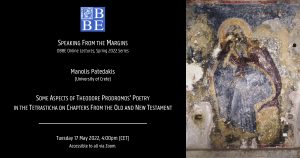
-
Do21Apr202216:00online: Zoom
Luise Marion Frenkel, The Diaphanous Reputation of Late Antique Patristic Authors on the Byzantine Folio
Database of Byzantine Book Epigrams, lezingToon detailsThe third lecture in the online lecture series Speaking From the Margins. DBBE Online Lectures, Spring 2022 Series will be given by Luise Marion Frenkel (University of São Paulo).
Luise Marion Frenkel has been assistant professor of classical Greek language and literature at the University of São Paulo since 2013. She holds one PhD in Mathematics from this university and one in Divinity from the University of Cambridge. She has been a visiting fellow of the British School at Rome and of ITSEE (Institute for Textual Scholarship and Electronic Editing) at the University of Birmingham. She has collaborated with a number of research groups, such as ‘Religious Individualisation in Historical Perspective’ in Erfurt, ‘Migration and Mobility in Late Antiquity and the Early Middle Ages’ in Tübingen and ‘Polyphony of Late Antique Christianity’ in Frankfurt. She has been a visiting scholar at St Edmund’s College, Cambridge. Her interests centre on orality, entextualisation and the transmission and reception of ancient texts. Most of her publications address the historiography of fourth- to seventh-century religious controversies in the Eastern Roman Empire and beyond.
Abstract
Manuscripts of most fourth- and fifth-century Christian leaders, thinkers, rhetors, historians and poets have remarkably empty margins, and DBBE suggests that canonical authors and their works were not a favourite subject for poets. Still, a number of book epigrams, often added by later hands, can be found. Surveying the book epigrams which can be linked to Origen, Eusebios of Caesarea, Athanasius of Alexandria, Cyril of Alexandria and Theodoret of Cyrrhus currently in DBBE, some tentative conclusions will be drawn about the relevance of text-related poems on Byzantine readers and audiences. Then, some occurrences found in Paris. gr 451, Florence Plut. 70, 7 and Basiliensis gr. A III 4 will be discussed, pointing to new avenues for DBBE and all interested in the transmission and Byzantine reception of patristic authors.
Practical information
Date & time: Thursday 21 April 2022, 4:00pm (CET)
No registration required. The lecture is freely accessible via Zoom: https://ugent-be.zoom.us/j/99015767396?pwd=S3dUQWdlNmJudWhNanRiUitNakxKZz09.
- Meeting ID: 990 1576 7396
- Passcode: u88fyAzq
N.B.: A Zoom account is required to join this meeting. Please make sure to be logged in, using your Zoom credentials.
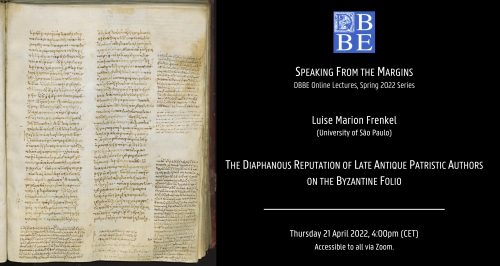
-
Woe20Apr202220:00Auditorium 1 Jan Broeckx (Blandijnberg 2, 9000 Gent)
Julie Van Pelt, Niet applaudisseren, alstublieft. Over theatervrees en performance in de Byzantijnse periode
Griekenlandcentrum, lezingToon detailsVoorsmaakje
Het mimespel en de pantomime, twee populaire theatervormen in het Romeinse keizerrijk, leefden verder tijdens de Vroegbyzantijnse periode. Ze bleven populair tot wel zeker de zesde eeuw o.t. Tegelijk was dit allerminst naar de zin van christelijke leiders, die het heidense spel verachtten en gelovigen krachtig opriepen het theater vooral te vermijden. De Byzantijnen ontwikkelden opvallend genoeg nooit een eigen theatervorm. Wanneer de antieke spelen dan toch eindelijk een stille dood stierven, is het enkele eeuwen wachten tot ze een Christelijke opvolger zouden kennen, en die kwam er enkel in het Westen. Als je de massa’s wil bezweren en ze tegelijk van ondeugdelijk vertier wil zien af te houden, waarom dan geen religieus en stichtelijk alternatief aanbieden? Het probleem ging echter verder dan de inhoud van de stukken alleen; theater zélf, als kunst- en representatievorm, werd als gevaarlijk en zelfs duivels beschouwd. Maar waarom dan? En kenden de Byzantijnen dan geen enkele vorm van publiek spektakel?
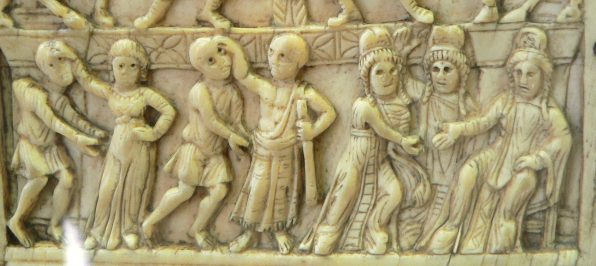
Over de spreker
Julie Van Pelt studeerde Taal- en Letterkunde Latijn-Grieks (2010-2013) en Vergelijkende Moderne Letterkunde (2013-2014) aan de Universiteit Gent. Ze behaalde een doctoraatstitel in Griekse Letterkunde and de Universiteit Gent in 2019 met een dissertatie over de representatie van vermomming en performance in Byzantijnse heiligenlevens. In haar huidig onderzoek bestudeert ze de figuur van de magiër en de literaire representatie van mirakel en magie in Griekse hagiografie.
Praktische informatie
Wanneer? woensdag 20 april 2022, om 20u
Waar? Auditorium 1 Jan Broeckx (Blandijnberg 2, 9000 Gent)
Prijs? gratis voor leden van het Griekenlandcentrum, UGent studenten en scholieren. Anderen betalen €5.
Vooraf inschrijven via https://humanitiesacademie.ugent.be/van-scene-tot-cinema is verplicht voor zowel leden als niet-leden.
- registreer je eenmalig op https://humanitiesacademie.ugent.be/
- klik op de knop “toevoegen aan mijn winkelmandje”
- afrekenen doe je door rechts bovenaan op het winkelkarretje te klikken
- duid bij het afrekenen aan welk tarief op jou van toepassing is
- volg de instructies die je krijgt in de bevestigingsmail
-
Vrij25Mar202211:00online
ONLINE LEZING: Koning Oedipus in Gent: de pest aan corona!
Festival, Festival européen latin grec, publiek evenementToon detailsOp het Festival Européen latin grec wordt elk jaar internationaal één Griekse of Latijnse tekst gelezen door mensen van over de hele wereld. Dit jaar is het weer de beurt aan een Griekse tekst en werd Sophocles’ Oedipus Tyrannus gekozen.
Wat? Onze Afdeling doet ook dit keer mee, en wel met een online publieke lezing/dramatisering van vier stukjes van de tekst op 25 maart 2022 van 11 tot 12u. We interviewen ook de fantastische acteur Bruno Vanden Broecke, bevlogen GEMS-voorzitter Erika Vlieghe, UGent data-analyst in covid-tijden Bart Mesuere, en onze UGent vice-rector Mieke Van Herreweghe.
Wil je erbij zijn? De online publieke lezing vindt plaats op 25 maart van 11u tot 12u. Iedereen is welkom om de lezing te volgen. Je hoeft hier niet voor in te schrijven. Meer praktische informatie volgt op deze pagina en op onze sociale media. Kan je er niet bij zijn? De video wordt nadien op onze website gepubliceerd.
Meer informatie op https://www.grieks.ugent.be/koning-oedipus-in-gent/
-
Woe23Mar202220:00Auditorium 1 Jan Broeckx (Blandijnberg 2, 9000 Gent)
Roald Docter, Het theater van Thorikos (Zuidoost-Attika): meer dan een koilon, orchestra en 35 scherven
Griekenlandcentrum, lezingToon detailsVoorsmaakje
Het theater is het bekendste, opvallendste en meest omstreden monument van Thorikos. Zijn eigenaardige, ellipsvormige vorm - soms primitief, archaïsch of gewoon onregelmatig genoemd - heeft zowel de plaatselijke bevolking als reizigers sinds de 18de eeuw gefascineerd. Het archeologische onderzoek van het theater begon in 1886 door de American School of Classical Studies at Athens. In 1963 en 1965 werd het onderzoek hervat door het Comité voor Belgische Opgravingen in Griekenland, en in 2011-12 door de Griekse Archeologische Dienst. Tijdens deze drie campagnes werd het theater gedeeltelijk opgegraven en werden de indrukwekkende steunmuren die het zijn eigenaardige geven blootgelegd. Het zitgedeelte (koilon) is in tweeën gedeeld; een kleine tempel van Dionysos en een altaar flankeren de langwerpige orchestra, evenals een raadselachtige kamer met een bank in het oosten en een langwerpige hal in het westen. Deze structuren werden opgericht in een vroegere marmer- en kalksteengroeve tussen twee oudere mijningangen en een begraafplaats uit de 6e-4e eeuw v.o.t..
Het Belgische onderzoek werd preliminair gepubliceerd, waarbij mede op basis van 35 scherven het theater de reputatie kreeg het vroegste theater in de Griekse wereld te zijn. Sinds zeven jaar bestudeert een team o.l.v. Andreas Kapetanios en Roald Docter de oude en nieuwe vondsten met het oog op een afsluitende publicatie. In deze lezing wordt de stand van zaken van dit onderzoek gepresenteerd.
De oudste theaters, vooral die van de landelijke chóra, waren sinds de democratische hervormingen Kleisthenes aan het einde van de 6de eeuw onlosmakelijk verbonden met de sociopolitieke organisatie van Athene, gestructureerd volgens het zogenaamde demes-en-trittyes-systeem. De theaters boden niet alleen onderdak aan dráma’s in het kader van festivals ter ere van Dionysos, maar fungeerden ook als ontmoetingsplaatsen voor mannen die hun plichten tegenover de Atheense democratische instellingen vervulden: debatten, arbitrage en benoemingen in de raad (boule) in Athene, en andere functies van de polis.
Over de spreker
Roald Docter is hoogleraar Archeologie en Kunstgeschiedenis van de Klassiek Griekse Oudheid aan de Universiteit Gent. Hij is (co-)directeur van archeologische veldwerkprojecten in o.a. Thorikos, Carthago en Malta.
Praktische informatie
Wanneer? woensdag 23 maart 2022, om 20u
Waar? Auditorium 1 Jan Broeckx (Blandijnberg 2, 9000 Gent)
Prijs? gratis voor leden van het Griekenlandcentrum, studenten en scholieren. Anderen betalen €5.
Vooraf inschrijven via https://humanitiesacademie.ugent.be/van-scene-tot-cinema is verplicht voor zowel leden als niet-leden.
- registreer je eenmalig op https://humanitiesacademie.ugent.be/
- klik op de knop “toevoegen aan mijn winkelmandje”
- afrekenen doe je door rechts bovenaan op het winkelkarretje te klikken
- duid bij het afrekenen aan welk tarief op jou van toepassing is
- volg de instructies die je krijgt in de bevestigingsmail
-
Do17Mar202216:00online: Zoom
Nina Sietis, Reading ‘la plume à la main’: Case Studies of Secondary Metrical Paratexts
Database of Byzantine Book Epigrams, lezingToon detailsThe second lecture in the online lecture series Speaking From the Margins. DBBE Online Lectures, Spring 2022 Series will be given by Nina Sietis (University of Cassino and Southern Lazio).
Nina Sietis is currently Assistant Professor (Ricercatrice a tempo determinato) at University of Cassino and Southern Lazio, were she contributes to the activities of the project MeMo – Memory of Montecassino (https://www.memo.pyle.it/) and teaches History of the Book. Her research interests lie primarily in Greek palaeography and codicology: she published papers and gave talks concerning different topics over the long course of Greek writing history.
Abstract
Medieval men used to read the manuscripts they came across «la plume à la main» and to leave notes on them. These texts are invaluable evidence for understanding interests and habits of readers during the Middle Ages. The aim of my paper is to show how metrical annotations added by later readers, namely what I call ‘secondary metrical paratexts’, offer an invaluable insight into the reconstruction of the links between different manuscripts and textual traditions. I will firstly focus on a prolific but anonymous reader from the late 11th century and the manuscripts he owned. The last part of my speech will be devoted to some notes added in the margins of manuscripts of the Monastery of St. John Prodromos of Petra in Constantinople.
Practical information
Date & time: Thursday 17 March 2022, 4:00pm (CET)
No registration required. The lecture is freely accessible via Zoom: https://ugent-be.zoom.us/j/97360235794?pwd=YzB6djIzT3FqWDJHb2VNb05BcmZOZz09.
- Meeting ID: 973 6023 5794
- Passcode: t7pA7uEu
N.B.: A Zoom account is required to join this meeting. Please make sure to be logged in, using your Zoom credentials.
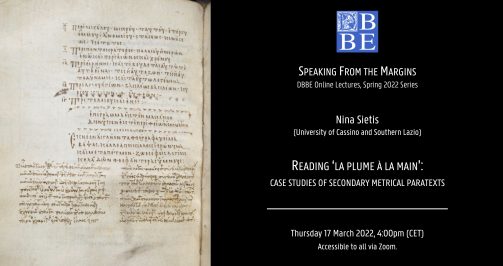
-
Do17Feb202216:00online: Zoom
Brad Hostetler, Ekphrasis and Epigrams on Byzantine Art
Database of Byzantine Book Epigrams, lezingToon detailsThe first lecture in the online lecture series Speaking From the Margins. DBBE Online Lectures, Spring 2022 Series will be given by Brad Hostetler (Kenyon College).
Brad Hostetler is Assistant Professor of Art History at Kenyon College. He specializes in the art and material culture of Late Antiquity and Byzantium, with a particular emphasis on portable luxury objects from the ninth through the twelfth centuries. His research focuses on the relationships between texts and images, including ekphraseis about, and words inscribed on, works of art. He is currently working on a book that examines the nature and meaning of relics and reliquaries in Byzantium through the lens of inscriptions, including the ways in which inscribed texts mediate and guide the faithful’s engagement with, and understanding of, sacred matter. Brad’s work has been supported by grants and fellowships from the Gladys Krieble Delmas Foundation, Dumbarton Oaks Research Library and Collection, and the Metropolitan Museum of Art.
Abstract
The term “ekphrastic epigram” has been used to denote verse inscriptions that describe works of art. But, as has been demonstrated, this term is a misnomer as these poems are not technically ekphraseis. Prose was traditionally the medium of choice for ekphraseis; the need to achieve the vividness of speech was more difficult in verse, given its metrical constraints. Inscribed epigrams therefore presented a double challenge in that they also constrained the writer to a limited number of verses that could be displayed on the object. As Marc Lauxtermann observes, epigrams inscribed on works of art are too short to elaborate on the “emotional depth and narrative width” that is required to develop ekphrastic themes.
While I agree with this assessment, I also suggest that Byzantine epigrams on works of art do exhibit some characteristics of ekphrasis, albeit in a much more abbreviated form. In this paper, I examine these features, and show the ways in which some inscribed epigrams possess rhetorical properties that are similar to those required for literary ekphraseis. Just as Nicholas Mesarites, for example, led the listener/viewer beyond the facts of the images in the Church of the Holy Apostles, and challenged his audiences’ perception of the mosaics through vivid description, so too do the poets of inscribed epigrams open up their descriptions to help the viewer consider their perceptions of objects.
Practical information
Date & time: Thursday 17 February 2022, 4:00pm (CET)
No registration required. The lecture is freely accessible via Zoom: https://ugent-be.zoom.us/j/96375525205?pwd=Q2Y4L2tRQ2VVakEzUXJta1NVVGpudz09.
- Meeting ID: 963 7552 5205
- Passcode: 750inUfB
N.B.: A Zoom account is required to join this meeting. Please make sure to be logged in, using your Zoom credentials.
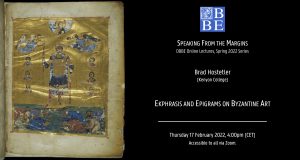
-
Woe16Feb202220:00NTGent Schouwburg (Sint-Baafsplein 17, 9000 Gent)
Khadija El Kharraz Alami, ‘Nu ben ik Medea’: theatervoorstelling & interview
GriekenlandcentrumToon detailsOp woensdag 16 februari brengt theatermaker en actrice Khadija El Kharraz Alami Nu ben ik Medea op de planken; een al meermaals in de prijzen gevallen theaterstuk waarin culturele spanningen op de voorgrond worden geplaatst aan de hand van Euripides’ Medea. Neem zeker en vast een kijkje op de site van NTGent voor een inleiding, biografie en trailer. De opvoering gaat door in de NTGent Schouwburg (Sint-Baafsplein), is Nederlands gesproken en vangt aan om 20:00. Na de voorstelling wordt een nabespreking voorzien.
We hebben voor jullie niet minder dan 30 tickets ter beschikking, voor een gereduceerde prijs van 13 euro.
Geïnteresseerd? Stuur vóór 10 februari een mailtje naar griekenlandcentrum@ugent.be en schrijf het bedrag (€13) over op het rekeningnummer BE69 8803 2505 0178 (bevestiging volgt nadien).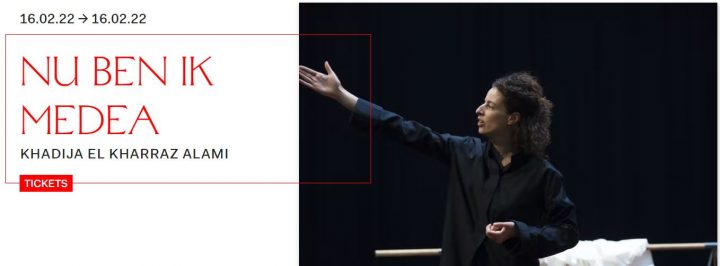
-
Vrij04Feb2022
Workshop: Ancient concepts of fiction and narrative in the imperial period and late antiquity
Novel Saints, workshopToon detailsWe are delighted to invite you to a one-day online workshop organized by the Novel Echoes ERC-project at Ghent University, as part of the Ghent-Kent-Lille cross-border research programme, taking place on February 4th 2022.
This is the first of a series of three workshops co-organised by the universities of Ghent, Kent, and Lille, organized with the aim of generating new insights on the distinctions between true, false, and plausible narratives in the Mediterranean region 100-700 CE, a period of transition from pluralist polytheism to a Christian Empire and from Antiquity to the Middle Ages. This period saw a flourishing of different kinds of narratives with differing claims to truth. How do such attitudes to truth, fiction, and lies and their interrelationship alter during this period and how is this manifest in the written narratives?
This first workshop explores in particular texts from Late Antiquity as an inflection point for these kinds of concerns. Recent scholarship has done much to encourage a more diverse and productive approach to pagan and Christian literature rather than seeing the two as a strict dichotomy, but more work remains to be done on both the sheer breadth of underexplored texts from this period and the diversity of their engagement with questions of truth and falsehood. This workshop aims to explore this crucial transition period by looking at a variety of works which test the boundaries of such binary periodizations and open up a more nuanced understanding of fiction between and across such diverse narratives.
All information and registration: https://www.novelsaints.ugent.be/event/fiction-in-transition/
-
Woe26Jan202214:00Zoom
Conference: Monsters in the classroom – Latin and Greek at primary school
congres, Oude Grieken - Jonge HeldenToon detailsThis international conference is dedicated to the teaching of Latin and Ancient Greek at Primary school, with talks and discussions by practitioners from Belgium, France, Germany, Greece, Italy, The Netherlands, the United Kingdom, and the United States. The conference is open to all: we invite teachers and students from all levels of education and other interested parties from any country to join the discussions on organization, pedagogy, and inclusivity.
Conference language: English. Simultaneous translation into French available.

When: 26 January 2022 from 2 to 6pm Central European Time on Zoom
More information and registration: https://www.oudegriekenjongehelden.ugent.be/conference/
-
Do16Dec.202120:00online: Zoom
Matthew Payne, ‘Translated word for word’? Re-examining the relationship between Greek and Roman Republican tragedy
Griekenlandcentrum, lezingToon detailsAangezien de lezing van Arthur Bot, die op 15 december gepland stond, uitgesteld werd, biedt het Griekenlandcentrum ter vervanging deze lezing aan.
(Her)bekijk deze lezing hier.
Voorsmaakje
Not a single Roman Republican tragedy is preserved for us in complete form. They survive to us in a disordered, lacunose, voiceless form, disconnected from the performance context which gave them meaning. And yet we can only ascribe these qualities to the fragments because we know that they once formed a complete play, with a continuous, meaningful text, ordered by a plot and performed a cast of characters embodied and voiced by actors in a theatre at one of Rome’s public festivals. But from the nineteenth century, serious attempts to restore some of these properties – their order, voicing and meaning in relation to the lost whole – began. Yet finding clues towards such reconstruction was complicated by the disjointedness between the fragments and their contexts. Indeed, the collection and publication of the fragments in dedicated editions from the sixteenth century amplified this dislocation. Instead, scholars looked backwards, to the far better documented Attic Greek tragedies, and particularly the thirty-two (relatively) complete tragedies by Aeschylus, Sophocles and Euripides. In this they were guided by the statements of Cicero and others that the Roman playwrights translated from the works of Greek tragedy, but what translation meant in the pre-Jeromian Roman world was often left under-interrogated.In this talk, I will use examples from Ennius’ works to investigate these issues, and show how different editors use Greek tragedy to offer creative responses to the frustration of the ambiguities of the Roman tragic fragment.
Over de spreker
Matthew Payne graduated in 2012 from the University of Cambridge with a degree in Classics, then came back to Cambridge to complete an MPhil in Classics in 2014. He then moved to the University of St Andrews in Scotland for a PhD. He completed his thesis, on aberration and criminality in Senecan tragedy, in 2018. Since September 2018 he has been a post-doctoral researcher at Leiden University in the Netherlands. His project concerns the surviving fragments of Roman tragedy. In 2021-22 he is a guest professor at the University of Gent, lecturing on Latin literature.
Praktische informatie
Wanneer? donderdag 16 december, om 20u
Waar? de lezing is gratis online te volgen via het platform Zoom: https://ugent-be.zoom.us/j/96373838398?pwd=ZHNVSG9BS1lkZVpNcTVxdFExWjNvUT09.
- Meeting ID: 963 7383 8398
- Passcode: wJmwy752
Om deze lezing te kunnen volgen, is een Zoom account vereist. Volg de stappen hieronder om de lezing bij te wonen.
(Indien je al een Zoom account hebt, kan je eenvoudigweg op de link hierboven klikken. Let op: zorg ervoor dat je ingelogd bent!)
- Download de Zoom app gratis op je computer of smartphone: https://zoom.us/download.
- Maak gratis een account aan: https://zoom.us/signup.
- Open de Zoom app.
- Meld je aan met je inloggegevens. Je kan er ook voor kiezen in te loggen met een Google- of Facebook-profiel.
- Klik op 'Join' en geef de Meeting ID en Passcode in.
- Je kan zowel je camera als microfoon uitschakelen alvorens de virtuele zaal te betreden.
-
Din14Dec.202116:00online: Zoom
Julián Bértola, Book Epigrams, Verse Scholia and Some Limit Cases: Versified Paratexts on Historiography and Their Interplay
Database of Byzantine Book Epigrams, lezingToon detailsThe last lecture in the online lecture series Speaking From the Margins. DBBE Online Lectures, Fall 2021 Series will be given by Julián Bértola (Ghent University).
Julián Bértola studied classical literature at the University of Buenos Aires. In 2016, he followed the Byzantine Greek Summer School at Dumbarton Oaks Research Library and Collection and in 2017 he moved to Belgium to do a PhD at Ghent University as part of the Database of Byzantine Book Epigrams (www.dbbe.ugent.be). In 2021, he completed his doctoral dissertation “Using Poetry to Read the Past: Unedited Byzantine Verse Scholia on Historians in the Margins of Medieval Manuscripts”. He is now a Postdoctoral fellow of the Research Foundation – Flanders (FWO) at Ghent University with the project “Byzantine scholia on historians and the literature of marginalia: reading and writing practices in the margins of medieval Greek manuscripts”.
Abstract
In this presentation I will investigate how other book epigrams can contribute to the study of verse scholia, my main research interest. Verse scholia constitute a special type of book epigrams since they comment on particular passages of the main text next to which they are copied. During my work with unedited cycles of verse scholia on historians, the co-occurrence in the manuscripts of a more common type of book epigrams, namely colophons, has proven to be of great help to better understand the context in which the verse scholia were produced.
My first case study is a long poem in hexameters (https://www.dbbe.ugent.be/types/6177), a scribal epigram that dedicates the volume to a patron of high social rank. I will introduce the verse scholia that occur together with this book epigram in two manuscripts of Herodotus from the 15th century. The court circulation of the exemplar from which our manuscripts derive could account for a certain didactic and gnomic tone of the verse scholia. The second case study is a shorter dodecasyllabic epigram at the end of the Vindobonensis Hist. gr. 53, a famous manuscript of Niketas Choniates (https://www.dbbe.ugent.be/types/33795). The colophon attests to the restoration of the manuscript on behalf of the bishop of Ainos. This information supports the evidence from the verse scholia copied in this manuscript that largely reproduce the wording of the chronicle in verse by Ephraim of Ainos. The manuscript and possibly its model may have been in Ainos where Ephraim composed the verse scholia. To conclude, I will present some limit cases: a poem in f. 168v of Vat. gr. 163 (Niketas Choniates) and https://www.dbbe.ugent.be/occurrences/17771 (John Zonaras). These are book epigrams that refer to specific passages, but do not correspond in full to the typology of verse scholia because of their position in the manuscript, their layout and their content.
Practical information
Date & time: Tuesday 14 December 2021, 4:00pm (CET)
No registration required. The lecture is freely accessible via Zoom. The link will be available soon.
N.B.: A Zoom account is required to join this meeting. Please make sure to be logged in, using your Zoom credentials.

-
Woe17Nov.202120:00Dienstencentrum Ledeberg (Ledebergplein 30, 9050 Ledeberg)
! GEANNULEERD ! Kristoffel Demoen, (On)eigen(tijdse) beschouwingen over Griekse tragedies
Griekenlandcentrum, lezing, NKV Oost-VlaanderenToon detailsOPGELET! Door omstandigheden zal deze lezing jammer genoeg niet kunnen plaatsvinden.
Word je van tragedie een (beter) mens? Is het tragisch als je favoriete ploeg verliest in de laatste minuut? Kan Antigone het klimaat redden? Valt er iets te leren of te louteren? Waarom spreekt een prof Griekse literatuur liever niet over “de Griekse tragedie” maar wel over enkele stukken van Sophokles en Euripides?
In feite zal hij wel wat algemeenheden in herinnering brengen over dat vreemde fenomeen van het Atheense theater, om dan te vertellen wat hem blijft aanspreken in vier stukken uit de latere vijfde eeuw: Ajax, Medea, Asielzoeksters, Philoktetes.
Over de spreker
Kristoffel Demoen is docent Griekse literatuur aan de universiteit Gent. Zijn onderzoek concentreert zich op de doorwerking en vertaling van klassieke teksten, thema's en vormen in de latere Griekse en Westerse literatuurgeschiedenis.
Praktische informatie
Wanneer? woensdag 17 november 2021 om 20u
Waar? Theaterzaal Dienstencentrum Ledeberg (Ledebergplein 30, 9050 Ledeberg)
i.s.m. NKV Oost-Vlaanderen
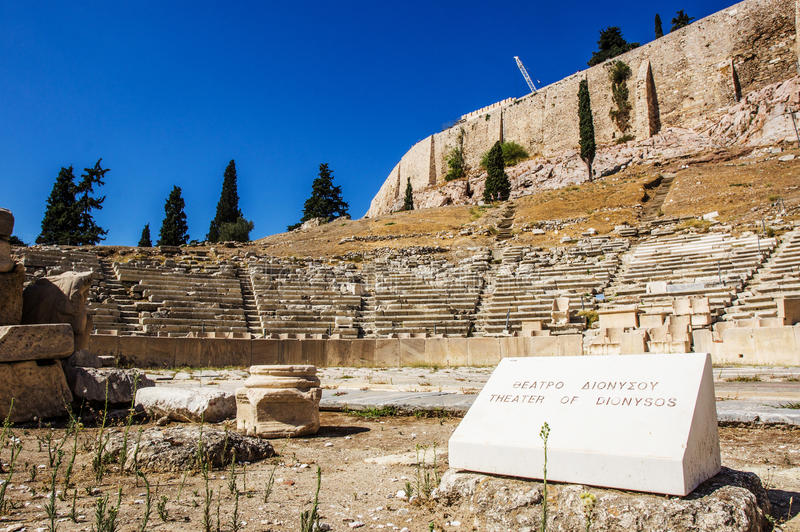
-
Din16Nov.202116:00online: Zoom
Ottavia Mazzon, Hidden Paratexts: The Transmission of Paratextual Elements Within Collections of Excerpts
Database of Byzantine Book Epigrams, lezingToon detailsThe third lecture in the online lecture series Speaking From the Margins. DBBE Online Lectures, Fall 2021 Series will be given by Ottavia Mazzon (University of Padua).
Ottavia Mazzon is currently Frances A. Yates Long-term Fellow at the Warburg Institute and a post-doc researcher at the University of Padua. Her research interests lie at the intersection of classical philology and book history, focusing on the readership and material reception of ancient Greek literature in Byzantium and in Renaissance Europe. Her first monograph, Leggere, selezionare e raccogliere excerpta nella prima età paleologa. La silloge conservata nel codice greco Neap. II C 32, is forthcoming with Edizioni dell’Orso (Hellenica, 99).
Abstract
Byzantine intellectuals frequently put together collections of excerpts aiming to preserve the most interesting passages they encountered while reading. Many of these have survived, especially from the Palaeologan period, allowing us to explore Byzantine scholars’ reading interests and to understand how they used their books. Whenever they read, Byzantine scholars did not exclusively focus on literary works they were studying. When consulting a codex, they also took notice of the paratexts and sometimes ended up transcribing them alongside the quotations they had selected from the main text; the paratexts thus became an integral part of excerpt collections.
The objective of my paper is to show how the DBBE is an effective tool for the identification of paratextual elements within an excerpt-collection and facilitates the reconstruction of the material characteristics of the manuscripts read by the excerptor(s), going so far as providing essential information for the recognition of the exemplar employed. I will do so by presenting examples from two excerpt collections from the early Palaeologan period which I have chosen as a case-study: the Rhodoniai of Makarios Chrysokephalos, preserved in MS Marc. gr. Z. 452 (coll. 796), and the excerpt-collection transmitted by MS Napoli, Biblioteca Nazionale, II C 32. The book epigrams preserved in the latter are partially known; Neap. II C 32 contains a poem summarizing the content of the Iliad, which accompanies the hypotheseis to each book (ff. 366r-371v).
Practical information
Date & time: Tuesday 16 November 2021, 4:00pm (CET)
No registration required. The lecture is freely accessible via Zoom: https://ugent-be.zoom.us/j/96553291684?pwd=SyticTAxYmpLVy9sYm5RNzFHYUJjQT09.
- Meeting ID: 965 5329 1684
- Passcode: 8u5s8CW3
N.B.: A Zoom account is required to join this meeting. Please make sure to be logged in, using your Zoom credentials.
-
Do21Okt202118:45Studio Skoop 1
Griekenlandcentrum gaat naar Film Fest Gent: "Landscape in the Mist"
GriekenlandcentrumToon detailsLandscape in the mist - THEO ANGELOPOULOS
21/10/2021, 18:45
Studio Skoop 1● Italië, Griekenland, Frankrijk - 1988 ● Originele titel: Topio stin omihli ● Lengte: 127 min. (excl. nabespreking) ● Gesproken taal: Grieks ● Ondertitels: Engels
Nabespreking door Giorgos Arvanitis - DOP (Director of Photography)
Voor wie nog nooit een film van Angelopoulos zag, is dit meesterwerk misschien wel de beste introductie. Deze magnifieke film over de zoektocht van twee kinderen - een meisje van twaalf en haar broertje van zes - naar de vader die ze nooit hebben gekend of die misschien niet eens bestaat, is ook emotioneel zijn meest directe werk. In strak gecomponeerde beelden toont hij hun diverse ontmoetingen, inwijdingen, beproevingen. Soms vluchtig, soms traumatiserend en culminerend in een finale van een adembenemende, droevige schoonheid. Vanuit een eenvoudig gegeven schept Angelopoulos de ene onvergetelijke scène na de andere. Hij toont ons de wereld in al zijn verbazende schoonheid (zoals de plotse sneeuwval die de personages doet bevriezen) en angstaanjagende afschuw (de verkrachting, buiten beeld, van het meisje door een vrachtrijder is een van de sterkste scènes die je ooit gezien zal hebben).
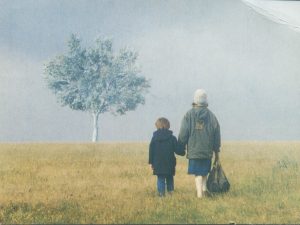
Geïnteresseerd? Stuur vóór 26 september een mailtje naar griekenlandcentrum@ugent.be met je naam en de film(s) die je graag wil meekijken, en schrijf het bedrag (€7,5, of €15 voor twee) over op het rekeningnummer BE69 8803 2505 0178 (bevestiging volgt nadien).
-
Din19Okt202116:00online: Zoom
Simon Zuenelli, The Ancient Legacy of the Byzantine Book Epigram
Database of Byzantine Book Epigrams, lezingToon detailsThe second lecture in the online lecture series Speaking From the Margins. DBBE Online Lectures, Fall 2021 Series will be given by Simon Zuenelli (Universität Innsbruck).
Dr Simon Zuenelli is Assistant Professor at Innsbruck University (Austria) and chief editor of the review journal Anzeiger für die Altertumswissenschaft. His research focuses on post-classical Greek poetry. He authored several contributions on Nonnus’ Dionysiaca and is currently preparing a monograph on the ancient Greek book epigram.
Abstract
As the DBBE effectively shows, the production of book epigrams was indeed a popular phenomenon in the Byzantine Middle Ages. Yet, the book epigram is not a Byzantine invention, but rooted in a long tradition going as far back as the Hellenistic period. The history of the ancient book epigram is currently being investigated in the project “The Ancient Greek Book Epigram”, funded by the Austrian Science Fund and carried out at Innsbruck University. In my paper, I would like to present some of the results gained so far, which can lead to a better understanding of the evolution of the Byzantine book epigram tradition. Accordingly, my paper will highlight the continuity of book epigram production between Antiquity and the Middle Ages.
More specifically, after a brief general introduction to the ancient Greek book epigram, the paper will firstly deal with the continuity on a generic level. To this end, the type of the ancient “scribe-related epigram”, where the aspect of continuity is particularly visible, will be discussed. Secondly, two important issues related to the practice of Byzantine book epigram production will be addressed, namely the question of visual presentation and that of textual fluidity (or textual recycling). Taking P.Lond.Lit 11 as an example, several striking parallels with the ancient book epigram tradition in regards of both phenomena will be presented. This analysis will eventually lead to the general discussion of how to determine the “origin” of single Byzantine book epigrams.
Practical information
Date & time: Tuesday 19 October 2021, 4:00pm (CET)
No registration required. The lecture is freely accessible via Zoom: https://ugent-be.zoom.us/j/99768938150?pwd=RkVaRlBLeGRxSTFXUmFoU1FvUWVWZz09.
- Meeting ID: 997 6893 8150
- Passcode: Pk1QAR6S
N.B.: A Zoom account is required to join this meeting. Please make sure to be logged in, using your Zoom credentials.
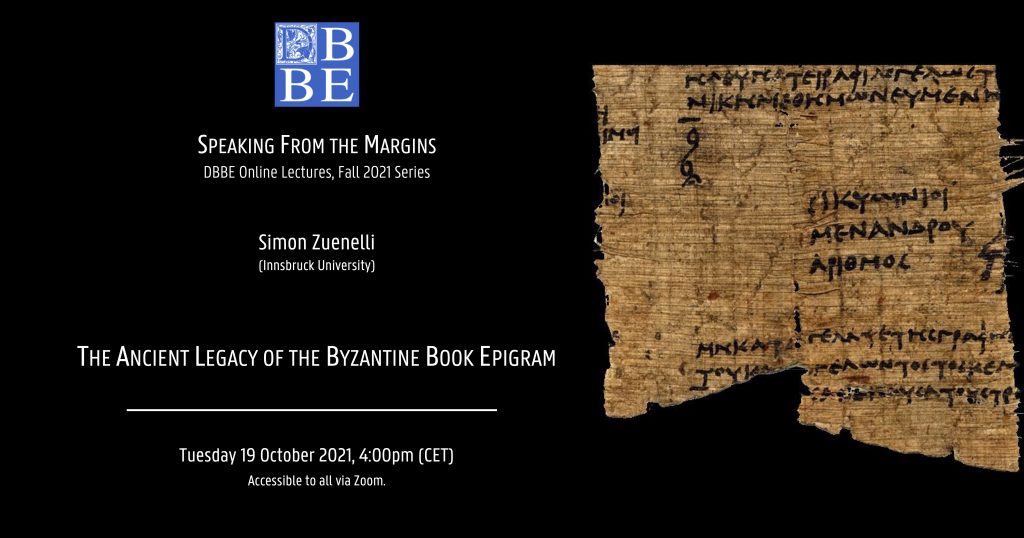
-
Do14Okt202119:45Studio Skoop 1
Griekenlandcentrum gaat naar Film Fest Gent: "The Travelling Players"
GriekenlandcentrumToon detailsThe Travelling Players - Theo Angelopoulos
14/10/2021, 19:45 (startuur inleiding)
Studio Skoop 1
● Griekenland - 1975 ● Originele titel: O thiasos ● Lengte: 230 min. ● Gesproken taal: Grieks, Engels, Duits ● Ondertitels: Engels
Inleiding door Patrick Duynslaegher - start 19:45, duur: 30 minuten
In dit bijna vier uur durend meesterwerk dramatiseert Angelopoulos in magistrale tableaus de historische omwentelingen in Griekenland van 1936 tot 1952. Een toneelgezelschap trekt met hetzelfde stuk van dorp tot dorp. Telkens weer wordt de voorstelling onderbroken door politieke evenementen, zoals de bezetting door de nazi’s en de naoorlogse strijd tussen fascisten en communisten. Het groepsportret krijgt een extra dimensie door de verwijzingen naar personages uit de Griekse tragedies. De onderlinge intriges leiden onbewust tot het naspelen van de tragedie van Elektra en Orestes. Angelopoulos introduceert hier zijn geheel eigen stijl, gedomineerd door lange plan-séquences waarmee hij door zijn hypnotiserende mise-en-scène binnen het beeld een verbluffende dynamiek creëert tussen individu en massa. Een van de meesterwerken uit de modernistische cinema van de jaren ‘70.
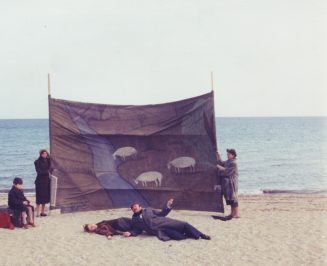
Geïnteresseerd? Stuur vóór 26 september een mailtje naar griekenlandcentrum@ugent.be met je naam en de film(s) die je graag wil meekijken, en schrijf het bedrag (€7,5, of €15 voor twee) over op het rekeningnummer BE69 8803 2505 0178 (bevestiging volgt nadien).
-
Din14Sep202116:00online: Zoom
Renaat Meesters, A Plea for a Database of Latin Book Epigrams
Database of Byzantine Book Epigrams, lezingToon detailsThe first lecture in the Fall 2021 Series of Speaking From the Margins. DBBE Online Lectures will be given by Renaat Meesters (Ghent University & KU Leuven).
Renaat Meesters was a heuristic collaborator (scribe) of the DBBE from 2011 to 2013 and obtained his doctoral degree in 2017 at Ghent University with a dissertation on Byzantine book epigrams on John Klimax. Since 2016 he is a teacher of Greek and Latin at the College of Essen and a voluntary postdoctoral researcher at Ghent University and KU Leuven.
Abstract
Since its inception in 2010, the DBBE has disclosed an important corpus of medieval Greek texts to the academic community, shedding new light on a plethora of aspects of Byzantine book culture. Regrettably, there is currently no similar project for the collection, cataloguing and edition of metrical paratexts written in Latin. Despite some examples of Latin epigrams which have received a certain measure of attention, this considerable corpus remains seriously understudied.
The purpose of this paper is to promote the idea of founding a Database of Latin Book Epigrams (DLBE), inspired by the DBBE. Therefore, a broad overview of the corpus will be sketched by presenting some Latin book epigrams, mostly selected from manuscripts preserved in the Royal Library of Belgium (KBR) in Brussels. These examples will be compared to Byzantine book epigrams that reveal similar generic features. The observation that Byzantine and Latin book epigrams have a lot in common, underlines the feasibility of setting up a database of Latin book epigrams, which may lead to a better and more thorough understanding of mediaeval book culture in general and of book epigrams in particular.
Practical information
Date & time: Tuesday 14 September 2021, 4:00pm (CET)
No registration required. The lecture is freely accessible via Zoom: https://ugent-be.zoom.us/j/94069376394?pwd=NzNtVzRjTlphNzgzS25GSUxsQ2tzUT09.
- Meeting ID: 940 6937 6394
- Passcode: iLtrHAu2
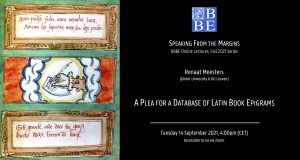
-
Zat26Jun202110u30-11u00 en 11u30-12u00Blandijnberg 2, 9000 Gent
Rondleidingen Grieks op de campus
Toon detailsOp zaterdag 26 juni organiseert de opleiding Taal- en Letterkunde een aantal rondleidingen op de Blandijnberg, het gebouw waar de meeste lessen in onze opleiding plaatsvinden. We voorzien rondleidingen per taal van telkens een half uur. De rondleidingen Grieks vinden plaats van 10u30 tot 11u00 en van 11u30 tot 12u00.
De rondleiding is bedoeld om studiekiezers kennis te laten maken met de opleiding en het gebouw waar de meeste lessen plaatsvinden. Alle studiekiezers die eraan denken om de opleiding te volgen maar nog een aantal vragen hebben, alsook zij die al gekozen hebben voor onze opleiding maar graag de omgeving eens zouden zien waar ze les zullen krijgen, zijn welkom.
Jullie worden begeleid door een lesgever Grieks. Hij/zij zal een korte uitleg geven en vragen beantwoorden over de opleiding Taal- en letterkunde en de taal in kwestie. Verder lopen we even doorheen het gebouw, langs enkele iconische plekken van de Blandijn, en kunnen de studenten boeken en cursusmateriaal inkijken.
Schema + Inschrijvingen: http://www.taalenletterkunde.ugent.be/infodagen
-
Din22Jun202116:00Online: Zoom
Georgi Parpulov, A Typology of Metrical Paratexts
Database of Byzantine Book Epigrams, lezingToon detailsThe last lecture in the online lecture series Speaking From the Margins. DBBE Online Lectures, Spring 2021 Series will be given by Georgi Parpulov (University of Birmingham).
Georgi Parpulov studied history at the University of Sofia and art history at the University of Chicago. His doctoral dissertation, subsequently revised as a book (2014), was a general study of Byzantine Psalters. Last month, he published Catena Manuscripts of the Greek New Testament (Piscataway: Gorgias) and Magnificent Icons in Bulgaria (Sofia: Methodius Books). (The word "magnificent" was added by the publisher.) His Middle-Byzantine Evangelist Portraits will be published by De Gruyter this winter or in 2022. He is now working on a History of Byzantine Illustrated Manuscripts.
Abstract
My talk will propose a schematic classification of Greek metrical paratexts that will hopefully be questioned and discussed by other conference participants. First, I distinguish between those metrical paratexts which have a more or less precise (potential or actual) prose equivalent and those which are essentially poetic and thus irreducible to prose. Second, there are metrical paratexts which refer to a book or to its contents and author, and there are Bildepigramme which pertain to images and thus need not necessarily occur in manuscript form. Bildepigramme can be further subdivided into ‘interior’ (i.e. as if spoken by a person whom the image depicts) and ‘exterior’ (as if spoken by the image’s viewer). The above points will be purposely illustrated with examples which have not found a place in Prof. Rhoby’s recent corpus.
Practical information
Date & time: Tuesday 22 June 2021, 4:00pm (UTC+2, CET)
For more information, see https://www.dbbe.ugent.be/news-events/58.
-
Vrij11Jun202116:00zoom
Nunzio Bianchi: From Babylon to Byzantium: Iamblichus' novel and its reception’
lezing, Novel SaintsToon detailsThe final lecture in the online seminar series 'Novel Echoes: Ethiopian and Babylonian Stories in Byzantium and Beyond' will be given by Dr Nunzio Bianchi (Università degli studi di Bari Aldo Moro) on 'From Babylon to Byzantium: Iamblichus' novel and its reception’
Please email evelien.bracke@ugent.be for the link.
See www.novelsaints.ugent.be for more information.
-
Do03Jun2021Vrij04Jun202107:30zoom - Blandijnberg 2
Congres: Enchanted reception: Religion and the supernatural in medieval Troy narratives
congres, Novel SaintsToon detailsEnchanted reception: Religion and the supernatural in medieval Troy narratives
Programme
Date: Thursday-Friday, 3-4 June 2021
Please register via this link: https://eventmanager.ugent.be/EnchantedReception
Enchanted Reception is a two-day workshop with the aim of exploring the place of enchantment, myth, and religion in both Eastern and Western medieval narratives about Troy, or narratives that are influenced by motifs related or parallel to the narrative of the Trojan war. Together with scholars specialising in the different language traditions of medieval literature, we aim to explore the following questions from a transnational approach:
• How did contemporary (e.g. literary and socio-cultural) developments influence medieval adaptations of the supernatural and pagan religion in medieval Troy narratives?
• What role does the Troy motif play in other literary works?
• How are rationalization and “Christianization” used to deal with the medieval unease evoked by certain aspects of ancient mythology?
• From a comparative perspective, how can we map such processes transnationally, e.g. in the different language and literature traditions of the medieval world?
• How do these questions engage with themes such as gender, sexuality, ethnicity and cross-cultural connections?For the programme, see https://www.novelsaints.ugent.be/event/enchanted-reception.
-
Din25Mei202116:00Online: Zoom
Sien De Groot, Reading and Writing the Areopagite. Book Epigrams as Witnesses to the Transmission of the Corpus Dionysiacum
Database of Byzantine Book Epigrams, lezingToon detailsThe fifth lecture in the online lecture series Speaking From the Margins. DBBE Online Lectures, Spring 2021 Series will be given by Sien De Groot (Ghent University).
After finishing her master’s degree in Classical Philology (Ghent University), Sien De Groot obtained a PhD position with the Database of Byzantine Book Epigrams. She is currently finishing a doctoral thesis on book epigrams in the Byzantine manuscripts of Ps.-Dionysius the Areopagite.
Abstract
When we want to understand how readers in the past approached texts, our source material is limited. We cannot simply ask ancient or medieval readers about their experience. Instead, we have to rely on what they have written about the texts they read, and on traces left in their books. Book epigrams are unique sources in this respect. As poems written to accompany certain main texts, they express the poet’s reaction to these texts. On the other hand, their presence in the manuscripts of the main texts creates a close connection between text and reception, and guides later readers through the book.
In this presentation, I will focus on book epigrams in the Greek manuscripts of Pseudo-Dionysius the Areopagite. As we will see, book epigrams preserved in these manuscripts are usually quite short. They convey the main focus of the texts and confirm the author’s pseudonym, but they do not engage thoroughly with the theological framework expressed in the corpus. On the other hand, the book epigrams were important in structuring the manuscripts, and have, most probably, acquired this function at an early stage in the history of the texts. In order to understand how these epigrams functioned within each manuscript and within the manuscript tradition as a whole, we will take into account non-textual evidence, such as the position of epigrams in the manuscripts, the visual presentation, and the moment at which the epigrams were added to the book. With this overview, I hope to shed light on the manifold interactions between readers, texts and books that occurred around the works of Pseudo-Dionysius.
Practical information
Date & time: Tuesday 25 May 2021, 4:00pm (UTC+2, CET)
No registration required. The lecture is freely accessible via Zoom: https://ugent-be.zoom.us/j/93448862359?pwd=TzgyajFZZWsxYXhVTm5zUU1KZ0d5dz09.
- Meeting ID: 934 4886 2359
- Passcode: JmVbX7wz
-
Woe12Mei202116:00zoom
Paolo Brusa: From wandering to destitution: a shift in Heliodoran peregrinatio in 17th century Spain’
lezing, Novel SaintsToon detailsThe fourth lecture in the online seminar series 'Novel Echoes: Ethiopian and Babylonian Stories in Byzantium and Beyond' will be given by Paolo Brusa (Freie Universität Berlin) on 'From wandering to destitution: a shift in Heliodoran peregrinatio in 17th century Spain’
Please email evelien.bracke@ugent.be for the link.
See www.novelsaints.ugent.be for more information.
-
Woe28Apr202117:00Online: Bongo Virtual Classroom
Julie Boeten & Sien De Groot - Verzen uit de marge (gehaald): een introductie op Byzantijnse boekepigrammen
Griekenlandcentrum, lezing, nascholingToon detailsMeer dan tweeduizend jaar na hun ontstaan worden de epen van Homerus, de tragedies van Sophocles en de dialogen van Plato nog steeds gretig gelezen. De teksten zijn vandaag overal beschikbaar, slechts een muisklik of een boekhandel van ons verwijderd. Dat is niet altijd zo geweest: het voortbestaan van de klassieke literatuur is te danken aan het - letterlijke - monnikenwerk van middeleeuwse scribenten, die antieke en vroegchristelijke teksten met de hand kopieerden. Daarom maken de grote namen in deze lezing even plaats voor minder bekende figuren, zoals Joasaph de Zondaar, Theodulus de Monnik en Basilius de Kalligraaf. Vaak lieten deze kopiisten tijdens hun werk verzen achter in de marges van de manuscripten, waarin ze zichzelf presenteren, of de auteur van de hoofdtekst prijzen. Deze gedichten noemen we boekepigrammen. In deze lezing verkennen we de Byzantijnse boekcultuur door de lens van die boekepigrammen. We presenteren de verschillende mensen die verbonden waren met manuscripten - de kopiist en de lezer, maar ook de persoon die voor de productie van het boek betaalde, of het klooster dat het boek later bezat. We tonen bovendien wat boekepigrammen ons kunnen vertellen over de waarde die Byzantijnen hechtten aan het manuscript als object. Op die manier hopen we de wereld rond die onbekende middeleeuwse handschriften wat meer tot leven te wekken.
Je kan deze lezing hier herbekijken.
-
Woe28Apr202120:00Locatie en tijdstip te bevestigen
! UITGESTELD ! Gunnar De Boel – Grieks: om een lang verhaal kort te maken...
Griekenlandcentrum, lezing, nascholingToon detailsLezing in het kader van de emeritaatsviering voor em. prof. dr. Gunnar De Boel.
-
Din27Apr202116:00Online: Zoom
Alessandra Palla, Manuscript Tradition and Cultural Perspectives: Investigating the Epigrams AP 2, vv. 372-376 and AP 9, 583
Database of Byzantine Book Epigrams, lezingToon detailsThe fourth lecture in the online lecture series Speaking From the Margins. DBBE Online Lectures, Spring 2021 Series will be given by Alessandra Palla (University of Hamburg).
Alessandra Palla graduated from the University of Pisa (Bachelor in “Lettere Classiche” and Master in “Scienze dell’Antichità e Archeologia”) and then received her joint PhD degree in “Scienze dell’Antichità e Archeologia” from the University of Pisa and at the University of Hamburg. She has obtained various international research grants and she is currently a postdoctoral researcher at the University of Hamburg, where she is conducting a project that involves editing, translating, and providing a commentary on Dionysius of Halicarnassus’ Epistula ad Ammaeum II. At the same time, she is working on the upcoming publication of her PhD thesis regarding the manuscript tradition of Dionysius’ Epistula and on other researches, mainly in the fields of Greek rhetoric, classical philology and Greek literature.
Abstract
The aim of my research is to provide a literary and critical analysis of the epigrams AP 2, 372-376 and AP 9, 583.
The first stage of my paper focuses on an overview regarding the manuscripts in which these epigrams are transmitted, namely the manuscripts that contain Thucydides’ Historiae, the so-called Dionysius of Halicarnassus’ Opuscula Rhetorica, and (in some cases) Marcellinus’ Vita Thucydidis, along with an anonymous Vita about the historian, and the manuscripts of Anthologia Graeca.
In the second stage, I analyze and reconstruct the epigrams’ transmission, combining textual evidences with other aspects, such as the epigrams’ position within the manuscripts, the cultural context in which they are transmitted and their reception in antiquity.
This research will provide a basis from which to develop a thorough and detailed study not only of the manuscript tradition of the epigrams AP 2, 372-376 and AP 9, 583 but also of their intellectual, cultural and historical function.
Practical information
Date & time: Tuesday 27 April 2021, 4:00pm (UTC+2, CET)
No registration required. The lecture is freely accessible via Zoom: https://ugent-be.zoom.us/j/99198629943?pwd=a0UxaXdFVmR5MXJneEgxRytCY3ZzUT09.
- Meeting ID: 991 9862 9943
- Passcode: L75La5fW
-
Do22Apr202116:00zoom
Ellen Söderblom Saarela: ‘She must write her self, she did write her self: Hysmine’s voice from within the wrong’
lezing, Novel SaintsToon detailsThe third seminar in the online series 'Novel Echoes: Ethiopian and Babylonian Stories in Byzantium and Beyond' is by Dr Ellen Söderblom Saarela (UGent) on ‘She must write her self, she did write her self: Hysmine’s voice from within the wrong’.
Please email evelien.bracke@ugent.be for the zoom link.
-
Do01Apr202117:30zoom
Silvia Montiglio: 'The popularity of Heliodorus among Byzantine critics and readers'
lezing, Novel SaintsToon detailsThe second lecture in the online seminar series 'Novel Echoes: Ethiopian and Babylonian Stories in Byzantium and Beyond' will be given by Professor Silvia Montiglio on ‘The popularity of Heliodorus among Byzantine critics and readers’.
Please email evelien.bracke@ugent.be for the link.
See www.novelsaints.ugent.be for more information.
-
Din30Mar202116:00Online: Zoom
Jacopo Marcon, Παῦλος ὁ μύστης τῶν ἀπορρήτων λόγων: On the Use of the Book Epigrams in New Testament Catenae on Paul
Database of Byzantine Book Epigrams, lezingToon detailsThe third lecture in the online lecture series Speaking From the Margins. DBBE Online Lectures, Spring 2021 Series will be given by Jacopo Marcon (University of Birmingham).
In 2018, Jacopo Marcon obtained his MA in Classical Philology cum laude, at the University of Udine, with a thesis in Latin Palaeography (the catalogue of medieval manuscripts of Giusto Fontanini, from the Biblioteca Guarneriana in San Daniele del Friuli). Currently, he is a third-year PhD student at the department of Theology and Religion of the University of Birmingham. He is part of the ERC Project: CATENA: Commentary Manuscripts in the History and Transmission of the New Testament and is currently working on the first-ever critical edition of the Ps. Oecumenian Catena on the Romans (title of the thesis: The Edition of the Ps. Oecumenian Catena on Romans).
Abstract
This presentation aims to investigate the use of epigrams in the Byzantine New Testament Catenae, with a particular focus on the so-called Ps. Oecumenian Catenae on the Pauline Letters. I will analyze the position, the structure, the content, and the function of the byzantine book epigrams to reveal new interesting features in the history of Catenae and commentaries on Paul.
First, I will generally introduce the New Testament Catenae. These are biblical manuscripts with the text of the New Testament alongside the exegetical chain of comments made up of multiple extracts from the Greek Church Fathers. Second, I will consider the so-called paratextual features of the biblical Catenae on the Pauline Epistles, where most of the book epigrams are present (the Euthalian Apparatus and the set of prefaces and subscriptions).
In doing so, I will investigate different types of book epigrams. For the first typology, that of the so-called text- or author-related epigrams, I will examine the cases of Paris, BnF, Gr. 219 (GA 91), 224 (GA 1934), and Coisl. 217 (GA 1972) and Venice, BNM, Gr. Z 34 (coll. 349) (GA 1924). In these manuscripts, alongside the text of the preface on the Pauline epistles in verses (ἡ τῶν ἐπιστολῶν ὑπόθεσις διὰ ἰάμβων), short book epigrams open the text of each of the Epistles.
In some other manuscripts, book epigrams (the so-called image-related epigrams) accompany miniatures of the apostle Paul, and the Greek Church Fathers, such as in the manuscripts Paris, BnF, Gr. 223 (GA 1933), and Gr. 224 (GA 1934)), or can be incorporated into the text of the colophons and notes of property (i.e. the scribe-related epigram in Vatican City, BAV, Bar. Gr. 503 (GA 1952), with the subscription of John Pepagomenos, or the patron-related epigram at the end of Athos, Mone Agiou Paulou 2 (GA 1862), regarding a βασιλισσα Μαρια).
Finally, my presentation explores the content and the textual tradition of some epigrams that have been overlooked, in Paris, BnF, Gr. 237 (GA 82), including one which seems to have been written in Arabic or Turkish but with Greek letters.
Practical information
Date & time: Tuesday 30 March 2021, 4:00pm (UTC+2, CET)
No registration required. The lecture is freely accessible via Zoom: https://ugent-be.zoom.us/j/95155014627?pwd=NjVXWmVQeXl5MzVUWFVjSVpLUUYvQT0
-
Ma29Mar2021Vrij02Apr2021Youtube - links via http://waaromgrieks.be/
Tussen school en σχολή
Toon detailsTussen school en σχολή
De kogel is door de kerk: de paasvakantie start nu een week vroeger. Maar wij maken van de nood een deugd voor onze leerlingen!
Classica Vlaanderen, leerkrachten Grieks en de universiteiten van Gent en Leuven hebben de handen in elkaar geslagen en voor volgende week een speciaal programma voor jullie gemaakt: Tussen school en σχολή.
Elke dag van de week wordt er een bijzondere les aangeboden (zeker gepast voor de derde graad maar iedereen is welkom). Het thema varieert: van Medusa* tot Lineair B, van Menander tot Eerste Hulp van Antieke Filosofen. En uiteraard gaat het niet om leerstof!
Alle leerlingen Grieks kunnen via YouTube aansluiten, en via de chat ook actief deelnemen.
Dat mogen leraren natuurlijk ook. Verspreid deze informatie gerust verder langs digitale weg. Laten we aan Vlaanderen tonen dat Grieks leeft!
Het programma vind je op de site http://waaromgrieks.be/.
Kortom: het slagwoord voor volgende week wordt niet helaas, maar Hellas!
* De Medusa-workshop is een uitgebreidere versie van de workshop die op het onderzoeksfestival werd gegeven.
-
Do25Mar202116:00zoom
Benedek Kruchió: ‘Heliodorus’s Aethiopica and early Christian hermeneutics: a “historically informed” approach’
lezing, Novel SaintsToon detailsThe first lecture in the online seminar series 'Novel Echoes: Ethiopian and Babylonian Stories in Byzantium and Beyond' will be given by Dr Benedek Kruchio (Universität Regensburg) on ‘Heliodorus’s Aethiopica and early Christian hermeneutics: a “historically informed” approach’.
’.
Please email evelien.bracke@ugent.be for the link.
See www.novelsaints.ugent.be for more information.
-
Vrij19Mar202123:50zoom
Online Onderzoeksfestival Grieks: Doorprik de Mythe!
scholenevenementToon detailsIn het vorige schooljaar had onze afdeling een interactief onderzoeksfestival gepland voor het vierde, vijfde en zesde middelbaar. Omwille van de lockdown is het evenement toen jammer genoeg niet kunnen doorgaan. Dit schooljaar organiseren we ons festival daarom onmiddellijk coronaproof. Door middel van online workshops waaraan klasgroepen interactief kunnen deelnemen in de vorm van quizzes en breakout rooms (met begeleiding door studenten), laten we leerlingen kennis maken met de inhoud van universitair onderzoek, en doorprikken we op die manier graag mythes over literair en taalkundig onderzoek.
Leerlingen van het vierde, vijfde en zesde middelbaar kunnen deelnemen aan vijf interactieve workshops in de loop van de dag, gebaseerd op het onderzoek dat we binnen onze afdeling dagelijks uitvoeren. Het evenement wordt normaal gezien door Professor Mary Beard (University of Cambridge) geopend.
Je kan hier inschrijven.
-
Woe17Mar202120:00Online lezing
! GEANNULEERD ! Ilse De Vos – Taaldiversiteit in ‘Griekse’ manuscripten: Sporen van verdraagzaamheid?
Griekenlandcentrum, lezing, nascholing -
Din02Mar202116:00Online: Zoom
Julie Boeten, The Focus in and on Book Epigrams: A Pragmatic Investigation of Object Clitic Pronouns and the Topic-Focus Pair in Byzantine Book Epigrams
Database of Byzantine Book Epigrams, lezingToon detailsThe second lecture in the online lecture series Speaking From the Margins. DBBE Online Lectures, Spring 2021 Series will be given by Julie Boeten (Ghent University).
After finishing a Master’s degree in Classical language and literature at Ghent University, Julie Boeten started her PhD at the same alma mater under the wings of the DBBE project in 2015. In 2016, she received her own FWO grant, but remained affiliated with the Database.
Abstract
The book epigrams in the Database of Byzantine Book Epigrams have formed the corpus for my doctoral research in the past couple of years. Indeed, a sub-database was even designed specifically for my purposes, which is linked to the larger DBBE database. In this sub-database I have tagged a number of features, one of which are the object clitic pronouns (OCPs). These are the pronouns in their clitic form, when they are in an object position, such as με, σοι or τοι. The reason why these OCPs are an interesting word group to tag, is because they are important signallers of information structure.
The tagging in the DBBE has yielded some interesting results concerning the distribution of OCPs in the Medieval Greek language of book epigrams. It is generally agreed upon that the unmarked, ‘normal’ position of the OCP in Medieval Greek is (immediately) following the verb. However, a large amount of OCPs in the DBBE are preverbal. What exactly is going here?
The so-called focus hypothesis suggests that there may a pragmatic explanation for this. Indeed, focalized information is usually attracted into a preverbal position, which may be the reason for this distribution of OCPs in the DBBE. In this paper, we will have a closer look at this and consider the possible ramifications for Medieval Greek word order in general.
Practical information
Date & time: Tuesday 2 March 2021, 4:00pm (UTC+1, CET)
No registration required. The lecture is freely accessible via Zoom: https://ugent-be.zoom.us/j/93997718555?pwd=MjM0MS9LSkJLY3N5V0M2Zmx2WEZBQT09
- Meeting ID: 939 9771 8555
- Passcode: P0uWgw8E
-
Woe17Feb202120:00Online lezing
Isabelle de Meyer i.s.m. 'Cheiron. Lezingen en podcast' - Enthousiaste etymologieën: de oorsprong van θεός, deus en god
Griekenlandcentrum, lezing, nascholingToon detailsOp 17 februari zal niet de vraag “waar komt God vandaan?” centraal staan, maar “waar komt het woord voor ‘god’ vandaan?”. Tijdens de lezing zal ik me immers in de eerste plaats toespitsen op het Griekse woord θεός, het Latijnse deus en het Nederlandse god zelf. Enerzijds zal ik jullie vertellen waar de woorden vandaan komen, of met andere woorden, wat die termen voor ‘god’ betekenden alvorens ‘god’ te beduiden. Zo zal ik me richten op de oorspronkelijke betekenis van de stam van θεός, die onder meer nog kan worden teruggevonden in de Latijnse en Griekse woorden fānum, fēstus, θέσπις en θεωρία. Ik zal jullie eveneens toelichten waarom de Griekse woorden die afgeleid zijn van dezelfde stam van deus, nooit de betekenis ‘god(delijk)’ dragen. Anderzijds zal ik ook dieper ingaan op de evolutie van de woorden voor ‘god’. Waarom, bijvoorbeeld, betekenen de Romaanse derivaten van het Latijnse deus nog steeds ‘god’, maar het aan deus verwante woord in de Iraanse talen ‘demon’? Of waarom werd er uit de meer dan tien (!) Germaanse woorden voor ‘god’ die in het eerste millennium na Christus voorhanden waren, voor god “gekozen” als naam voor de christelijke godheid?
Geen nood, u heeft geen speciale voorkennis van historische taalkunde nodig. De lezing zal zich in de eerste plaats toespitsen op Oudgriekse (Homerische) teksten en vervolgens ook op enkele Latijnse en Germaanse bronnen. Hier en daar zal er teruggegrepen worden naar een Oudperzische, Vedische of Russische uitdrukking.
Je kan deze lezing hier herbekijken.
-
Do11Feb202116:00Online lezing
Andreas Rhoby - Verse and Image: The Kosmos of Byzantine Metrical Paratexts
Toon detailsOn Thursday 11 February, Andreas Rhoby (Austrian Academy of Sciences) will inaugurate the first DBBE Speaking From the Margins-lecture series. He will dedicate his presentation to the memory of Wolfram Hörandner, professor emeritus of Byzantine literature at the University of Vienna, who has recently passed away.
Abstract
The production of verse in Byzantium was immense. What is left represents only the tip of the iceberg of the poetic production of Byzantine intellectuals. Writing verses (as opposed to writing prose) was not necessarily considered to be something special, as is the case in our modern conception of literature. In Byzantium, a considerable part of the literary production belongs to the genre of so-called paratexts, i.e. texts that accompany or refer to a main text. These paratexts, a huge amount of them composed in verse, occur in manuscripts (often in connection with images) but also as inscriptions. For example, verses accompanying portraits in fresco painting are also paratexts insofar as they accompany an image which represents the center of the composition.
In my presentation, I will discuss the interaction of images and accompanying verses in manuscripts, on fresco paintings and on other media. My lecture will reveal how carefully planned was the production and the layout of images with verses in manuscripts and other media, and how one medium influenced the other. The kosmos of Byzantine metrical paratexts is as wide and colorful as the kosmos (‘adornment’) of images and illuminations and their accompanying verses.
Practical information
Date & time: Thursday 11 February 2021, 4:00pm (UTC+1, CET)
No registration required. The lecture is freely accessible via Zoom: https://ugent-be.zoom.us/j/98880354185?pwd=YnErNHlCWkZxTk43eVlWY0JBNnpPUT09.
- Meeting ID: 988 8035 4185
- Passcode: 2Mg6Uvdt
-
Ma25Jan2021Woe27Jan2021
The Pseudo-Clementine Homilies: a philosophical and rhetorical novel from Late Antiquity
Toon detailsInternational conference at Ghent University, Belgium
Organizing committee: Benjamin De Vos, Danny Praet and Koen De Temmerman
Deadline for submission of abstracts: April 30, 2020.
Keynote speakers:
Dominique Côté (University of Ottawa/Université d’Ottawa)
Meinolf Vielberg (Universität Jena)
Other confirmed speakers
William Adler (North Carolina University)
Patricia Duncan (Texas Catholic University)
George Gereby (Central European University)
Tobias Nicklas (Universität Regensburg)
This conference wants to bring together four fields of study: the ancient novel, ancient philosophy, ancient rhetoric, and Jewish-Christian narrative. We aim to study one Greek novel from different perspectives: the so-called Pseudo-Clementine Homilies.
The conference sets out to explore the intellectual context of this novel and the ways in which the Homilies had an impact on readers in Late Antiquity. By approaching the Homilies as a philosophical and rhetorical work in its own right, the conference seeks not only to improve our understanding of the Homilies as a late ancient novel, but also the role of philosophy and rhetoric in the religious narratives of Late Antiquity. We welcome studies on
- the role of philosophy in the Homilies: e.g. the presentation of Christianity as the true philosophy, the influence of Plato, the Sophists, and other philosophical traditions in the Homilies.
- rhetorical techniques used in the numerous disputations within the novel and in the characterisation of the main protagonists, and
- novelistic topoi as structural elements: the function of novelistic motives in the Homilies …
Scholars interested in contributing to this conference, are requested to send an abstract (ca. 250 words) in either English or French together with a short CV stating your affiliation and current occupation to Bmardvos.devos@ugent.be, no later than April 30, 2020.
We will send out confirmations about acceptance by May 15, 2020.
For further questions, please contact Bmardvos.devos@ugent.be (Benjamin De Vos).
-
Woe09Dec.202020:00Online lezing
Claire Jackson – Did the Ancients Read Novels? Reading Fiction in Antiquity
Griekenlandcentrum, lezing, nascholingToon detailsThis talk looks at the corpus of Greek texts from antiquity known as the ancient novels, and explores what they can tell us about how ancient readers read fiction. In the modern world, novels are a familiar form of fiction, but should we import these assumptions onto the ancient world? In a world so full of mythological stories and epic heroics, were the love-stories and adventure narratives of the ancient novel seen as just another kind of fiction, or as something more innovative? While the term ‘novel’ implies a continuity between ancient and modern prose fictions, a closer look at the history of the term, the ancient texts themselves, and the evidence for their reception in Late Antiquity and beyond invites us to rethink our assumptions. By exploring the wider issues connected to the ancient novels as both scholarly construct and ancient genre, this talk aims to offer a more nuanced understanding of how ancient readers understood fiction, and to bring out just how relevant these ancient texts are for a modern audience.
Je kan deze lezing hier herbekijken.
-
Woe18Nov.202020:00Online lezing, in samenwerking met NKV Oost-Vlaanderen.
Arjan Zuiderhoek – Rumoer in de polis: over sociale conflicten in de Griekse stad
Griekenlandcentrum, lezing, nascholing, NKV Oost-VlaanderenToon detailsRegelmatig oplaaiende, scherpe en niet zelden gewelddadige interne sociale conflicten waren een algemeen kenmerk van de Griekse stedelijke samenleving, van de Archaïsche periode tot ver in de Romeinse Keizertijd. Tegelijkertijd waren antiek Griekse steden (poleis) in vergelijking met andere premoderne samenlevingen in politiek opzicht opmerkelijk inclusief en participatief: zelfs in poleis waar rijke elites politiek veel dominanter waren dan in Klassiek democratisch Athene, konden volwassen mannelijke burgers in de meeste gevallen nog altijd politiek meebeslissen, via de volksvergadering, en dit bleef zo tot in de Keizertijd. Met andere woorden, antiek Griekse steden waren wat moderne sociale wetenschappers inclusive political societies noemen, en volgens diezelfde sociale wetenschappers zouden dergelijke maatschappijen veel minder conflictrijk moeten zijn dan maatschappijen waar kleine elites het voor het zeggen hebben. Als dat klopt, waarom zien we dan toch zoveel conflict in Griekse poleis? In deze voordracht zullen we aan de hand van een aantal voorbeelden de sociale conflicten in Griekse steden aan een nadere beschouwing onderwerpen, om te pogen deze vraag te beantwoorden.
Je kan deze lezing hier herbekijken.
De introductie loopt van 16:30 tot 25:45. Na enkele technische problemen volgt vanaf 38:45 de lezing zelf.
-
Woe14Okt202020:00Online lezing
Reinhart Ceulemans - Lykophroonser dan Lykophron. Klassiek-Griekse literatuur sinds 1800
Griekenlandcentrum, lezing, nascholingToon detailsIn deze lezing verken ik aan de hand van enkele voorbeelden het literaire corpus dat weleens 'New Ancient Greek Literature' of ‘neualtgriechisch’ genoemd wordt: nieuwe prozastukken en dichtwerken die in klassiek Grieks gecomponeerd werden (en worden) in Centraal- en West-Europa en in de USA sinds 1850. Ook wanneer we vertalingen en vervalsingen buiten beschouwing laten, stoten we op een corpus dat groter en meer divers (en mooier en grappiger) is dan men misschien zou verwachten. Om welke reden ook de werken in kwestie gecomponeerd werden (vanuit didactisch oogpunt, louter als spielerei, ...), ze leren ons iets over de toenmalige en huidige houding tegenover de antieke Griekse literatuur. Dat thema laat ik kort aan bod komen, maar meer aandacht wijd ik aan de vraag: wat is lezenswaard?
Je kan deze lezing hier herbekijken.
-
Din23Jun2020Do25Jun202008:30Kapittelzaal, Sint-Pietersabdij (Sint-Pietersplein 9, 9000 Gent)
! CANCELLED ! Growing Corpora. Byzantine Book Epigrams and Online Text Collections
congres, workshopToon detailsSince 2010, the Database of Byzantine Book Epigrams team have been growing an online corpus of metrical paratexts, several of which were previously unpublished or unknown altogether, and made them freely available to the scholarly community.
A new version of our database (https://www.dbbe.ugent.be) was launched in June 2019. Exactly one year later, we are organising a two-and-a-half-day conference. Together with anyone interested in this particular genre of Byzantine poetry, we want to celebrate and reflect on what we have achieved so far and look ahead at what is – hopefully! – yet to come. Moreover, we want to stimulate communication and collaboration with other projects that are growing online corpora of texts.
For any further information, please visit our conference website (https://www.dbbe2020.ugent.be).
-
Do28Mei2020Vrij29Mei20209-17
The tale of two traditions - Roman culture and ancient Greek narratives under the Principate
workshopToon detailsThis workshop sets out to explore ways in which Greek narrative responds to Latin literature and culture at large. By studying cases of Latin interactions within ancient Greek narrative under the Principate, the conference seeks not only to improve our understanding of Greek-Latin overlaps in general, but also to find new ways of conceptualising this corpus in particular, by 1. discussing new methodological tools concerning reception; 2. situate Greek works in their intellectual, bilingual and multicultural environment; 3. account for the conspicuous absences of Rome from certain Greek productions under the Principate and investigate the notion of cultural identity.
-
Woe29Apr202020:00De lezing wordt uitgesteld tot volgend academiejaar
Gunnar De Boel - Grieks: om een lang verhaal kort te maken... - wegens covid-19 UITGESTELD!
Griekenlandcentrum, lezing, nascholing -
Do23Apr2020Vrij24Apr202009:00Thagaste (Academiestraat 1, 9000 Gent)
Biblical Poetry: The Legacy of the Psalms in Late Antiquity and Byzantium
congres, workshopToon detailsThe conference brings together scholars working on the reception of the Psalms in later Greek poetry and exegetical literature. The Psalms were a fundamental corpus of biblical poetry, and as such were continuously referred to in Christian literature (in their Greek Septuagint translation). They played a key role in the daily life and in the development of religious sensitivity of writers from Late Antiquity and Byzantium. The production of literature related to the Psalter, notably exegetical, was impressively widespread. The Psalms influenced other genres of religious literature as well, and their poetical nature remained an important feature that later authors were well aware of. Topics that will be addressed during the conference are diverse both chronologically and thematically.
For more information: https://www.psalms2020.ugent.be
-
Woe15Apr202020:00De lezing wordt online aangeboden
Berenice Verhelst - "Non verbum e verbo sed sensum de sensu": Grieks in vertaling door de eeuwen heen - wegens covid-19 wordt deze lezing DIGITAAL aangeboden!
Griekenlandcentrum, lezing, nascholing, NKV Oost-VlaanderenToon detailsWanneer Cicero het heeft over zijn vertaling van Demosthenes’ redevoeringen, stelt hij daarbij expliciet dat hij niet vertaald heeft als tolk maar als redenaar. Hieronymus vertaalde de Bijbel niet woord voor woord, maar naar de betekenis. De rederijker Cornelis van Ghistele verklaarde in 1554 dat hij de Aeneis van Vergilius “retoryckelijck” had overgezet “plaisant ende weerdig om lezen”. Hij vertaalt als dichter in een eigentijdse dichtvorm, taal en stijl – zoals voor hem bijvoorbeeld ook Ausonius, en na hem o.a. Joost Van den Vondel, Alexander Pope en Christopher Logue. Deze voordracht voert langs enkele hoogtepunten en markante momenten uit de vertaalgeschiedenis van het Grieks en het Latijn, beiden als vertaaltalen (vooral dan het Latijn) en vertaalde talen (vooral het Grieks), van in de oudheid tot vandaag, van Livius Andronicus tot Emily Wilson. We snuisteren in een kleurrijk verleden, met een kritische blik op de huidige vertaalpraktijk en ook met vragen voor de toekomst. Vertalingen zijn immers nooit een neutraal doorgeefluik. Ze geven een interpretatie, gekleurd door eigentijdse opvattingen (ook over vertalen), maar fungeren wel als plaatsvervanger en ambassadeur van de brontekst. En zowel Latijn als Grieks kunnen vandaag de dag wel enkele goede ambassadeurs gebruiken!
Bekijk hier de opname!
-
Vrij03Apr202011:30Blandijn lok. 110.079
Panelgesprek: Gevoelige onderwerpen en hun vertalers. - afgelast wegens covid-19!
Toon details- afgelast wegens covid-19 -
Panelleden:
Wim Cool (vakdidacticus)
Mieke de Vos (vertaler)
Vincent Hunink (vertaler)
Han Lamers (receptie-expert)
In het kader van het vak ‘Vertaaltheorie en –praktijk: de klassieken’ geven vier experts hun eigen kijk op het vertalen van gevoelige onderwerpen in klassieke teksten. Zij vertrekken daarbij vanuit twee concrete tekstpassages in Plato’s Ideale staat en Ovidius’ Metamorphoses., respectievelijk met betrekking tot eugenetica en seksueel geweld. Dit panelgesprek wordt mede mogelijk gemaakt door het ‘Centrum voor Literatuur in vertaling’ en is vrij toegankelijk voor alle geïnteresseerden. Gelieve uw aanwezigheid op voorhand te melden aan de organisatoren: berenice.verhelst@ugent.be of stijn.praet@ugent.be
-
Vrij20Mar202009:30Rozier UGent
Onderzoeksfestival voor scholen: Doorprik de mythe!
scholenevenementToon detailsSchrijf 20 maart 2020 alvast in jullie agenda! Want op onze dies natalis nodigen we met veel plezier scholengroepen (4de, 5de en 6de middelbaar) uit om samen met ons aspecten van literair en taalkundig onderzoek te exploreren, met focus op genderstudie, politiek, IT, papyrologie, religiewetenschappen en creatief schrijven. In een aansluitend debat gaan we samen met enkele voorname gasten op zoek naar de waarde van het Oudgrieks in het dagelijks leven.
Inschrijven kan (enkel door leerkrachten) via het online formulier - daar vind je ook het volledige programma: https://www.bookingslw.ugent.be/events/doorprikdemythe/.
#gavoorgrieks #grieksvooriedereen -
Woe18Mar202020:00Auditorium 1 Jan Broeckx, Blandijnberg 2, 9000 Gent
Ilse De Vos - Meertaligheid in Griekse manuscripten
Griekenlandcentrum, lezing, nascholingToon detailsDe titel van deze bijdrage is bedrieglijk eenvoudig. Want, wat is een manuscript eigenlijk? Wat is een Grieks manuscript? Elk manuscript dat Grieks bevat? Wat verstaan we dan onder meertalige manuscripten? Manuscripten die van meet af aan in meerdere talen opgesteld werden? Of ook eentalige manuscripten die doorheen de eeuwen anderstalige notities allerhande verzameld hebben? En wat met eentalige manuscripten waarin een totaal ander alfabet gebruikt wordt dan dat wat je doorgaans met die taal associeert? Grieks in niet-Griekse karakters bijvoorbeeld. Of omgekeerd natuurlijk. Aan de hand van een verrassende reeks prikkelende voorbeelden zullen we ons over al deze vragen buigen en - wie weet - sommige zelfs beantwoorden. Piep gerust al eens naar dit wereldberoemde manuscript waarmee we de avond zullen aftrappen, een 12de eeuws psalmboek in de British Library waarin Grieks, Latijn én Arabisch vredig naast elkaar staan. Don’t mention the B word!
-
Din03Mar202015.30 - 17.00Faculteitszaal, Blandijnberg 2
EVWRIT reading group session
Toon detailsMonthly meeting of the EVWRIT team to discuss and develop a new theoretical perspective towards communication practices in Antiquity.
Once a month from January 2019, the EVWRIT team will meet to discuss and develop a new theoretical perspective towards communication practices in Antiquity.
Theoretical sessions on fundamental aspects of novel methodologies (cognitive sociolinguistics, social semiotics, paléographie signifiante…) will be interchanged with practical ones (doing statistics, showing a database, presenting a paper…).
The reading group is open to anyone interested.
In this session of the reading group, we will discuss conditionals in Greek. The moderator for this session is Ezra La Roi. The recommended literature for this session is the following:
- Wakker 1994 on the diachronic relationship between conditionals and wishes (English)
- Lombardi Vallauri 2005 on the use of subordinate clauses as main clauses in oral language (Italian)
- Boogaart 2013 on the different pragmatic functions of independently used subordinate clauses (Dutch)
The session will be held in English.
For further questions or remarks, contact Ezra La Roi at ezra.laroi@ugent.be.
For more information about the EVWRIT project, see http://www.evwrit.ugent.be/.
-
Woe19Feb202020:00Auditorium 1 Jan Broeckx, Blandijnberg 2, 9000 Gent
Emmanuel Roumanis - How Atticism saved Greek from Itself: Contested Language Ideologies in Modern Greek Lexicography
Griekenlandcentrum, lezing, nascholingToon detailsThe Greek language has a notably long tradition of linguistic prescriptivism. This tendency is embodied in classical (linguistic) Atticism, a movement that sought to recapture the language of high Attic literature, particularly its vocabulary, and reached its peak at the end of the Second Sophistic (c. II–III CE). This movement coincided with the early stages of diglossia in Greek, a tendency that would find its ultimate development in the ideological struggle between the katharevousa (‘purifying’) and demotic (‘popular’) variants of the language during the nineteenth and twentieth centuries. Consequently, Greek lexicography has been indelibly marked by an internal struggle, a kind of cognitive dissonance, which has sometimes prevented editors of Modern Greek dictionaries from fully adopting modern, more rigorous lexicographical principles that seek to describe Greek words in more objective, less ideological terms.After a brief outline of the socio-political and historical contexts from which Modern Greek lexicography emerged during the last century or so, a link will be made between the Atticistic lexica of the postclassical period and a purifying, prescriptivising trend that has remained (or in some cases has been intentionally revived) right up until the present. It will be shown that the historical and cultural prestige of classical, Attic Greek continues to weigh heavily upon the modern Greek consciousness. -
Ma03Feb2020Din04Feb2020Rozier 44, 9000 Gent
Crash-course in Greek paleography
OIKOS, workshopToon detailsThe Greek department of Ghent University offers a two-day course in Greek paleography in collaboration with the Research School OIKOS. The course is intended for (advanced) students and PhDs in Classics, Ancient History and Ancient Civilizations with a good command of Greek. It offers an intensive introduction into Greek paleography from the Hellenistic period until the end of the Middle Ages and is specifically aimed at acquiring practical skills to read literary and documentary papyri and literary manuscripts from the originals.
Programme
Six lectures will give a chronological overview of the development of Greek handwriting, each followed by a practice session reading relevant extracts from papyri and manuscripts in smaller groups under supervision. The first day (Monday) will focus on documentary and literary papyri and we will be working with original papyri from the papyrus collection of the Ghent University Library. The second day (Tuesday) we will continue with literary manuscripts.
Monday (February 3)
13:00-14:00 Documentary and literary papyri from the Graeco-Roman period (Dr. Joanne Stolk)
14:00-15:00 Practice papyri of the Graeco-Roman period
15:00-15:30 Coffee break
15:30-16:30 Documentary and literary papyri from the Byzantine period (Dr. Yasmine Amory)
16:30-17:30 Practice papyri of the Byzantine period
18:30 Informal dinner (optional, at your own expense)
Tuesday (February 4)
9:00-10:00 Majuscule and early minuscule bookhands (4th-9th centuries) (Dr. Rachele Ricceri)
10:00-11:00 Practice majuscule and early minuscule bookhands
11:00-12:00 The development of minuscule script in the 10th-12th centuries (Dr. Maria Tomadaki)
12:00-13:00 Lunch
13:00-14:00 Practice minuscule script of the 10th-12th centuries
14:00-15:00 Manuscripts and scholars of the Paleologan period (13th-15th centuries) (Prof. dr. Floris Bernard)
15:00-15:30 Coffee break
15:30-16:30 Practice manuscripts of the Paleologan period
The teaching staff also includes Antonia Apostolakou, Julián Bértola, Julie Boeten, Serena Causo, Sien De Groot and Anne-Sophie Rouckhout.
Practical information
The study load is the equivalent of 2 ECTS (2x28 hours). Participants will be asked to read up on secondary literature in preparation for the seminar, see below. Extra material will be handed out during the course in order to continue to practice and improve your reading skills after the course.
Lunch (Tuesday) will be provided. Travel costs and/or accommodation are at your own expense.
Deadline registration: 15 January 2020
For registration and further questions contact Joanne Stolk (joanne.stolk@ugent.be)
Secondary literature
- L.D. Reynolds and N.G. Wilson, Scribes and Scholars, Transmission of Greek and Latin Literature, Oxford 1991, esp. pp. 1-78.
- G. Cavallo, Greek and Latin Writing in the Papyri, in R.S. Bagnall (ed.), The Oxford Handbook of Papyrology 2009
- R. Barbour, Greek Literary Hands: A.D. 400–1600, Oxford 1981.
- I. Pérez Martín, “Byzantine Books”, in A. Kaldellis and N. Siniossoglou (eds), The Cambridge Intellectual History of Byzantium (Cambridge, 2018), 37-46
- N. Wilson, “Palaeography”, in E. Jeffreys et al. (eds.), The Oxford Handbook of Byzantine Studies, Oxford 2008, 101-114
- H. Hunger, “Handschriftliche Überlieferung in Mittelalter und früher Neuzeit, Paläographie”, in H. G. Nesselrath (ed.), Einleitung in die griechische Philologie, Wiesbaden 1997, 17-44
-
Woe18Dec.201920:00Auditorium 1 Jan Broeckx, Blandijnberg 2, 9000 Gent
Klaas Bentein - Grieks in Egypte: papyri als bron voor historisch-sociolinguïstisch onderzoek
Griekenlandcentrum, lezing, nascholingToon detailsNa de veroveringen van Alexander de Grote werd het Grieks de gemeenschappelijk taal (Koine) van een groot aantal sprekers in het Zuidoostelijke Middellandse zeegebied. Het Grieks dat gesproken werd in deze regio was echter niet dat van de Klassieke canon: de taal onderging een fundamentele herstructurering, waarbij het perfectum en futurum verdwenen, de optatief niet langer gebruikt werd, de datief vervangen werd door voorzetsels, woordvolgorde veranderde, etc.
‘Papyri’ vormen een bevoorrechte getuige van deze taalkundige veranderingen: in het droge zand van Egypte werden tienduizenden niet-literaire teksten (geschreven op papyrus) teruggevonden, gaande van boodschappenlijstjes en ontvangstbewijzen tot officiële petities en keizerlijke edicten. Ondanks het grote potentieel, werd de taal van de papyri met wisselende interesse bestudeerd in de loop van de twintigste eeuw, onder meer omwille van het feit dat de teksten vrij moeilijk toegankelijk waren. Recent werd het volledige corpus digitaal ontsloten, wat een enorme boost heeft gegeven aan het taalkundige onderzoek.
Na een korte introductie tot de geschiedenis van de papyrologie, en de voornaamste niet-literaire genres, gaat prof. Klaas Bentein verder in op de taal van de papyri. Hij argumenteert daarbij voor het belang van een moderne, ‘historisch sociolinguïstische’ invalshoek, waarbij de taal van de papyri niet gezien wordt als een directe reflectie van het gesproken Grieks van die tijd, er ook aandacht besteed wordt aan de hogere taalkundige registers aanwezig in de teksten, en taal en context nauw met elkaar in verband gebracht worden. Hij sluit de lezing af met een voorstelling van een aantal nieuwe ontwikkelingen binnen het lopende Gentse papyrologische onderzoek.
-
Vrij13Dec.20199.30 - 15.30Centrum voor Architectuur en kunst, Rozier 1, 9000 Gent
Studiedag Lam Gods (Vakgroep Wijsbegeerte en Moraalwetenschappen)
Centrum voor de Studie van Christelijke Tradities, nascholingToon detailsOp vrijdag 13 december vindt er een studiedag plaats over het Lam Gods. Deze studiedag benadert het Lam Gods vanuit de Oudheid en is hoofdzakelijk bedoeld voor leerkrachten klassieke talen, filosofie, godsdienst en esthetica. Deze dag stelt zich tot doel dat leerkrachten, naar aanleiding van het Van Eyck-jaar, cursusmateriaal betreffende het Lam Gods kunnen implementeren in de lessen.
Deze nascholing gaat onder meer in op de invloed van de Griekse filosofen Plato en Aristoteles op het Lam Gods in de vorm van antieke filosofische deugden, bespreekt de aanwezigheid van citaten uit Vergilius' oeuvre en uit andere antieke Latijnse teksten in het Lam Gods en geeft ook inzicht in de invloed van de Bijbel en Augustinus op het retabel van Van Eyck. De sprekers zijn Prof. dr. Danny Praet en drs. Benjamin De Vos (Vakgroep Wijsbegeerte en Moraalwetenschappen, UGent).
U kunt zich inschrijven via https://congrezzo.ugent.be/studiedag-lam-gods-13-12/ en via http://www.csct.ugent.be/StudiedagenLamGods kunt u ook nog eens de informatie over deze nascholing (13/12) terugvinden. Inschrijven is verplicht. U krijgt een betalingsbevestiging per mail en U kan ook ter plaatse een attest bekomen. Deze studiedag zal plaatsvinden in het Vandenhove-paviljoen (Centrum voor Architectuur en kunst, Rozier 1, 9000 Gent) en zal doorgaan van 9u30 tot 15u30. Bij verdere vragen mag u gerust contact opnemen met Benjamin De Vos: bmardvos.devos@ugent.be.
Het spreekt voor zich dat deze studiedag een ideale voorbereiding is op het Van Eyck-jaar 2020! Graag tot dan.
-
Do12Dec.201914:30Academieraadzaal, Campus Aula, Voldersstraat 9, 9000 Gent
'Retoriek in de politieke arena': Gastcollege door Herman Van Rompuy
Antieke Retoriek, Gastcollege, lezing, Novel SaintsToon detailsVan Barack Obama's "Yes, we can!" tot de oneliners van Bart De Wever; van Donald Trumps "big, beautiful wall" tot de vaak bedenkelijke manieren waarop de voorbije jaren het Brexit-debat in het VK is gevoerd: speech is "hot", en de kunst van het overtuigen geniet de laatste tijd hernieuwde aandacht in binnen- en buitenland. Overtuiging werkt aan de hand van eeuwenoude technieken en concepten die reeds in de oudheid werden getheoretiseerd en gesystematiseerd. Zij zijn het onderwerp van de cursus Antieke retoriek aan de UGent. In het kader van dat vak nodigen we de heer Herman Van Rompuy, minister van staat en Emeritus Voorzitter van de Europese Raad, uit voor een gastcollege over Retoriek in de politieke arena. Hij zal hierin spreken over de efficiëntie van oude retorische technieken in een nieuw tijdperk.
De lezing vindt plaats van 14.30 tot 16u.
Dit evenement is open voor het publiek, maar gratis registratie is verplicht.

-
Din10Dec.201920:00Auditorium 3 Suzanne Lilar, Blandijnberg 2, 9000 Gent
Maximiliaan Martens - Het Zien van Jan van Eyck
Centrum voor de Studie van Christelijke Tradities, lezing -
Din03Dec.201911:30Rozier, room 2.1.
Reading Group of Gellius' Noctes Atticae
reading groupToon detailsOlivier Demerre and Yanick Maes are organising a reading group on Gellius’ Noctes Atticae, which will be read *in Latin* from the preface onwards. They would especially like to examine the literary and narratological aspects of this work.
Although this is a Latin text, it can certainly appeal to Hellenists, as Gellius has ties with Graeco-Roman literary, cultural, and intellectual figures of the second-century AD.
There will be three sessions this term, that will take place on Tuesdays from 11:30 to 12:30.
- 29/10/2019 (Blandijn, 3rd floor, room “Camelot” formerly Grote Vergaderzaal)
- 19/11/2019 (Blandijn, 1st floor, room 110.022)
- 03/12/2019 (Rozier, room 2.1)
Everyone is welcome - we especially encourage students to participate in these sessions. There is no obligation to prepare the text in advance.
Please contact Olivier (olivier.demerre@ugent.be) if you wish to partake and receive a pdf of the edition that will be used.
-
Din03Dec.201920:00Auditorium 3 Suzanne Lilar, Blandijnberg 2, 9000 Gent
Georges Martyn - De rol van de religie in de iconografie van recht en gerechtigheid
Centrum voor de Studie van Christelijke Tradities, lezing -
Woe27Nov.201915.30 - 17.00Camelot (Grote Vergaderzaal), derde verdieping, Blandijnberg 2
EVWRIT reading group session
Toon detailsMonthly meeting of the EVWRIT team to discuss and develop a new theoretical perspective towards communication practices in Antiquity.
Once a month from January 2019, the EVWRIT team will meet to discuss and develop a new theoretical perspective towards communication practices in Antiquity.
Theoretical sessions on fundamental aspects of novel methodologies (cognitive sociolinguistics, social semiotics, paléographie signifiante…) will be interchanged with practical ones (doing statistics, showing a database, presenting a paper…).
The reading group is open to anyone interested.
In this session of the reading group, we will discuss the phenomenon of Atticism. The moderator for this session is Emmanuel Roumanis. The recommended literature for this session is the following:
- Karyolemou, M. ‘What Can Sociolinguistics Tell us about Learned Literary Languages?’, The Language of Byzantine Learned Literature, 34-51. Turnhout: Brepols.
- Lee, J. A. L. ‘The Atticist Grammarians’, S. E. Porter and A. W. Pitts (eds.) The Language of the New Testament, 283-308. Leiden: Brill.
- Strobel, C. ‘The Lexica of the Second Sophistic: Safeguarding Atticism’, A. Georgakopoulou and M. Silk (eds) Standard Languages and Language Standards: Greek, Past and Present, 93–107: Farnham & Burlington, VT: Ashgate.
- Bonus chapter: Valente, S. ‘Old and New Lexica in Palaeologan Byzantium’, A. M. Cuomo and E. Trapp (eds.) Toward a Historical Sociolinguistic Poetics of Medieval Greek, 45-55. Turnhout: Brepols.
The session will be held in English.
For further questions or remarks, contact Emmanuel Roumanis at Emmanuel.Roumanis@UGent.be.
For more information about the EVWRIT project, see http://www.evwrit.ugent.be/.
-
Woe20Nov.201920:00Auditorium 1 Jan Broeckx, Blandijnberg 2, 9000 Gent
Toon Van Hal - De enige taal op aarde. Grieken over het Grieks
Griekenlandcentrum, lezing, nascholingToon detailsHet Grieks is een geniale taal – dat weten we sinds Andrea Marcolongo er een boek over schreef. Maar wat vonden de Grieken daar zelf van? En wat was hun houding ten opzichte van andere talen? In deze lezing wordt verkend op wat voor taalkundig onderzoek de Grieken zich hebben toegelegd, en aan welke onderwerpen en vraagstukken ze zich niét hebben gewaagd. Het wordt een breed overzicht: van aspectleer tot taalfilosofie, van taalvergelijking tot de uitvinding van de woordsoorten. Bijzondere aandacht gaat uit naar de culturele context van de Griekse talige exploraties. En we zullen nagaan tot op welke hoogte het grammaticaonderwijs Nederlands in onze lagere scholen nog Grieks gekruid is.
-
Din19Nov.201911:30Blandijn, room 110.022
Reading Group of Gellius' Noctes Atticae
reading groupToon detailsOlivier Demerre and Yanick Maes are organising a reading group on Gellius’ Noctes Atticae, which will be read *in Latin* from the preface onwards. They would especially like to examine the literary and narratological aspects of this work.
Although this is a Latin text, it can certainly appeal to Hellenists, as Gellius has ties with Graeco-Roman literary, cultural, and intellectual figures of the second-century AD.
There will be three sessions this term, that will take place on Tuesdays from 11:30 to 12:30.
- 29/10/2019 (Blandijn, 3rd floor, room “Camelot” formerly Grote Vergaderzaal)
- 19/11/2019 (Blandijn, 1st floor, room 110.022)
- 03/12/2019 (Rozier, room 2.1)
Everyone is welcome - we especially encourage students to participate in these sessions. There is no obligation to prepare the text in advance.
Please contact Olivier (olivier.demerre@ugent.be) if you wish to partake and receive a pdf of the edition that will be used.
-
Din19Nov.201920:00Auditorium 3 Suzanne Lilar, Blandijnberg 2, 9000 Gent
Bart Vandenabeele - Kunst, schoonheid en sacraliteit
Centrum voor de Studie van Christelijke Tradities, lezing -
Din12Nov.201920:00Aula, Volderstraat 9, 9000 Gent
Sigiswald Kuijken - Het Requiem van Mozart
Centrum voor de Studie van Christelijke Tradities, lezingToon detailsSigiswald Kuijken (°1944) is als Belgisch dirigent en barokviolist een baanbrekende vernieuwer op het vlak van vertolking van klassieke muziek. Afgestudeerd bij Maurice Raskin aan het Brussels conservatorium in 1964, werd hij al snel een veelgevraagde muzikant en invloedrijke interpreteerder van hoofdzakelijk Bach, Haydn en Mozart, maar daarnaast van nog vele andere musici. Onder meer met zijn barokorkest La Petite Bande (opgericht in 1972) maakte hij ondertussen al tientallen concertreizen door Europa, Japan, Noord- En Zuid-Amerika, en Australië. Een van zijn grootste verdiensten is de vernieuwende manier waarop hij klassieke muziek op de oorspronkelijk bedoelde wijze fascinerend tot zijn recht laat komen. Het is dan ook niet toevallig dat Sigiswald Kuijken onder meer in 2009 laureaat werd van de Prijs van de Vlaamse Gemeenschap voor Algemene Culturele Verdienste, enkele jaren later de ‘Professor Eric Suy Prijs 2014’ ontving, en in 2016 de Klara Carrièreprijs 2015 in ontvangst mocht nemen.
Inschrijven is verplicht aangezien de plaatsen beperkt zijn. Dit kan u doen via: https://eventmanager.ugent.be/kuijken. U krijgt dan een mail ter bevestiging. Wie als externe deze voordracht wilt volgen, betaalt aan de ingang 5 euro. De lezingen zijn gratis voor studenten en personeel van de AUGent.
-
Din05Nov.201920:00Auditorium 3 Suzanne Lilar, Blandijnberg 2, 9000 Gent
Francis Maes - Het Requiem tussen emotie en doctrine
Centrum voor de Studie van Christelijke Tradities, lezing -
Din29Okt201911:30Blandijn, Camelot
Reading Group of Gellius' Noctes Atticae
reading groupToon detailsOlivier Demerre and Yanick Maes are organising a reading group on Gellius’ Noctes Atticae, which will be read *in Latin* from the preface onwards. They would especially like to examine the literary and narratological aspects of this work.
Although this is a Latin text, it can certainly appeal to Hellenists, as Gellius has ties with Graeco-Roman literary, cultural, and intellectual figures of the second-century AD.
There will be three sessions this term, that will take place on Tuesdays from 11:30 to 12:30.
- 29/10/2019 (Blandijn, 3rd floor, room “Camelot” formerly Grote Vergaderzaal)
- 19/11/2019 (Blandijn, 1st floor, room 110.022)
- 03/12/2019 (Rozier, room 2.1)
Everyone is welcome - we especially encourage students to participate in these sessions. There is no obligation to prepare the text in advance.
Please contact Olivier (olivier.demerre@ugent.be) if you wish to partake and receive a pdf of the edition that will be used.
-
Woe23Okt201920:00Auditorium 1 Jan Broeckx, Blandijnberg 2, 9000 Gent
Filip De Decker - De (oud)griekse taalfamilie: de oorsprong en oudste taalvormen
Griekenlandcentrum, lezing, nascholingToon detailsHet Oudgrieks is vooral gekend als taal van Demosthenes en Plato, Homeros en Herodotos, en misschien ook nog als taal van het Nieuwe Testament. Bij "Oudgrieks" denkt men haast automatisch aan Attisch-Grieks of episch-Grieks. De Mykeense syllabische tafelen, de alfabetische inscripties in andere dialecten, de niet-Ionisch-Attische literatuur zoals Pindaros en Sappho, en het koiné en Atticistisch Grieks behoren veel minder tot het lectuurrepertoire.
In deze voordracht zal Dr. Filip De Decker, waar mogelijk aan de hand van voorbeelden, dieper ingaan op de herkomst van de Grieken, de talen waarmee het Grieks (misschien en volgens sommigen) nauwer verwant zou zijn, de woordenschat en de Pre-Griekse substraattalen, de geschiedenis van de taal zelf, het Mykeens en de gevolgen van de ontcijfering van dit dialect, en een aantal alfabetische dialecten. Bij dit alles zal de vergelijking met het "vertrouwde" Attische Grieks gemaakt worden en komen een aantal typische Attische syntactische fenomenen aan bod.
-
Din22Okt201920:00Auditorium 3 Suzanne Lilar, Blandijnberg 2, 9000 Gent
Lucinda Dirven - De oudste bewaarde kerk: Doura-Europos in de religieuze context van het antieke Syrië
Centrum voor de Studie van Christelijke Tradities, lezing -
Din15Okt201915.30 - 17.00Room 110.022, Blandijnberg 2
EVWRIT reading group session
Toon detailsMonthly meeting of the EVWRIT team to discuss and develop a new theoretical perspective towards communication practices in Antiquity.
Once a month from January 2019, the EVWRIT team will meet to discuss and develop a new theoretical perspective towards communication practices in Antiquity.
Theoretical sessions on fundamental aspects of novel methodologies (cognitive sociolinguistics, social semiotics, paléographie signifiante…) will be interchanged with practical ones (doing statistics, showing a database, presenting a paper…).
The reading group is open to anyone interested.
In this session of the reading group, we will discuss tense and aspect. The moderator for this session is Simon Aerts. The recommended literature for this session is the following:
- Introducing a three-dimensional approach to narratives with a focus on tenses and perspectives (especially the first nine pages, i.e. section 1-4)
Aerts, Simon. forthcoming. "A Three-Dimensional, Systemic Functional Analysis of Tense Usage in Gregory of Tours’ Historia Francorum." Acta Antiqua Academiae Scientiarum Hungarica 59. Please don't spread beyond this group!
- Focussing on deictic shifts in Ancient Greek narratives
Nijk, Arjan A. 2019. "Bridging the Gap between the near and the Far: Displacement and Representation." Cognitive Linguistics 30 (2): 327–350.
- On the epistolary imperfect (please feel free to read in any grammar in any language you wish):
Kühner, Raphael, and Carl Stegmann. 1912. Ausführliche Grammatik der Lateinischen Sprache, II: Satzlehre, vol.1: Syntaxe des einfaches Satzes. Hannover: Hahnsche Buchhandlung, §39 (about 3 pages): Gebrauch der Zeitformen im Briefstile
- On the interpersonal metafunction in a more general way (only 4.1 and 4.2 but please feel free to read more in this accessible textbook)
Thompson, Geoff. 2014. Introducing Functional Grammar. 3rd edition. London: Routledge, Chapter 4: Interacting - The interpersonal metafunction (p. 45-87)
The session will be held in English.
For further questions or remarks, contact Simon Aerts at Simon.Aerts@UGent.be.
For more information about the EVWRIT project, see http://www.evwrit.ugent.be/.
-
Din15Okt201920:00Auditorium 3 Suzanne Lilar, Blandijnberg 2, 9000 Gent
Koenraad Jonckheere - Hoe men beelden begreep in vroegmodern Europa
Centrum voor de Studie van Christelijke Tradities, lezing -
Din08Okt201920:00Auditorium 3 Suzanne Lilar, Blandijnberg 2, 9000 Gent
Anne-Laure Van Bruaene - Belichaamde Vroomheid. De Beeldenstorm van 1566 bekeken vanuit de religieuze kunst
Centrum voor de Studie van Christelijke Tradities, lezing -
Do03Okt2019Zat05Okt201908:45Het Pand, Onderbergen 1, 9000 Gent
Novel Perspectives on Communication Practices in Antiquity
congresToon details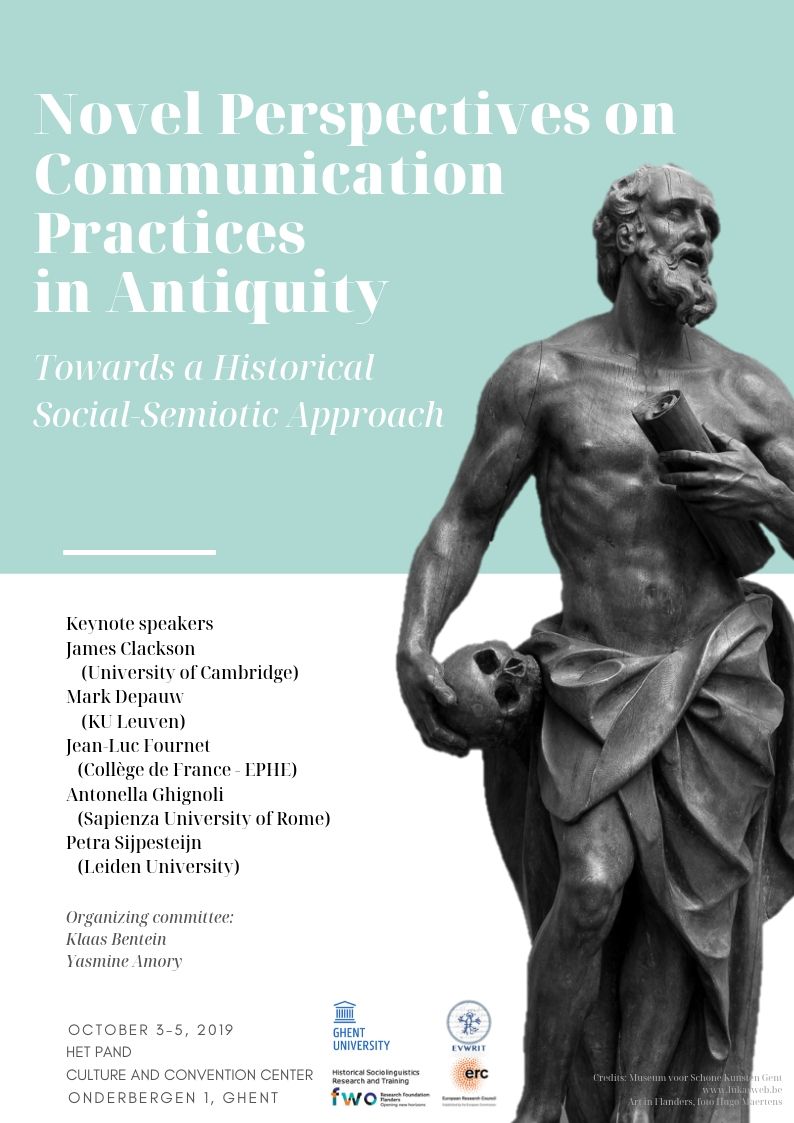
Outline
Sociolinguists initially showed little concern for texts from the past, William Labov, the founding father of sociolinguistics, famously characterizing historical linguistics as ‘the art of making the best use of bad data’ (Labov 1994:11). Nowadays, historical socio-linguistics, too, has come to maturity as a sub¬discipline (see e.g. Conde-Silvestre & Hernandez-Campoy 2012), with researchers trying to identify dialectal relationships between language and society. Contemporary sociolinguistic insights form the basis for these descriptions, but given the complexity of the subject, a radically interdisciplinary approach has been in the making, combining insights from corpus linguistics, historical linguistics, philology, and semiotics.
One question which has received relatively little attention so far is to what extent other ‘meaning-making’ dimensions could and should be involved in the investigation. In recent years, scholars such as Bob Hodge, Gunther Kress and Theo van Leeuwen have explicitly drawn attention to the ‘multi-modal’ nature of communication, arguing that people also use – next to language – visual, gestural, musical, choreographic, and actional resources to make meaning. Remarkably, however, the new discipline of Social Semiotics is currently restricted to the analysis of modern-day texts. Parallel to what we have seen with the development of sociolinguistics, there is little interest in texts from the past: one recent textbook, for example, is explicitly entitled ‘Multimodality. A social semiotic approach to contemporary communication’ (Kress 2010; our emphasis).
The main aim of this conference, which forms the opening event of the ERC-project ‘Everyday writing in Graeco-Roman and Late Antique Egypt. A socio-semiotic study of communicative variation’ (2018-2023; www.evwrit.ugent.be), is to explore to what extent it is possible and desirable to found a discipline such as historical social-semiotics, parallel to historical socio-linguistics. Such a novel, interdisciplinary approach is particularly relevant for ‘everyday’ documentary texts: since these texts represent autographs, their external characteristics can also be brought into the interpretation. Jean-Luc Fournet (2007), for example, has recently argued for a ‘paléographie signifiante’, noting that ‘l’analyse matérielle d’un document peut être porteuse de sens’ (2007:353), not only when it comes to text type, but also with regard to the socio-cultural context of writing, and the provenance of the document. Other external characteristics to be considered as expressions of social meaning (functioning as ‘semiotic resources’) are – but are not limited to – writing material, document format, and language choice. Their analysis reveals information concerning hierarchy, status and social relations.
The main focus of the conference will be documentary texts from the Mediterranean region, roughly spanning the period from the first millennium BCE to the first millennium CE. Next to the study of specific (linguistic, palaeographic, material, etc.) features, we consider the following questions to be of particular relevance:
– Which ‘semiotic resources’ should be taken into account when studying Ancient texts?
– How are these different semiotic resources interrelated?
– Can certain semiotic resources express types of meaning which other resources cannot?
– Which types of social meaning are expressed through communicative variation?
– How are these different types of social meaning related to each other?
– Is it possible to identify larger patterns of co-occurrence, extending linguistic concepts such as ‘register’ and ‘genre’ to other domains?
– Which diachronic changes can be observed?
– How do ‘everyday’ texts from Egypt compare to texts found elsewhere?
– Which digital tools are required for the discipline of historical social-semiotics?
– Which theoretical concepts from social semiotics can be further developed?
– What role do scribes play for the social-semiotic analysis of ancient texts?
– What kind of standards were there for ‘everyday’ communication practices?References
Conde-Silvestre, J.C. & J.M. Hernandez-Campoy 2012. The handbook of historical sociolinguistics. Malden.
Fournet, J.-L. 2007. “Disposition et réalisation graphique des lettres et des pétitions protobyzantines: Pour une paléographie ‘signifiante’ des papyrus
documentaires”. In: J. Frösén (ed.), Proceedings of the 24th international congress of papyrology, 353-367. Helsinki.
Kress, G. 2010. Multimodality: A social semiotic approach to contemporary communication. New York, NY.
Labov, W. 1994-2010. Principles of linguistic change. Vol. 1: Internal factors. Vol. 2: Social factors. Vol. 3: Cognitive and cultural factors. Oxford.
Organizing committee
Klaas Bentein
Yasmine AmoryScientific committee
Antonia Apostolakou – Eleonora Cattafi – Serena Causo – Giovanbattista Galdi – Mark Janse – Geert de Mol – Emmanuel Roumanis – Joanne Stolk -
Din01Okt201920:00Auditorium 3 Suzanne Lilar, Blandijnberg 2, 9000 Gent
Danny Praet - Het Lam Gods: van de catacomben tot Van Eyck
Centrum voor de Studie van Christelijke Tradities, lezing -
Do26Sep201919u00Faculteitsbibliotheek Letteren en Wijsbegeerte
Emeritaatsviering Prof. dr. Marc De Groote
Toon detailsGedurende vele jaren was Prof. dr. Marc De Groote een vaste en graag geziene waarde in de Afdeling Grieks. Op het einde van dit academiejaar gaat hij op emeritaat, en dat laten we niet ongemerkt voorbij gaan. Daarom organiseren we een feestelijk afscheidsmoment, dat plaats zal vinden op donderdag 26 september vanaf 19u, in het atrium van de Faculteitsbibliotheek Letteren en Wijsbegeerte (Rozier 44, 9000 Gent).
Programma van de avond:
- 18u30 ontvangst
- 19u00 feestelijke huldiging
- 20u30 receptie
-
Woe28Aug201915.00 - 17.00Grote Vergaderzaal, Blandijnberg 2
EVWRIT reading group meeting
Toon detailsMonthly meeting of the EVWRIT team to discuss and develop a new theoretical perspective towards communication practices in Antiquity.
Once a month from January 2019, the EVWRIT team will meet to discuss and develop a new theoretical perspective towards communication practices in Antiquity.
Theoretical sessions on fundamental aspects of novel methodologies (cognitive sociolinguistics, social semiotics, paléographie signifiante…) will be interchanged with practical ones (doing statistics, showing a database, presenting a paper…).
The reading group is open to anyone interested.
In this session of the reading group, we will discuss language contact and multilingualism in antiquity, with a further focus on bigraphism. The moderator for this session is Antonia Apostolakou. The recommended literature for this session is the following:
- Langslow, D. R. 2002. Approaching Bilingualism in Corpus Languages. In: Adams, J. N., Janse, M. and Swain, S. (eds.) Bilingualism in Ancient Society: Language Contact and the Written Word. Oxford: Oxford University Press, pp. 23-51.
- Adams, J. N. 2003. Bilingualism and the Latin Language. Cambridge: Cambridge University Press. ("Transliterated texts", pp. 40-67)
- Mullen, A. 2012. Introduction: Multiple Languages, Multiple Identities. In: Mullen, A. and James, P. (eds.) Multilingualism in the Graeco-Roman Worlds. Cambridge: Cambridge University Press, pp. 1-35. (pp. 11-35)
The session will be held in English.
For further questions or remarks, contact Antonia Apostolakou at Antonia.Apostolakou@UGent.be.
For more information about the EVWRIT project, see http://www.evwrit.ugent.be/.
-
Din25Jun201916:00Blandijn, 110.028
Owen Hodkinson (paper): The reception of Philostratus’ Letters in Oxford 'Uranian' circle
Toon detailsProf. Owen Hodkinson (univ. of Leeds) will come to Ghent on Tuesday 25/06 to lead a session of our reading group on Letters of Aelian, Alciphron and Philostratus. In addition, he will give a talk entitled “The reception of Philostratus’ Letters in Oxford 'Uranian' circle”.
ABSTRACT:
The reception of Philostratus’ Letters in Oxford 'Uranian' circle.
In this paper I present some little-known English verse translations of some of Philostratus' Erotic Epistles, which were published in an Oxford student magazine of limited circulation associated with Oscar Wilde and Lord Alfred Douglas, the Spirit Lamp. The magazine's publication of poetry and essays on themes of homosexual and 'Uranian' or pederastic desire provides both context and reason for this otherwise very surprising revival of one of Philostratus' lesser known works at the turn of the 19th-20th centuries, alongside authors with more contemporary currency in these subcultures such as Sappho, Theocritus, and the epigrammatists.
There is no need to register. All welcome !
-
Woe19Jun201915.30 - 17.00Grote Vergaderzaal, Blandijnberg 2
EVWRIT reading group meeting
Toon detailsMonthly meeting of the EVWRIT team to discuss and develop a new theoretical perspective towards communication practices in Antiquity.
Once a month from January 2019, the EVWRIT team will meet to discuss and develop a new theoretical perspective towards communication practices in Antiquity.
Theoretical sessions on fundamental aspects of novel methodologies (cognitive sociolinguistics, social semiotics, paléographie signifiante…) will be interchanged with practical ones (doing statistics, showing a database, presenting a paper…).
The reading group is open to anyone interested.
In this session of the reading group, we will discuss politeness theory and historical politeness. The moderator for this session is Eleonora Cattafi. The recommended literature for this session is the following:
- Brown, Penelope & Stephen C. Levinson. (1987). Politeness. Some universals in language usage, pp. 55-84.
- Kádár, Dániel Z. & Jonathan Culpeper. (2010). 'Historical (Im)politeness: an introduction', in Culpeper & Kádár (eds.). Historical (Im)politeness, pp. 9-36.
- Dickey, Eleanor. (2016). 'Politeness in ancient Rome: can it help us evaluate modern politeness theories?', Journal of politeness research, 12 (2), pp. 197-220.
For a better understanding, the moderator suggests to read these works in this order, since the second and third article make references to the concepts explained in the first contribution.
The session will be held in English.
For further questions or remarks, contact Eleonora Cattafi at eleonora.cattafi@ugent.be.
For more information about the EVWRIT project, see http://www.evwrit.ugent.be/.
-
Do13Jun201912:00Blandijn, Faculteitszaal
Ancient Rhetoric & Aesthetics
workshopToon detailsOIKOS onderzoeksgroep Ancient Rhetoric & Aesthetics
Work-in-progress workshop: Speeches
Faculteitsraadzaal (1ste verdieping), Blandijnberg 2, Universiteit Gent
Programma
12.00-13.00 Lunch
13.00-13.10 Welcome and Introduction
13.10-13.50 Mathieu de Bakker (UvA), Forms and Functions of Speeches in Ancient Greek Literature: The Forthcoming Fifth Installment of Studies in Ancient Greek Narrative (SAGN)
13.50-14.30 Lidewij van Gils (VU), The Multiple Audiences of Cicero's Forensic Speeches
14.30-15.00 Pauze
15.00-15.40 Eelco Glas (RUG), Speech and Character in Josephus' Judaean War
15.40-16.20 Alexander Egorov (UU), The Rhetorical Functions of the Priamel in Empedocles’ Teaching Speech
16.20-16.35 Pauze
16.35-17.15 Berenice Verhelst (UGent), Adding Insult to Injury. Triumph Speeches on the Epic Battlefield from Homer to Nonnus
17.30 Borrel en diner
-
Din11Jun201911:00Blandijn, lokaal 110.031
Gastlezing door Margaret Mullet: ‘Performability, Lament and the Christos Paschon’
Toon detailsAbstract:
The Byzantine dialogic poem Christos Paschon has long been controversial, even and most notably in its date and authorship. It was at the heart of the twentieth-century debate over Byzantine drama, and its genre has been disputed. Is it a tragedy? A cento? A Virgin’s lament? We have now arrived at a position where Walter Puchner has argued that it is not a tragedy and is indeed unperformable. I should like to attempt to walk back this position by looking at the place in the text of lament, which occupies about one third of the whole, and in so doing cast some light on lament more widely in Byzantine society and the issue of performability of this text.
-
Din11Jun201916:00Gent, Pand
Openbare verdediging: Julie Van Pelt "Saints in Disguise"
-
Woe22Mei201914:00Didacticum, Rozier, Gent
Grieks voor iedereen - hoe begin ik eraan?
nascholingToon detailsIn navolging van het nieuwe project, Oude Grieken – Jonge Helden, dat Oudgrieks naar kansarme jongeren uit het lager onderwijs brengt, kregen we vragen van leerkrachten die deze lessen zelf in hun school zouden willen organiseren.
Daarom organiseert het Team Vakdidactiek Latijn & Grieks, in samenwerking met de Afdeling Grieks, een nascholing voor leerkrachten die Grieks graag aanbieden buiten het traditionele kader, bvb. in het lager onderwijs, via talent-uren taal in de eerste graad, of aan leerlingen met taalachterstand. De didactiek focust expliciet op de versterking van de Nederlandse taal via een speelse kennismaking met het Oudgrieks. Lesmaterialen zijn gratis online verkrijgbaar.
Programma:
14-15u: Oudgrieks voor beginners – een uurtje bijscholing voor leerkrachten die graag de initiatie Grieks zouden geven maar nog geen of nauwelijks kennis van de taal hebben
15-17u: een praktische introductie tot de didactiek van het project, met aandacht aan de manieren waarop de lesmaterialen aan de verschillende doelgroepen kunnen aangepast worden
Kost: Deze nascholing is gratis.
Inschrijven via email naar evelien.bracke@ugent.be.
-
Woe15Mei201920:00Blandijn, Auditorium 4 Jaap Kruithof
Maria Tomadaki – Teaching Greek in a Period of Financial Crisis: Ancient, Byzantine and Modern Greek in the Educational System of Contemporary Greece
Griekenlandcentrum, lezingToon detailsAfter some opening remarks on the financial crisis in Greece and the problems it caused to education, my talk will introduce the educational system in Greece and the main courses of Greek that are included in the school curriculum. Subsequently, it will focus on recent changes in the school system of Greece, differentiations to teaching purposes and their impact to the learning of ancient Greek. It will also discuss current debates in Greece about the value of ancient Greek and its relation to Modern Greek. At the end, I intend to present the opinions of some significant intellectuals who affected the directions of teaching and learning Greek in contemporary Greece. Duo-presentatie, samen met Efstathios Kessareas (The “Ancient Greek” Controversy: Ideological Aspects)
-
Woe15Mei201920:00Blandijn, Auditorium 4 Jaap Kruithof
Efstathios Kessareas - The “Ancient Greek” Controversy: Ideological Aspects
GriekenlandcentrumToon detailsDuopresentatie, samen met Maria Tomadaki (Teaching Greek in a Period of Financial Crisis: Ancient, Byzantine and Modern Greek in the Educational System of Contemporary Greece)
-
Ma13Mei2019Vrij17Mei2019
Specialist course: Modern Linguistic Approaches to Languages from the Past
Toon detailsThis course aims to introduce students of ancient languages (and earlier stages of modern languages) to a number of modern linguistic frameworks.
It can be followed as part of the doctoral schools program, but anyone interested is welcome.
More information:
https://www.ugent.be/doctoralschools/en/doctoraltraining/courses/specialistcourses/ahl/modern-linguistic-approaches-to-languages-from-past-2018-2019.htmRegistration:
https://webappsx.ugent.be/eventManager/events/modernlinguisticapproaches -
Vrij10Mei201915.30 - 17.30Grote Vergaderzaal, Blandijnberg 2
EVWRIT reading group meeting
Toon detailsMonthly meeting of the EVWRIT team to discuss and develop a new theoretical perspective towards communication practices in Antiquity.
Once a month from January 2019, the EVWRIT team will meet to discuss and develop a new theoretical perspective towards communication practices in Antiquity.
Theoretical sessions on fundamental aspects of novel methodologies (cognitive sociolinguistics, social semiotics, paléographie signifiante…) will be interchanged with practical ones (doing statistics, showing a database, presenting a paper…).
The reading group is open to anyone interested.
In this session of the reading group, we will discuss the possible social factors and meanings of spelling and spelling variations. The recommended literature for this session is the following:
- Sebba, Mark. 2015. Iconisation, attribution and branding in orthography. “Written Language & Literacy” 18 (2): 208-227.
- Sebba, Mark. 2012. Orthography as social action. Scripts, spelling, identity and power. In: Jaffe et al., “Orthography as social action. Scripts, spelling, identity and power”, 1-20.
- Sebba, Mark. 2012. Orthography as literacy. How Manx was “reduced to writing”. In: Jaffe et al., “Orthography as social action. Scripts, spelling, identity and power”, 161-176.
The session will be held in English.
For further questions or remarks, contact Geert De Mol at geert.demol@ugent.be.
For more information about the EVWRIT project, see http://www.evwrit.ugent.be/.
-
Vrij03Mei201911:30Blandijn, lokaal 110.079 (eerste verdieping)
Panelgesprek: Klassieke literatuur in bewerking voor kinderen en jongeren
Toon detailsPanelleden:
Tom Bruynooghe (dramaturg/leraar)
Marcel Roijaards (auteur/dramaturg/scenarist)
Stefan Van den Broeck (auteur/leraar/vertaler)
Peter van Olmen (auteur/docent)Moderator:
Sylvie Geerts (Hoe Skylla in een graafmachine veranderde: de receptie van de klassieke
mythologie in de Nederlandstalige jeugdliteratuur van 1970 tot vandaag, 2014)In het kader van het vak ‘Vertaaltheorie en –praktijk: de klassieken’ bespreken vier auteurs, vertalers en dramaturgen hun vertalingen/bewerkingen van antieke teksten voor een jeugdig publiek. Bijzondere aandacht gaat daarbij uit naar het klassieke verhaal over de val van Icarus uit Ovidius’ Metamorphoses.
Dit panelgesprek wordt mede mogelijk gemaakt door het ‘Centrum voor Literatuur in vertaling’ en is vrij toegankelijk voor alle geïnteresseerden. Gelieve uw aanwezigheid op voorhand te melden aan de organisatoren via stijn.praet@ugent.be of berenice.verhelst@ugent.be
-
Ma01Apr20199u tot 11uRozier leslokaal 2.2
Gastles dr. Yasmine Amory
Toon detailsGastles (in het Engels) in het kader van het vak Hulpwetenschappen van de Griekse filologie.
-
Woe27Mar201920:00Blandijn, Auditorium 4 Jaap Kruithof
Raymond Detrez – Grieks onderwijs op de Balkan in de negentiende eeuw: ‘school bij maanlicht’ of instrument van de Verlichting?
Griekenlandcentrum, lezingToon detailsHet lijdt geen twijfel dat de Turcocratie weinig stimulerend was voor het Griekse intellectuele leven, maar de idee dat onderwijs werd verstrekt in ‘verborgen scholen’ (kryfa scholia), waar kinderen, zoals een populair Grieks volksliedje wil, bij het licht van ‘een stralend maantje’ heen gingen, slaat nergens op. In werkelijkheid bestonden er de hele tijd ontelbare dorpsscholen, waar jongens (alleen jongens) in de kerk of het klooster een elementaire opleiding kregen. Van in de achttiende eeuw boden enkele tientallen scholen (onder diverse namen - gymnasia, frontistiria, academies, lycea, musea) voortgezet onderwijs. Ook de Patriarchale Hogeschool in Constantinopel heeft nooit opgehouden te functioneren. De Academiën in Boekarest en Iaşi , die de bescherming genoten van de Fanariotische vorsten van Walachije en Moldavië, beiden vazallen van de sultan, boden Griekstalig onderwijs op een haast universitair niveau.Aan deze scholen kregen niet alleen Grieken een opleiding, maar ook Albanese, Slavische en Roemeense jongeren, afkomstig uit de vergriekste stedelijke sociale bovenlaag op de Balkan. De leraren aan de scholen voor voortgezet onderwijs, die vaak aan universiteiten in het Westen hadden gestudeerd, gaven de ideeën van de Verlichting aan hun leerlingen door. Daarbij ondervonden ze meer tegenkanting van de conservatieve orthodoxe geestelijkheid dan van de Osmaanse overheid, die in het kader van de grote staatshervorming, de Tanzimat, de modernisering van het onderwijs veeleer aanmoedigde. -
Din26Mar201919:30Auditorium 4, Blandijnberg 2, Gent
Benjamin De Vos - Paulus, voorbij wet en zonde?
lezingToon detailsIn het kader van de Permanente vorming Actuele filosofie: Zonder wet, geen zonde?
Meer informatie: http://www.philosophy.ugent.be/actuele_filosofie
-
Vrij22Mar201910:00Blandijn, Auditorium 5
Oorlog om Troje: terreur van alle tijden
Toon details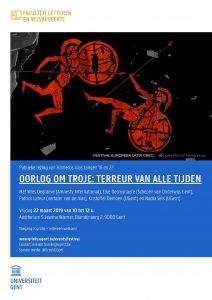
Op 22 maart, tussen 10 en 12u, kan je de bijdrage van de Afdeling Grieks aan de UGent aan het Festival Européen latin grec volgen op de livestream (klik om naar de pagina te gaan).
Concept
Elk jaar focust het Festival Européen Latin Grec zich in heel Europa op het lezen van (een deel van) een Oudgriekse of Latijnse tekst in vertaling. Op 22 maart 2019 is dit de Ilias van de Oudgriekse dichter Homeros.
Met het thema ‘Oorlog om Troje: Terreur van alle Tijden’ wil de afdeling Grieks de actuele relevantie van de Ilias onder de aandacht brengen. Dit gebeurt o.a. door de visuele omkadering (scholenwedstrijd). Leerlingen (winnaars scholierenwedstrijd) en getuigen van oorlogsgeweld betreden het podium om een stukje van de Ilias, in de bekroonde vertaling van Patrick Lateur, voor te lezen. Hiermee willen we de schrijnende impact van oorlog op het leven van gewone mensen van de oudheid tot nu aankaarten - en daarbij tegelijkertijd ook het belang van de humane wetenschappen bij het aanpakken van deze problematiek onderstrepen.
Programma
10u: verwelkoming door Gita Deneckere (Decaan Letteren en Wijsbegeerte, Ugent)
10.05-10.15: voorwoord door Wies De Graeve (Directeur, Amnesty International Vlaanderen)
10.15-10.25: inleidende beschouwing over zang 16 door Professor Kristoffel Demoen (UGent)
10.25-11.00: bloemlezing van Ilias zang 16
11.00-11.10: inleidende beschouwing over zang 22 door Professor Nadia Sels (UGent)
11.10-11.45: bloemlezing van Ilias zang 22
11.45.-11.55: nawoord door Elke Decruynaere (Schepen van Onderwijs, Gent)
11.55-12.00: dankwoord
De bloemlezingen worden gebracht door leerlingen, leerkrachten, studenten en lesgevers van de UGent, oorlogsgetuigen en gastlezer Patrick Lateur.Je kan ook het programma van het centrale Festival Européen latin grec raadplegen als je wil zien welke andere lezingen plaatsnemen.
Wanneer: vrijdag 22 maart 2019 van 10 tot 12u
Waar: Auditorium 5, Blandijnberg 2, 9000 Gent
Toegang is gratis—iedereen welkom!
Groepen vragen we ons op voorhand te contacteren.
Contact: evelien.bracke@ugent.be -
Woe20Mar201911:00Grote Vergaderzaal, Blandijnberg 2, 9000
Antonella Ghignoli - The NOTAE Project: Reasons for a Research
lezing -
Zat16Mar2019Blandijnberg 2, Gent
Infodag Taal- en Letterkunde
Toon detailsLeerlingen van het laatste jaar middelbaar: geïnteresseerd om Grieks te studeren aan de UGent? Ontmoet je proffen en toekomstige medestudenten, en vergaar alle informatie over je toekomstige studie op de infodag Taal- en Letterkunde.
16 maart 2019, vanaf 10u: Blandijnberg 2, Gent
-
Din12Mar201914:00Blandijn, lokaal 110.022
Ilias Taxidis - Public and Private Libraries in the Palaeologan Period
lezingToon detailsIlias Taxidis is assistant professor at the Aristotle University of Thessaloniki.
All welcome! No registration needed.
More information: maria.tomadaki@ugent.be
A short abstract of the presentation:
During the early Palaeologan period great effort has been made in the Byzantine empire for the reestablishment and enrichment of the libraries that suffered losses and damage during the previous period of the so-called Latin occupation. At the same time new libraries have been founded in the remaining Byzantine territories by aristocratic and ecclesiastical authorities. This presentation examines a variety of sources (e.g. lists of manuscripts, historical accounts, testaments and epistles), which provide information about the availability and content of manuscripts in all public, monastic and private libraries that were active during the late Byzantine period (1261-1453). Previous research results have been collected, analyzed and reassessed, while at the same time new text editions and recent studies have been explored. This results in a better and broader view of the Byzantine libraries and the nature of their books during the Palaeologan era.
-
Din12Mar201919:00Blandijn, Auditorium 3 Suzanne Lilar
Great Characters. Wim Verbaal over Lucifer
Great Characters, lezingToon detailsDeel van de Great Characters-reeks in het kader van de permanente vorming Historische Europese Letterkunde.
-
Din05Mar201919:00Blandijn, Auditorium 3 Suzanne Lilar
Great Characters. Caroline Janssens over de Koningin van Sheba
Great Characters, lezingToon detailsDeel van de Great Characters-reeks in het kader van de permanente vorming Historische Europese Letterkunde.
-
Vrij01Mar201914:00Blandijn lokaal 090.036 (kelder)
Try-out U4 Winter School
Toon detailsProgramma:
- Cristina Cocola: The heritage of the Psalms in Byzantine penitential poetry
- Geert De Mol: The hypercorrect use of iota adscript in Greek documentary sources: a historical-sociolinguistic approach
- Benjamin De Vos: The Pseudo-Clementine Novel – Challenge and Response through the Art of Dissimulation and Deception in a Clash Between Judeo-Christianity and Paganism for the ‘True’ Knowledge.
- Tineke Melkebeek: Philosophers on Women: The influence of Plato and Aristotle on Medieval Islamic philosopher Averroes (Ibn Rushd)
Meer informatie: bmardvos.DeVos@UGent.be
Meer informatie in verband met het U4 netwerk: http://www.u4network.eu/index.php/cluster/humanities/177-antiquity
-
Woe27Feb201920:00Blandijn, Auditorium 4 Jaap Kruithof
Koen De Temmerman – Weapon of mass seduction. Retorica in de antieke klas
Griekenlandcentrum, lezingToon detailsVan Barack Obama's "Yes, we can!" tot de oneliners van Bart De Wever; van Donald Trumps "big, beautiful wall" tot de vaak bedenkelijke manieren waarop de voorbije jaren het Brexit-debat in het VK is gevoerd: speech is "hot", en de kunst van het overtuigen geniet de laatste tijd hernieuwde aandacht in binnen- en buitenland. Maar het inzicht dat klassieke retorica ook een intrinsiek deel uitmaakt (of zou moeten uitmaken) van taal- en literatuuronderwijs is niet wijdverbreid, zelfs niet in de huidige onderwijspraktijk. Nochtans heeft het een lange traditie die teruggaat tot de oudheid, toen retorica de kern vormde van de antieke schoolopleiding, waar ze, zoals zal blijken in deze lezing, inderdaad veel meer omvatte dan enkel speech en overtuiging.
-
Din26Feb201919:00Blandijn, Auditorium 3 Suzanne Lilar
Great Characters. Berenice Verhelst over Helena van Troje
Great Characters, lezingToon detailsDeel van de Great Characters-reeks in het kader van de permanente vorming Historische Europese Letterkunde.
-
Do21Feb201915:00 - 17:00Grote Vergaderzaal, Blandijnberg 2
Reading Group - EVWRIT
Toon detailsMonthly meeting of the EVWRIT team to discuss and develop a new theoretical perspective towards communication practices in Antiquity.
Once a month from January 2019, the EVWRIT team will meet to discuss and develop a new theoretical perspective towards communication practices in Antiquity.
Theoretical sessions on fundamental aspects of novel methodologies (cognitive sociolinguistics, social semiotics, paléographie signifiante…) will be interchanged with practical ones (doing statistics, showing a database, presenting a paper…).
The reading group is open to anyone interested.
In this reading group session, we will discuss the contents of two scientific articles connected to (social) semiotics:
- Van Leeuwen, T. 2006. 'Towards a Semiotics of Typography.' In: Information Design Journal + Document Design 14 (2), pp. 139-155;
- Fournet, J.-L. 2007. 'Disposition et réalisation graphique des lettres et des pétitions protobyzantines. Pour une paléographie “signifiante” des papyrus documentaires.' In: Proceedings of the 24th International Congress of Papyrology, Aug 2004, Helsinki, Finland. I, Societas Scientiarum Fennica, Commentationes Humanarum Litterarum 122, pp. 353-367. -
Din19Feb201919:00Blandijn, Auditorium 3 Suzanne Lilar
Great Characters. Jürgen Pieters over Orpheus
Great Characters, lezingToon detailsDeel van de Great Characters-reeks in het kader van de permanente vorming Historische Europese Letterkunde.
-
Ma18Feb2019Ma25Mar2019
Webklas Grieks voor leerlingen secundair
Toon detailsLeerlingen van het laatste jaar secundair: ontdek via een online lessenreeks of Grieks aan de UGent echt iets voor jou is. Schrijf je dus in voor de webklas!
https://www.ugent.be/lw/nl/toekomstige-student/webklassen/tweetalen.htm
-
Woe13Feb201910:00Gent, Campus Boekentoren, Rozier 44, leslokaal 2.4
Crash course in Greek paleography
workshopToon detailsThe Greek department of Ghent University offers a one-day course in Greek paleography in collaboration with the Research School OIKOS.
The course is intended for MA students, ResMA students and PhDs working in the areas of Ancient History, Classics and Ancient Civilizations with a good command of Greek. It offers an intensive introduction into Greek paleography from the Hellenistic period until the end of the Middle Ages and is specifically aimed at acquiring practical skills for research involving literary and documentary papyri and literary manuscripts.
Organised by Dr Joanne Stolk (joanne.stolk@ugent.be).
-
Woe06Feb201920:00Dienstencentrum Ledeberg (Ledebergplein 30, 9050 Ledeberg)
Rolf Strootman – De Slangenzuil in de Hippodroom van Constantinopel
Griekenlandcentrum, lezing, NKV Oost-VlaanderenToon detailsIn het hart van Istanbul, precies in het midden van het voormalige hippodroom, staat het droevige restant van een opmerkelijk, 2500 jaar oud monument: de Slangenzuil. Dit Klassieke monument kent een opmerkelijke continuïteit als sacraal object en vond een plaats in Christelijk, Joods en Islamitisch volksgeloof. Het oorspronkelijke monument, een gouden drievoet gedragen door een driekoppige bronzen slang, was een wij-geschenk van de Grieken aan Apollo na hun overwinning op de Perzen bij Plataia (de namen van 31 poleis die bij Plataiai streden zijn nog altijd onderaan de zuil zichtbaar). Constantijn de Grote bracht het monument (de drievoet was toen al verdwenen) naar Constantinopel om zijn nieuwe hoofdstad te markeren als centrum van de wereld. Velerlei sacrale en magische betekenissen zijn in de loop der eeuwen aan de zuil toegekend door Christenen, Moslims en Joden. In het bijzonder gold de Slagenzuil als talisman die de stad beschermde tegen giftige slangen. Ook deden allerlei volksverhalen de ronde over de zuil, met name in de Osmaanse periode. Rond 1700 vielen de drie koppen eraf; slechts een ervan is tot dusverre teruggevonden.
-
Vrij01Feb2019
-
Woe23Jan201908:45Gent, Campus Boekentoren, Blandijnberg 2
Res, non verba. Actiever omgaan met Latijnse en Griekse woordenschat
nascholingToon detailsZonder woordenschat is er geen taal, laat staan een goed verhaal: dit lijkt de evidentie zelve. Ondanks het immense belang van woordenschat voor tekstbegrip, is in het verleden aan woordenschatverwerving, woordkennis en woordenboekgebruik niet veel aandacht besteed in het onderzoek en de didactiek van de klassieke talen. Hierin is het laatste decennium verandering gekomen. Niets te vroeg wellicht, want de traditionele impliciete en eenzijdige aanpak lijkt niet meer te renderen.
Met deze nascholing willen we leraren Latijn en Grieks informeren over het recente onderzoek naar woordenschatverwerving en voorbeelden bieden van een alternatieve omgang met vocabularium. De verschillende fases binnen het curriculum klassieke talen komen aan bod: van de eerste kennismaking met nieuwe woorden tot de herhalingstoets, van de woordkaartjes in het eerste jaar tot het gebruik van het woordenboek in de bovenbouw.
Na een kort plenumreferaat worden vier workshops aangeboden waarvan de deelnemers er twee bijwonen.
Georganiseerd door Professor Katja De Herdt.
-
Woe12Dec.201820:00Auditorium 4 Jaap Kruithof
Rachele Ricceri – Kopiëren, lezen en leren: filologie en boekproductie in Byzantium
Griekenlandcentrum, lezingToon detailsOnze kennis van de Griekse klassieke en Middeleeuwse literaire cultuur is onverbrekelijk verbonden met de manuscripten die in het hele Byzantijnse millennium geproduceerd werden. De teksten die jonge Byzantijnen tegenkwamen in hun schoolcurricula hebben gemakkelijker overleefd tot onze dagen. Anderzijds werden veel literaire werken die in Byzantium minder populair waren niet meer gekopieerd en zijn daarom onherroepelijk verloren.
Deze lezing onderzoekt hoe de boeken die Byzantijnen op school gebruikten eruit zagen. Werden er specifieke teksten geschreven voor leerlingen? En wat zijn de belangrijkste kenmerken van Byzantijnse schoolboeken? Door middel van een aantal afbeeldingen zullen we ingaan op de fascinerende wereld van de Byzantijnse boekproductie om inzicht te krijgen in hoe en wat Middeleeuwse Grieken lazen.
-
Woe07Nov.201820:00Auditorium 4 Jaap Kruithof
Joanne Stolk – Van analfabeten tot langzame schrijvers: Grieks schrijfonderwijs in Romeins-Byzantijns Egypte
Griekenlandcentrum, lezingToon detailsGrieks was de belangrijkste schrijftaal in Egypte gedurende de Romeinse en vroeg-Byzantijnse tijd. Zowel Grieken als Egyptenaren leerden Grieks schrijven om bijvoorbeeld documenten te kunnen ondertekenen en brieven te versturen. Aan de hand van hun schrijfoefeningen en eerste papyrusdocumenten komen we meer te weten over de leerlingen, de leraren en de lesmethodes uit die tijd. Onderwijs was echter niet voor iedereen weggelegd. Wat weten we eigenlijk over de groep mensen die niet kon schrijven of slechts met veel moeite? En hoe was het voor Egyptenaren om te schrijven in hun tweede taal? Deze lezing tracht met behulp van documentaire teksten een beeld te schetsen van het schrijfonderwijs en verschillende niveaus van geletterdheid tijdens deze periode.
-
Woe17Okt201820:00Auditorium 2 Franz Cumont
Marc George – De kracht van het Grieks denken. Nuttig voor het huidig onderwijs?
Griekenlandcentrum, lezingToon details
Ik vertrek voor deze lezing vanuit eigen indrukken en ervaringen. Hoe heeft de studie van het Grieks mij geïnspireerd en vooral: hoe heb ik geprobeerd om die inspiratie door te geven aan mijn leerlingen? Het Grieks is voor mij nooit alleen maar een leervak geweest. Het was ook een sfeervak. Het evenwicht vinden tussen beide polen was vaak een oefening. Het was ook rekening houden met de veranderde mentaliteit van de leerling, en zeker met de positie van het leervak Grieks in het huidig onderwijs. Die brede invalshoek is de insteek van de lezing. Ik illustreer het graag met beeld en muziek. -
Woe02Mei2018Sint Baafshuis, Gent
Dag van het Grieks 2018
Toon detailsGriekse dag voor leerlingen en leerkrachten, met tientallen workshops en een groot slotevenement.
8.45 – 9.30 uur onthaal 10.00 – 11.10 uur eerste reeks werkwinkels / quiz ‘De slimste Griek van Vlaanderen’ 11.35 – 12.45 uur tweede reeks werkwinkels / quiz ‘De slimste Griek van Vlaanderen’ 13.00 – 13.45 uur broodjesmaaltijd 14.00 – 15.10 uur derde reeks werkwinkels / quiz ‘De slimste Griek van Vlaanderen’ 15.30 – 16.15 uur gezamenlijk slotmoment; finale en prijsuitreiking van de quiz.
Slotpleidooi door advocaat Jef Vermassen. -
Do19Apr2018Zat21Apr2018KANTL (Koningstraat 18, 9000 Gent
Nonnus of Panopolis in Context IV: Poetry at the crossroads
congresToon details>> Organization
Initiative and organization: Berenice Verhelst (Ghent)
Other members of the organizing and scientific committees: Kristoffel Demoen (Ghent), Koen De Temmerman (Ghent), Fotini Hadjittofi (Lisbon), David Hernández de la Fuente (Madrid), Johan Leemans (Leuven), Anna Lefteratou (Heidelberg), Rachele Ricceri (Ghent) Tine Scheijnen (Ghent), Peter Van Deun (Leuven).
Programme
Thursday the 19th of April
9:00-9:30: registration and coffee
9:30: welcome and introduction (Berenice Verhelst)
9:50: hommage à Pierre Chuvin (†26/12/2016) (Gianfranco Agosti)
(full text)10:00-11:00: keynote 1 (chair: Koen De Temmerman)
Tim Whitmarsh (Cambridge): Big Data and the Dionysiaca
11:00-11:30: coffee break
11:30-13:00: panel 1: the road to the East (chair: Katherine La France)
Richard Stoneman (Exeter): Nymphs and Elephants: Nonnus’ Depiction of India in the Dionysiaca
Fotini Hadjittofi (Lisbon): Nonnus’ Indians between Conversion and Acculturation
Luise Marion Frenkel (São Paolo): Spicing Nonnus up: commercial and religious crossroads and Nonnus’ representation of the East
13:00-14:00: lunch
14:00-15:30: panel 2: Late Antique intersections (part 1) (chair: Fotini Hadjittofi)
David Lorin (Paris): “Wandering Jews”: Tracking down the Alexandrian Jewish community in Nonnus of Panopolis’ and Cyril of Alexandria’s works
Anna Lefteratou (Heidelberg): Nuptial imagery in hexameters: The Cana Wedding in Eudocia’s Homeric Centos and in the Paraphrasis of Nonnos of Panopolis
Emanuele Castelli (Institut des Sources Chrétiennes, Lyon): Nonnus et la publication des Dionysiaques. Nouvelle essai de compréhension d’une question ouverte
15:30-16:00: coffee break
16:00-17:00: panel 3: between the Archaic past and Nonnus’ Late Antique present (chair: Berenice Verhelst)
Michael Paschalis (Rethymno): The Lure of Paganism: Nonnus’ Paraphrase of the Gospel of John and Hesiod’s Theogony
Nicole Kröll (Vienna): Shape-shifting Athena? On the Transformation of Homeric characters in Nonnus' Dionysiaca
17:00-17:30: coffee break
17:30-18:30: keynote 2 (chair: Paolo Felice Sacchi)
Gennaro D’Ippolito (Palermo): Nonnus’ poetic activity as an expression of a unitary ideological and artistic programme
18:30-19:30: drinks reception
Friday the 20th of April
9:00-11:00: panel 4: between the Hellenistic past and Nonnus’ Late Antique present (chair: Anna Lefteratou)
Arianna Magnolo (Genova): Nonnus' Reinterpretation of Aratus' Astronomy in the Dionysiaca
Katerina Carvounis and Sophia Papaioannou (Athens): Phaethon in Nonnus and Ovid: exploring images and motifs in the Dionysiaca
Enrico Magnelli (Florence): Ancient Quantity and Modern Stress: an Interesting Feature of Nonnus’ Hexameter
Alexandra Madela (Dublin): Midway between Quintus of Smyrna and Nonnus: The Formulaic Diction of the Orphic Argonautica
11:00-11:30: coffee break
11:30-12:30 keynote 3 (chair : Olivier Demerre)
Hélène Frangoulis (Toulouse): Nonnos et Callimaque : une scène de bain dans les Dionysiaques
12:30-13:30: lunch
13:30-15:00: panel 5: late antique intersections (part 2) (chair: Rachele Ricceri)
Emma Greensmith (Colgate - via video conference): The Miracle Baby: Zagreus and the Poetics of Mutation
David Hernandez de la Fuente (Madrid): A Dionysian φαντασία? Possible echoes of Neoplatonic perception and imagination theories in Nonnus
Simon Zuenelli (Innsbruck): The Book Epigram of Nonnusʼ Dionysiaca (AP 9.198). An Inscription for an Author Portrait?
15:00-15:30: coffee break
15:30-17:00: panel 6: Roads beyond Nonnus (chair: Peter Van Deun)
Federica Giommoni (Florence): Reading the Paraphrase in 6th Century Constantinople: Nonnus’ Christian Poem and Agathias’ Cycle
Arianna Gullo (Durham): Nonnian poets: the case of Julian the Egyptian
Delphine Lauritzen (Venise): L’esthétique des Saisons dans les Dionysiaques et chez Jean de Gaza : poésie et iconographie
17:00-17:30: coffee break
17:30-18:30: keynote 4 (chair: Kristoffel Demoen)
Gianfranco Agosti (Rome): Nonnus the prose writer
20:00: Conference dinner
Saturday the 21st of April
9:30-10:30: keynote 5 (chair: Berenice Verhelst)
Domenico Accorinti (Pisa): Paul Friedländer and Nonnus’ poetry
10:30-11:00: coffee break
11:00-12:30 panel 7: metaphors at the crossroads of traditions (chair: Tine Scheijnen)
Emilie van Opstall (Amsterdam): Form and function of metaphors in Nonnus’ Paraphrase of the Gospel of John
Christophe Cusset (ENS de Lyon - in absentia) and Halima Benchikh-Lehocine (ENS de Lyon) : “Je suis la vie, la vérité et le droit chemin” (Par. 14.20 ): Routes et chemins dans la Paraphrase de Saint Jean de Nonnos de Panopolis
Maria Ypsilanti (Nicosia - in absentia)) and Laura Franco: The Sound of Silence. Metaphors of silent eloquence in Nonnus' poetry
12:30-14:30-15:00: lunch, poster session and refreshments
Group A: poster presentations (8 minutes) at 13:00, 13:30 and 14:00
Nestan Egetashvili (Tbilisi): Cosmogony in Dionysiaca as a Mytho-Poetic Model of Renovation
Emma Vanden Berghe (Ghent): From the Apollonian to the Orphic Argonautica: a transformation through school techniques
Cristiano Minuto (Naples): Nonnus of Panopolis between poetry and rhetoric: the encomium of Berytus (Dion. XLI 14-154)
Group B: poster presentations (8 minutes) at 13:15, 13:45 and 14:15
Guy Walker (Dublin): Typhon: An Anti-Exemplum of Nonnian Poikilia
Elena Langella (Milan): Quintus’ Readers? Traces of Book 7 of the Posthomerica in Later Poets
Paulo Henrique Oliveira de Lima (São Paulo): The Influence of Bucolic Poetry in Nonnus’ Dionysiaca
14:30 15:00-16:00: panel 8: Bacchic language and the crossing of boundaries (chair: Julián Bértola)
Flor Herrero Valdes (London): Nonnus and the Greco-Egyptian Magic – crossroads, poetic confluences and fringe states
Filip Doroszewski (Cardinal Stefan Wyszynski University in Warsaw): Jesus the Rival: Paraphrasis 11.185‒213 read against Euripides’ Bacchae
16:00-16:30: coffee break
16:30-17:30: panel 9: Nonnus’ roads towards today (chair: David Hernandez de la Fuente)
Thomas Gärtner (Köln): “Allgemeiner Nutzen für die Knaben, damit sie den Charakter des Nonnos nachahmen” – Zur Bedeutung des Nonnos für den Philhellenismus im 16./ 17. Jahrhundert
Marta Otlewska Jung (Freie Universität Berlin): Václav Pinkava, a late Nonnian?
17:30-18:00: closing discussion
18:30-20:30: guided city walk
-
Vrij24Mar201710:30Auditorium Leon De Meyer UFO
De Odyssee op odyssee door Europa - Festival Européen Latin Grec 2017
Toon detailsOp 24 maart vindt het elfde Europees Festival Latijn en Grieks plaats. Dit jaar draait het festival rond de Odyssee van Homeros. Daarom zal op 112 plaatsen in Europa en zelfs daarbuiten de Odyssee voorgedragen worden op hetzelfde moment. De Universiteit Gent doet uiteraard mee!
Theater en academia slaan de handen in elkaar.
De afdeling Grieks van de Universiteit Gent presenteert, in samenwerking met KVS en NTGent, twee monologen – zang 6 en zang 23 – uit de spraakmakende theatermarathon: “Odysseus. Een zwerver komt thuis.” (in regie van Michael De Cock). Vooraf is er een inleiding over de productie en tekst door professoren Koen De Temmerman en Kristoffel Demoen. Iedere aanwezige krijgt ook een gratis Odysseusgazet.
Topacteurs
Twee topacteurs van het collectief rond de Odysseetheatermarathon, Rashif El Kaoui (KVS) en Bert Luppes (NTGent) zullen op magistrale wijze de recente en veelgeprezen vertaling van Patrick Lateur tot leven brengen.
Liefde in tijden van omzwervingen
Wij nemen de liefde als leidraad doorheen Odysseus’ avonturen en plaatsen twee belangrijke vrouwen centraal: Nausikaä, de mooie prinses van de Faiaken (zang 6) en Penelope, Odysseus’ trouwe echtgenote (zang 23).
“Het mooiste aan mijn zang vind ik dat hij over de liefde gaat, een verademing tussen al het drama en tumult dat onze held meemaakt. Nausikaä, prinses op het eiland waar Odysseus als schipbreukeling aanspoelt, wordt verliefd op hem. De tekst heeft iets diepmenselijks, bijvoorbeeld als zij hem beloert, terwijl hij baadt. Het maakt mijn zang veel sensueler dan de andere…” (Rashif El Kaoui over “zijn” zang 6 in De Standaard van 28 januari)
Dankzij de Faiaken bereikt Odysseus eindelijk zijn vaderland Ithaka, om in zang 23 – na 20 jaar afwezigheid – herenigd te worden met Penelope.
“De liefde is, ook voor mij, een belangrijk thema, dus is het mooi dat mijn zang een romantisch punt vormt in het verhaal. Odysseus en Penelope ontmoeten elkaar weer en tasten af. Ik hoop dat het publiek, los van de anekdote, de muzikaliteit en schoonheid van de taal meekrijgt.” (Bert Luppes over de schoonheid van “zijn” zang 23)
De thema’s liefde, gastvrijheid en thuiskomst, belangrijke leidmotieven in de Odyssee, worden in deze twee zangen prachtig verweven tot een tijdloos (actueel?!), herkenbaar en diepmenselijk verhaal.
Praktisch
Wanneer? Vrijdag 24/3: 10u30-12u30 (inleiding + 2 keer een monoloog van 40 min met korte pauze)
Waar? Auditorium Leon De Meyer, UFO, Sint-Pietersnieuwstraat 35, 9000 Gent
Kostprijs? Gratis
Groepen? Hartelijk welkom! Gelieve op voorhand de omvang van de groep mee te delen aan ann.gielen@ugent.be -
Do08Sep2016Vrij09Sep2016KANTL (Koningstraat 18, 9000 Gent)
Walking the Wire. Latin and Greek Late Antique Poetry in Dialogue
congresToon detailsOrganization: Berenice Verhelst and Tine Scheijnen
The Walking the Wire project springs from the general observation that there is very little interaction between scholars working on Late Antique Greek and Late Antique Latin poetry. Although similar problems and questions arise in research on both poetical traditions, a real dialogue between these two scholarly fields is still conspicuously missing. It is our conviction that a stronger dialogue is needed between the two fields to come to a better understanding, not only of the shared developments, but also of the subtle differences between the two traditions, which are now often overlooked or simplified because of the lack of any comparative studies.
The bilingual focus of our project and the book which will be its result is chosen explicitly to open up the dialogue between the two fields and explore the possibilities this creates to come to a better understanding of Late Antique poetry. It aims to shed new light on literary developments that can or have been regarded as typical for Late Antiquity and on the poetic and aesthetic ideals that affect individual poems from this period. Only by analyzing this poetry from a bilingual perspective is it possible to correct common misunderstandings about the extent to which certain literary phenomena are typically “Late Antique”, “Latin” or “Greek”.
8 September 2016
- 09.30 Arrival & Coffee
- 10.00 Berenice Verhelst and Tine Scheijnen (Ghent): Introduction
MORNING SESSION. PART ONE: POETRY IN TRANSFORMATION
Chaired by Kristoffel Demoen (Ghent)
- 10.30: Philip Hardie (Cambridge) – Respondent: Sophie Schoess
Metamorphosis and Mutability in Late Antique Epic
- 11.15: Helen Kaufmann (Oxford) – Respondent: Silvio Bär
The Implosion of Poetic Genre in Late Antiquity
LUNCH (12.00-13.30)
AFTERNOON SESSION. PART TWO: POETRY AND THE WORLD OF LATE ANTIQUITY
Chaired by Jacqueline Klooster (Groningen)
- 13.30: Aaron Pelttari (Edinburgh) – Respondent: Laura Miguélez Cavero
Speaking from the Margins: Late Antique Paratexts from around the Mediterranean
- 14.15: Sophie Schoess (Oxford) – Respondent: Cosetta Cadau
Objects of the Lusting Gaze: Viewing Women as Works of Art in Late Antique Poetry
- 15:00: Gianfranco Agosti (Roma Sapienza) – Respondent: Klazina Staat (Ghent)
Centre and periphery in "everyday poetry" of Late Antiquity
COFFEE BREAK (15.440-16.30)
Chaired by Koen De Temmerman (Gent)
- 16.30: Calum Maciver (Edinburgh) – Respondent: Katerina Carvounis
The Vertical and Horizontal Axes: the Limits of Alexandrian Poetics in a Rhetorical Context?
- 17.15: Cosetta Cadau (Dublin) – Respondent: Philip Hardie
Describing Female Beauty in Late Antiquity. Aphrodite in Claudian, Colluthus and Nonnus.
RECEPTION (18.00-19.00)
CONFERENCE DINNER (19.30 – Restaurant: Vier Tafels)
9 September 2016
- 30: Coffee
MORNING SESSION. PART THREE: SHAPING AND RESHAPING THE PAST
Chaired by Mary Whitby (Oxford)
- 10.00: Marcelina Gilka (Exeter) – Respondent: Helen Kaufmann
“Antehomeric” Traditions and Innovations. Dracontius’ Latin and Colluthus’ Greek Abduction of Helen
- 10.45: Katerina Carvounis & Sophia Papaioannou (Athens) – Respondent: Marcelina Gilka
Alternative Typhonomachies in Ovid and Nonnus. Revisiting the Burning Issue of Latin Influence on Greek Poetry in Late Antiquity
- 11.30: Silvio Bär (Oslo) – Respondent: Sophia Papaioannou
The Past, a Foreign Country? The Recollection and Construction of Literary Canons by Greek and Roman Epigrammatists in the Fourth Century A.D.
LUNCH (12.15-14.00)
AFTERNOON SESSION. PART FOUR: REINVENTING EPIC
Chaired by Marco Formisano (Ghent)
- 14.00: Brian Sowers (Brooklyn) – Respondent: Aaron Pelttari
Common Texts, (Un)Common Aesthetics: the Greek and Latin Cento in Dialogue
- 14.45: Laura Miguélez Cavero (Oxford) – Respondent: Emma Greensmith
Internal Audiences in the New Testament Epics of Nonnus and Juvencus
COFFEE BREAK (15.30-16.00)
Chaired by Wim Verbaal (Ghent)
- 16.00: Emma Greensmith (Cambridge) – Respondent: Brian Sowers
Saying the Other. Allegory and Identity in Quintus of Smyrna and Late Antique Concepts of Personification
- 16.45: Berenice Verhelst (Ghent) – Respondent: Calum Maciver
A “Revival” of the “Epyllion” as a “Genre”? Genre Awareness in Short Epic Narrative from Late Antiquity
- 17.30: Concluding Round Table – chaired by Tine Scheijnen and Berenice Verhelst
